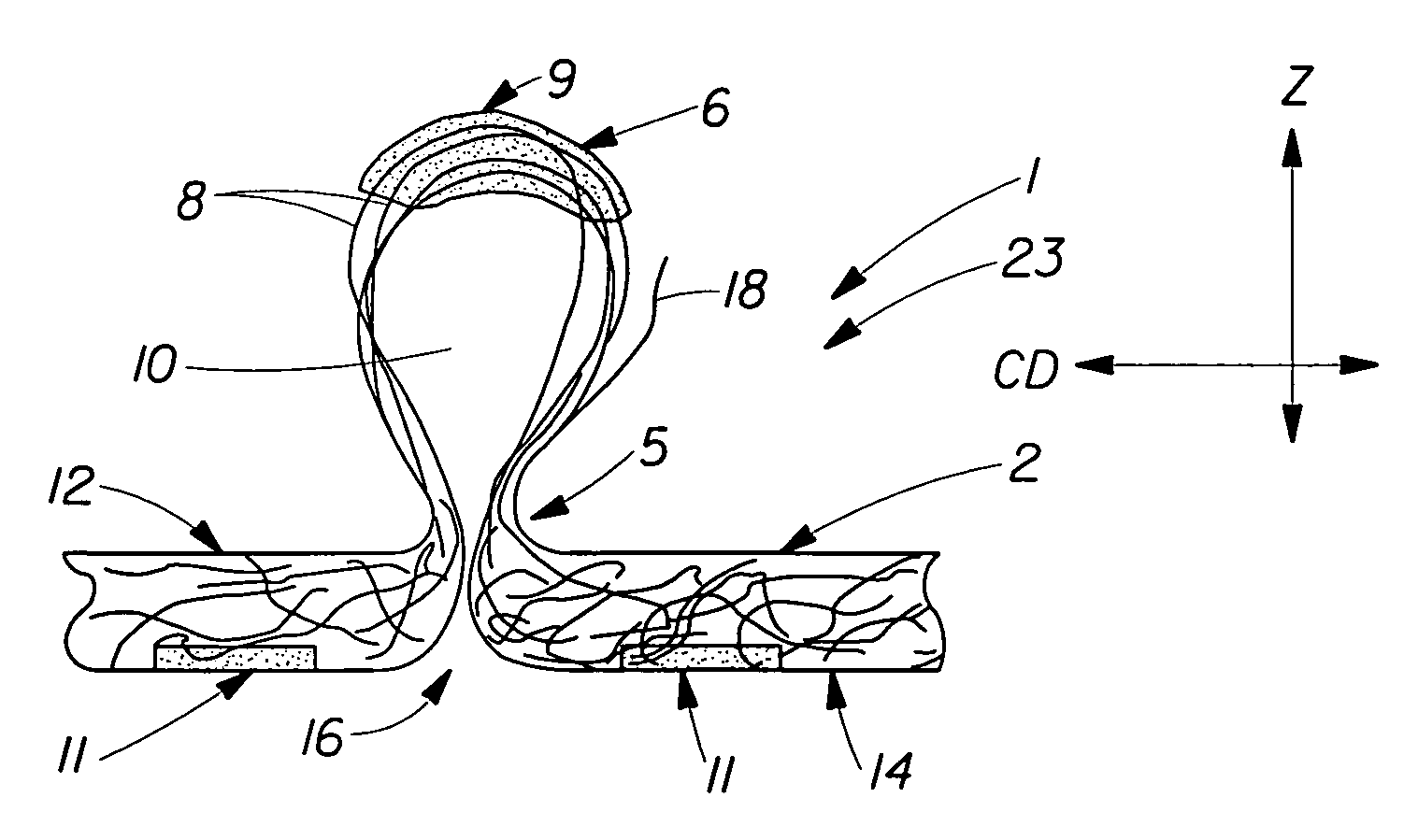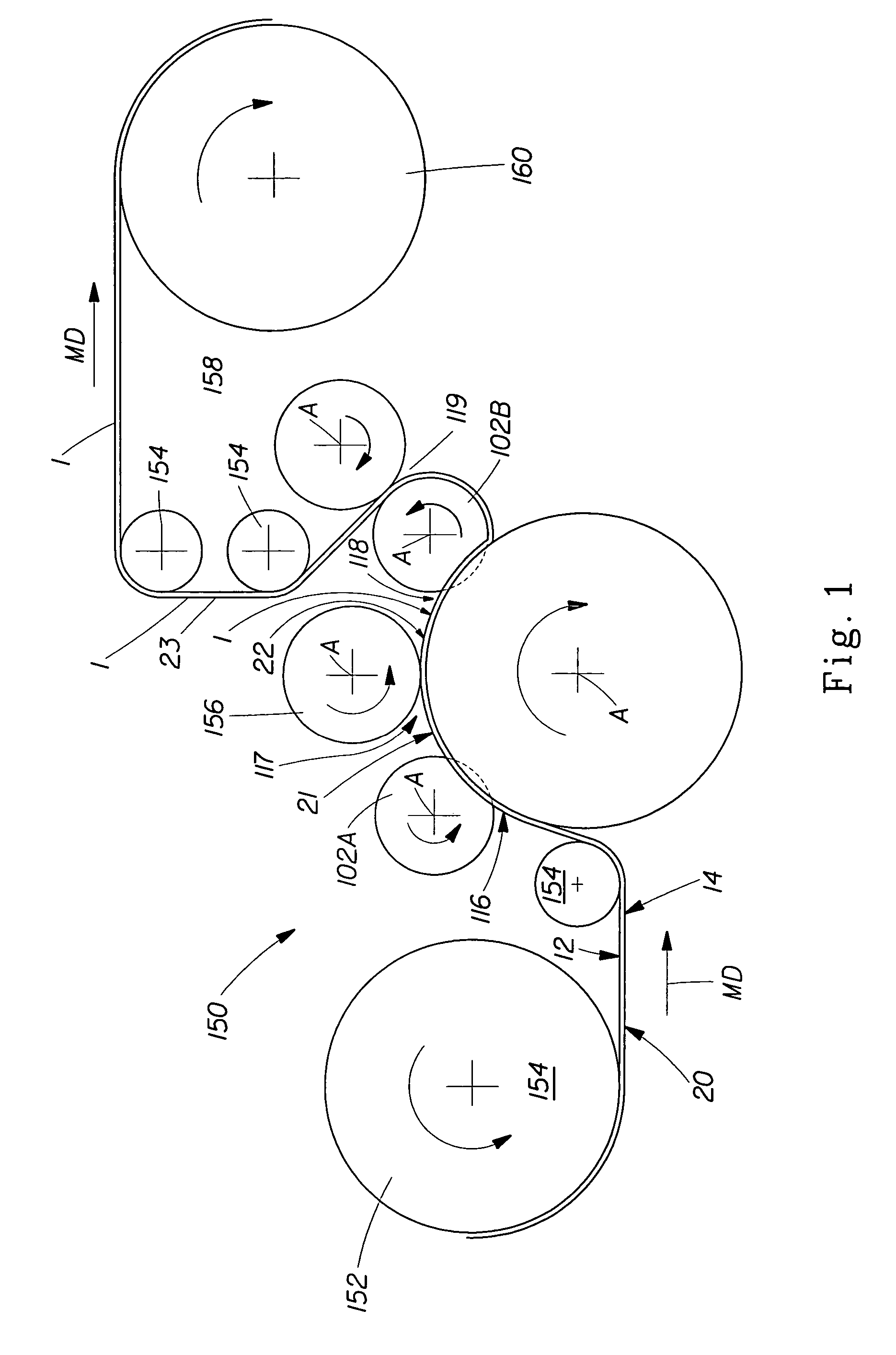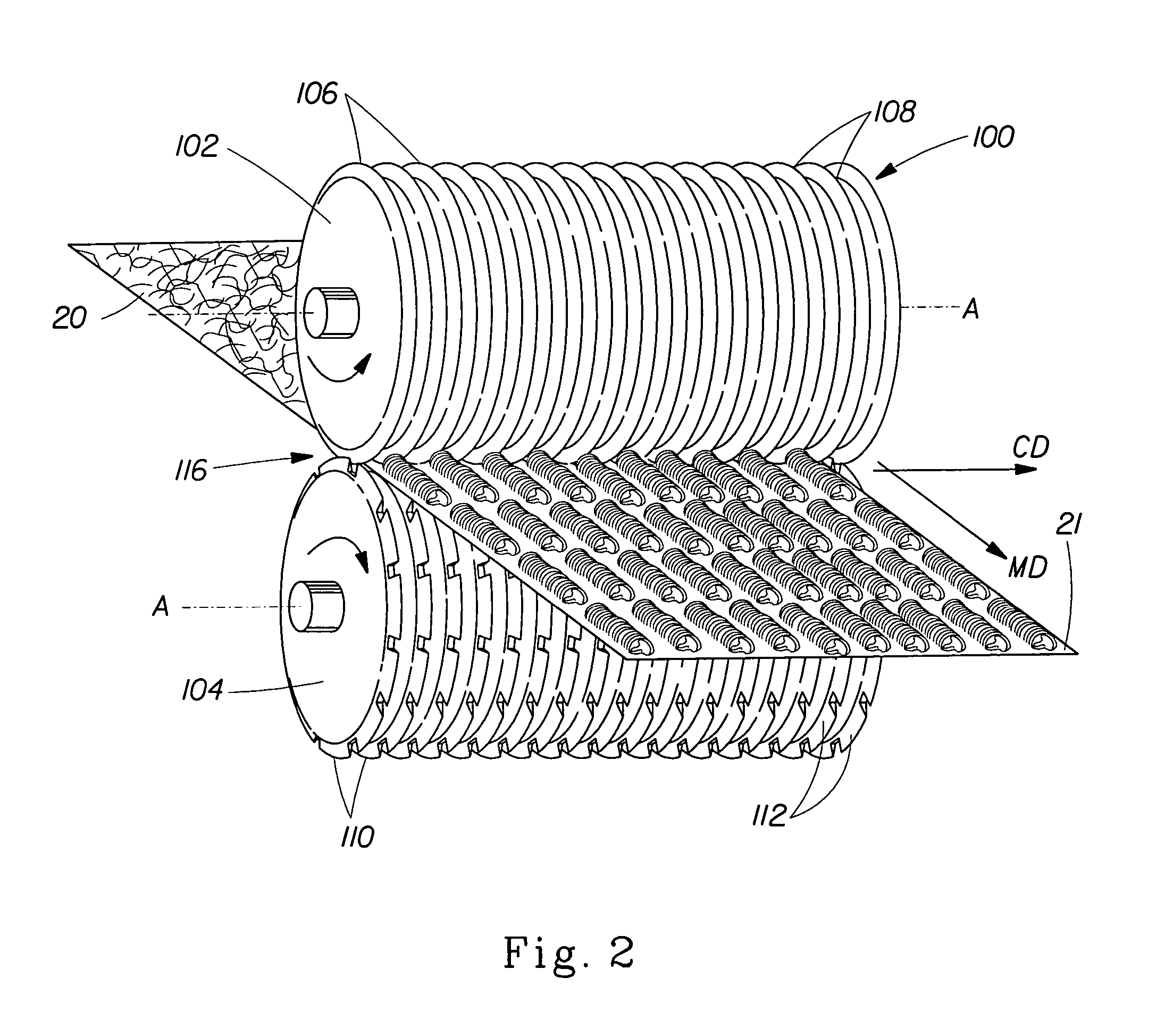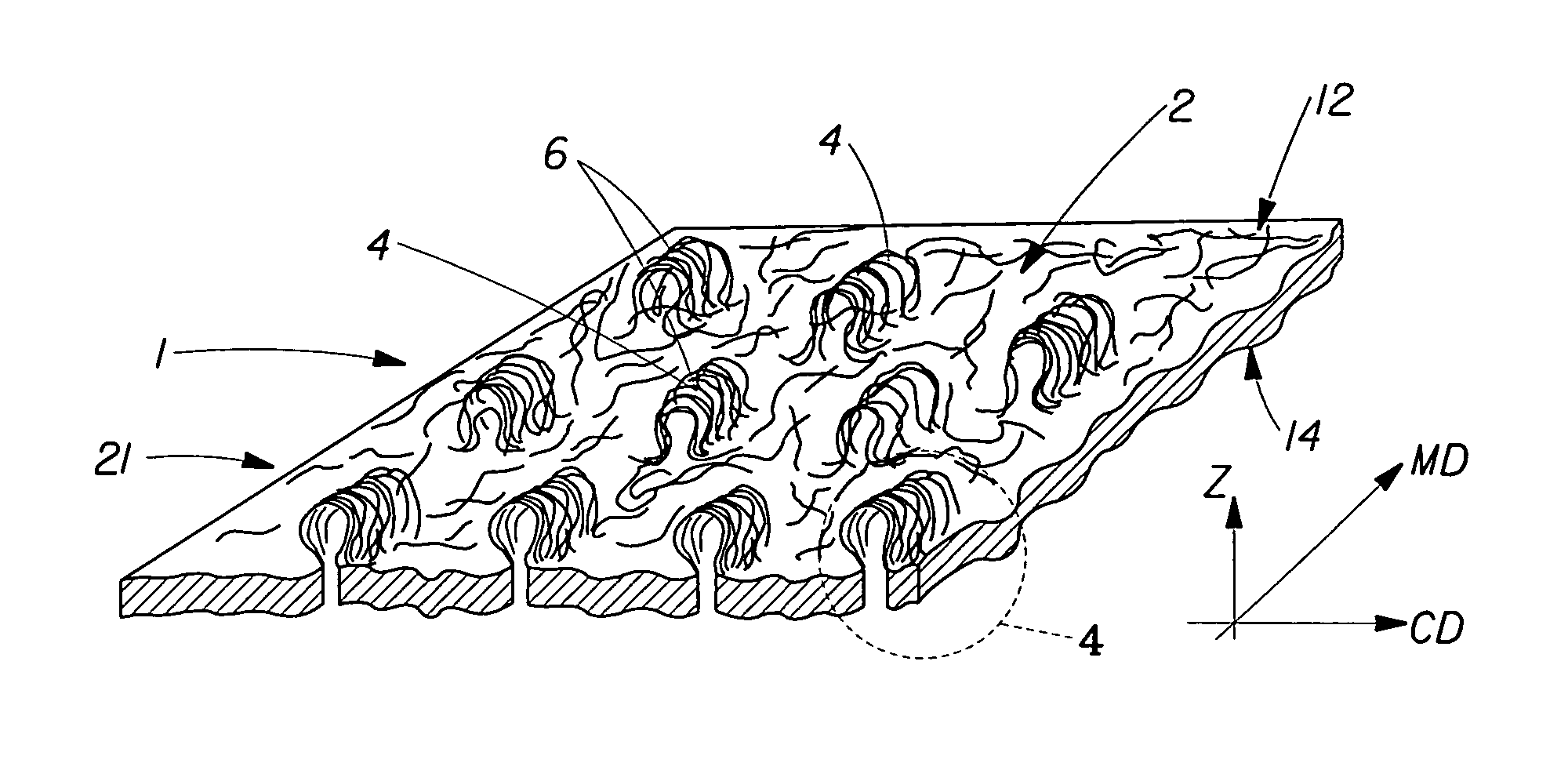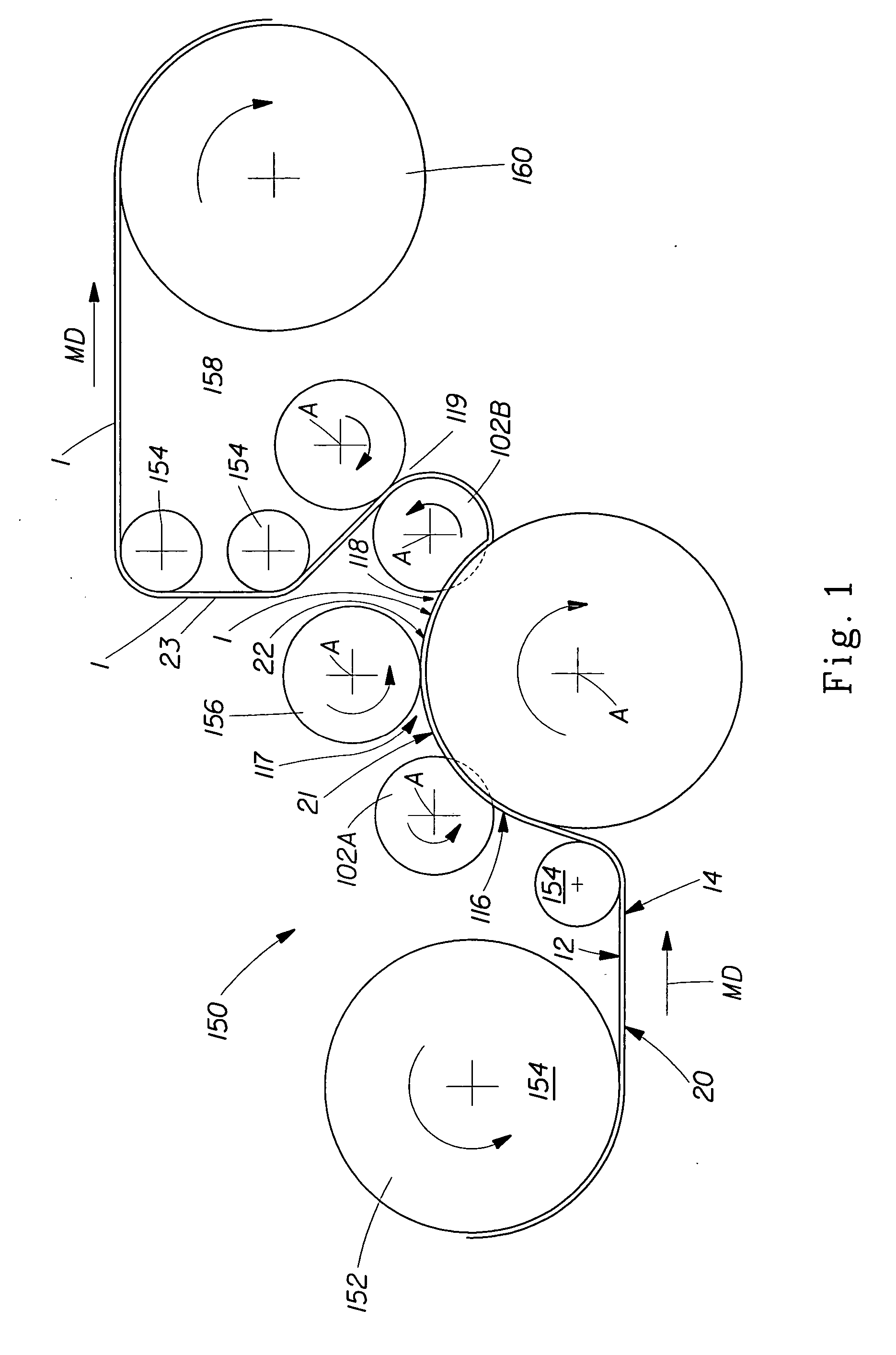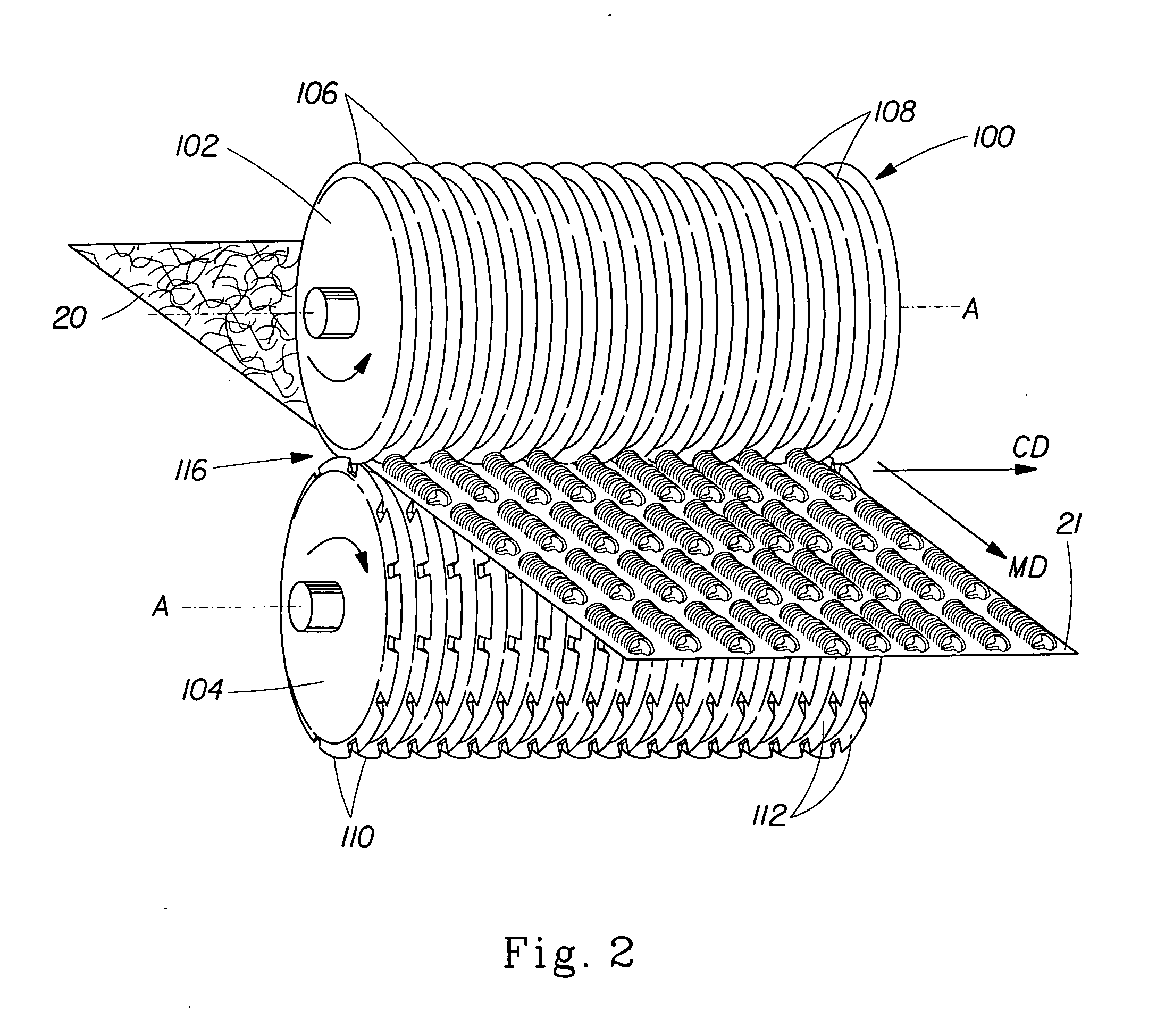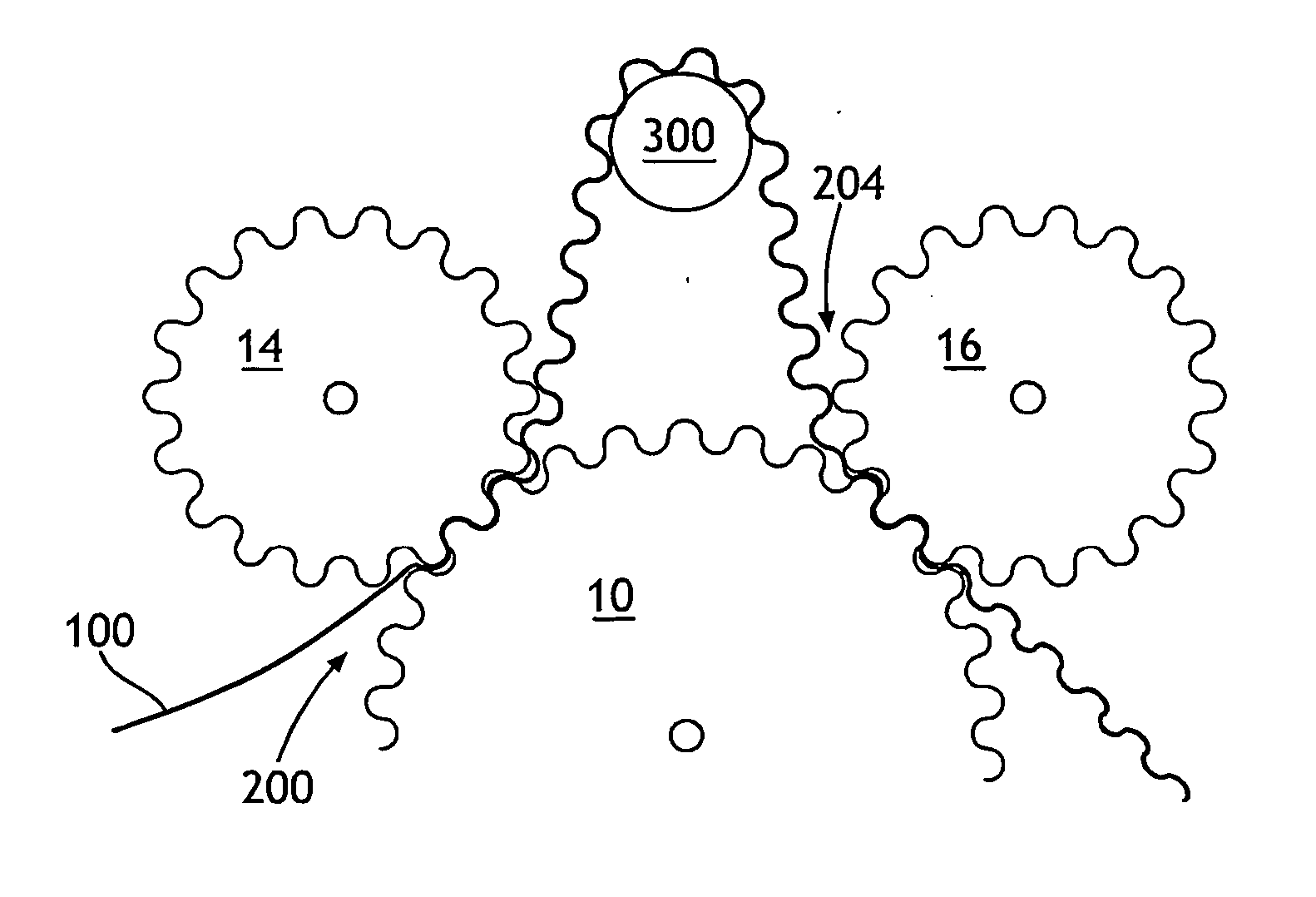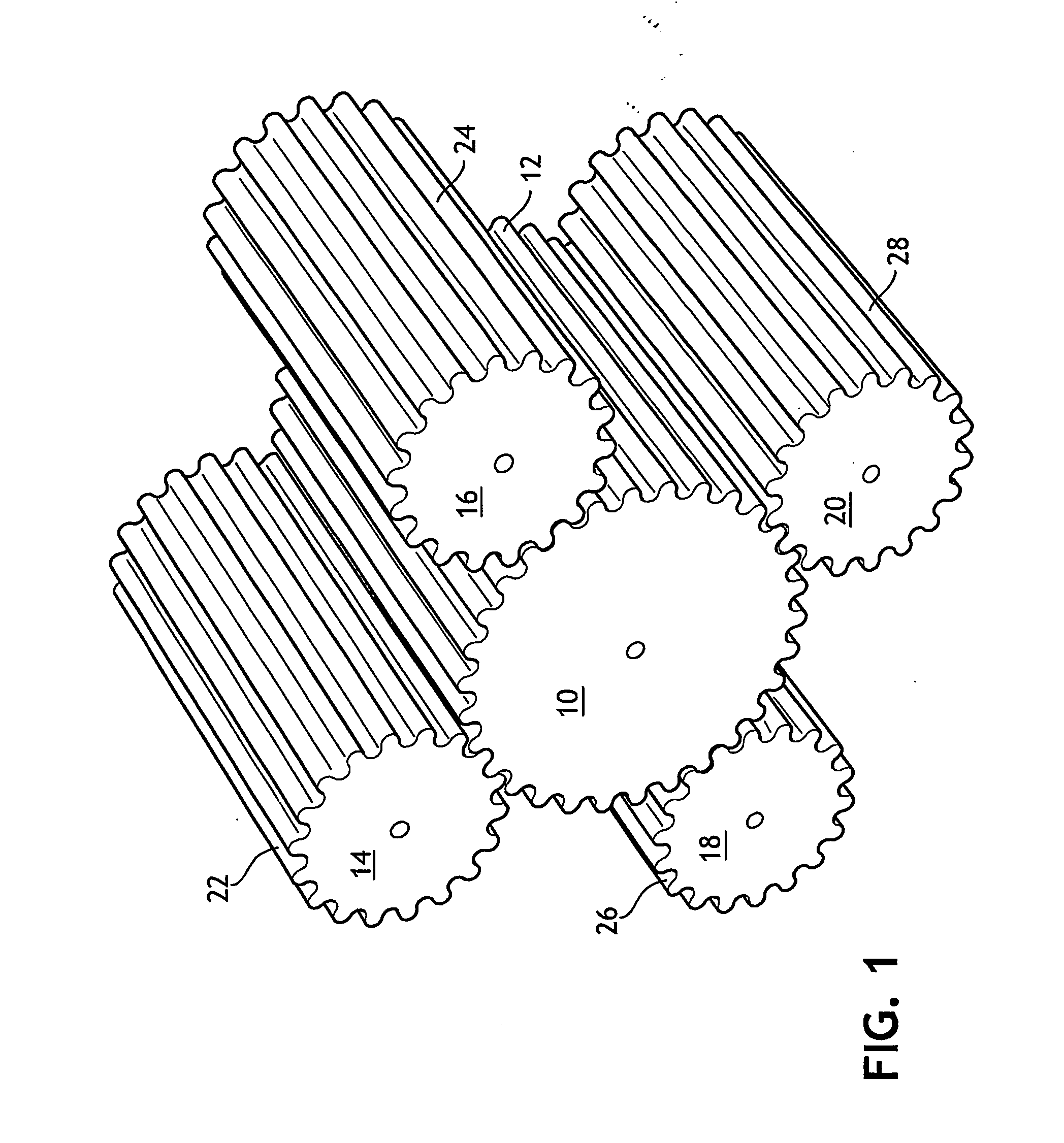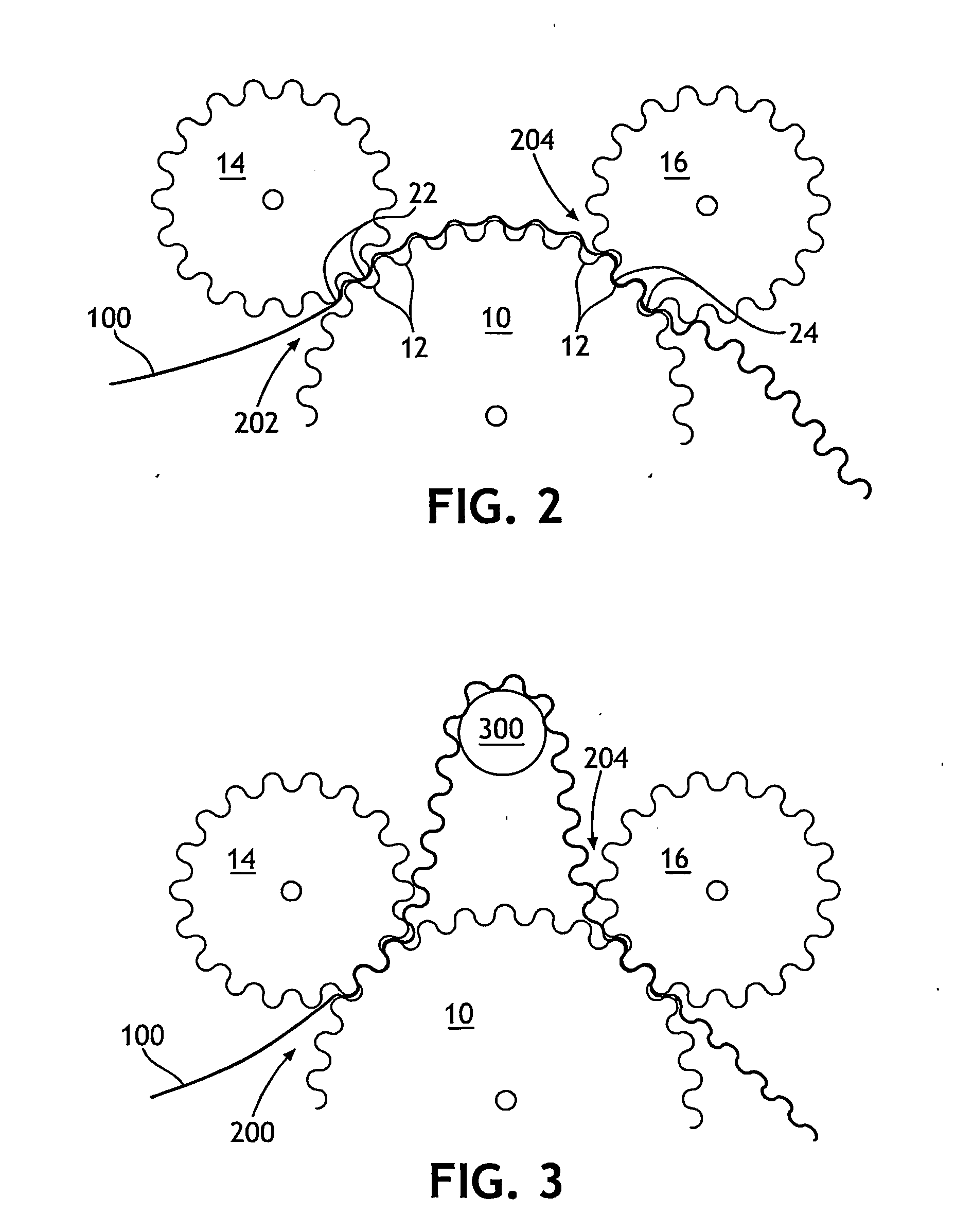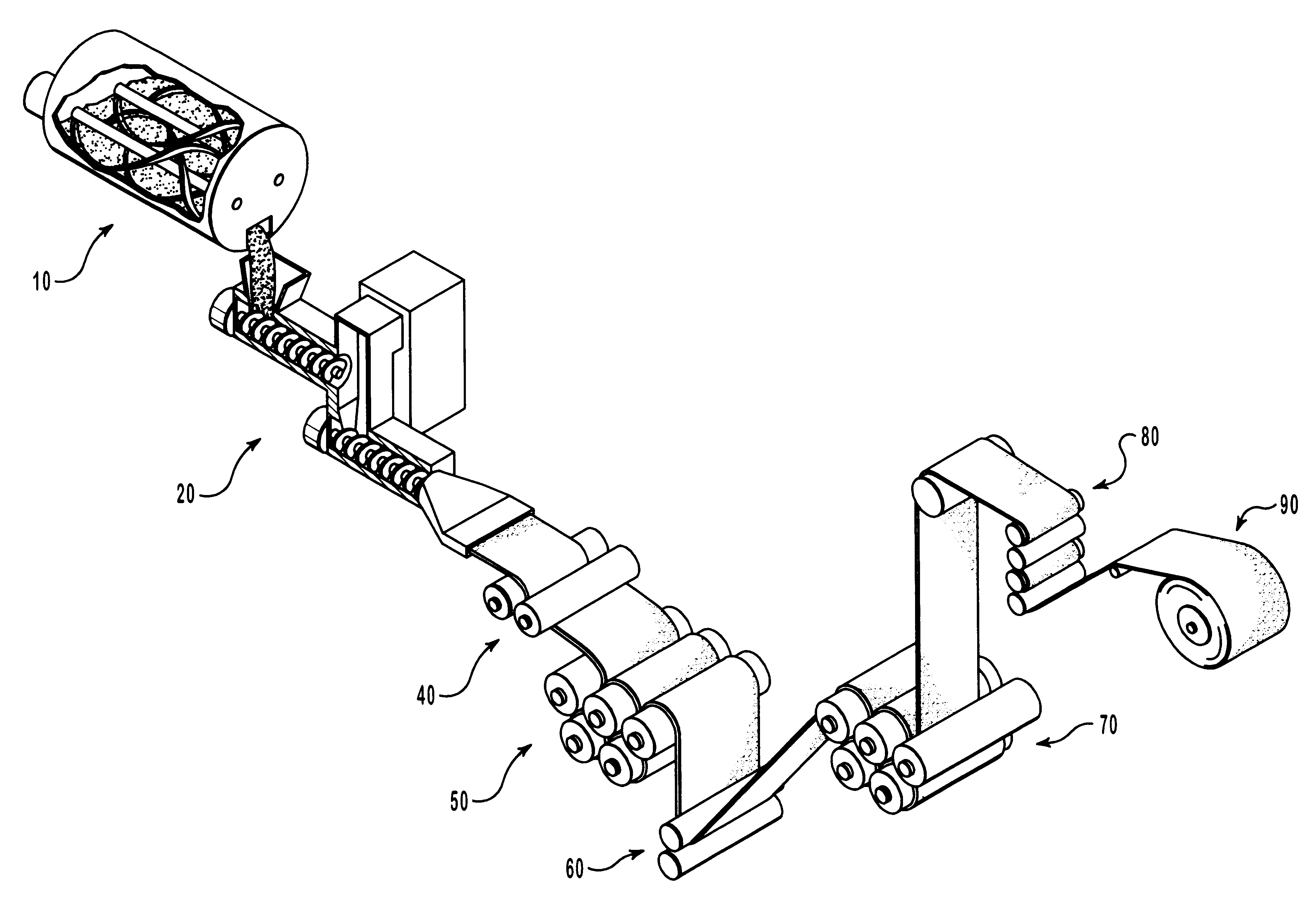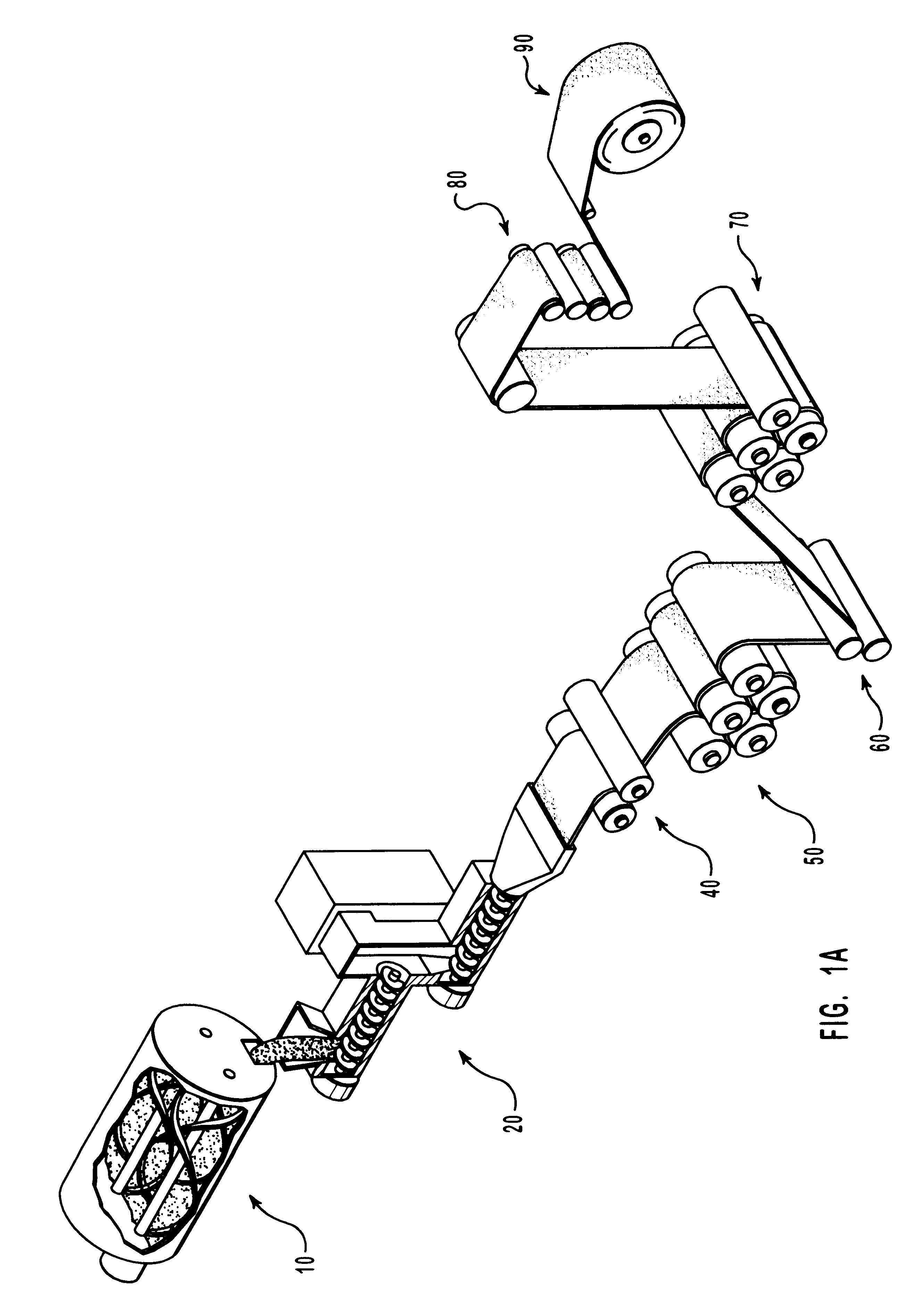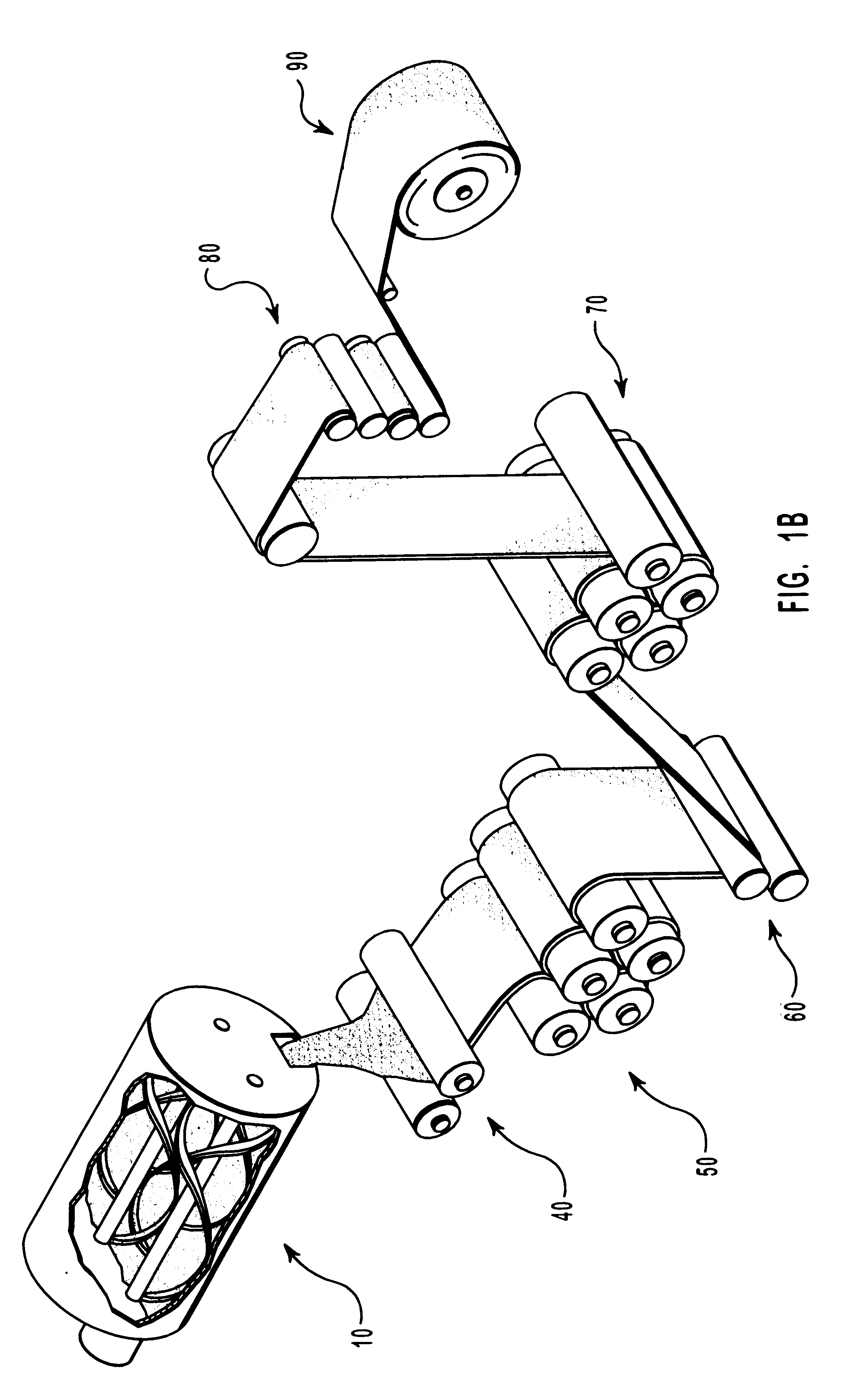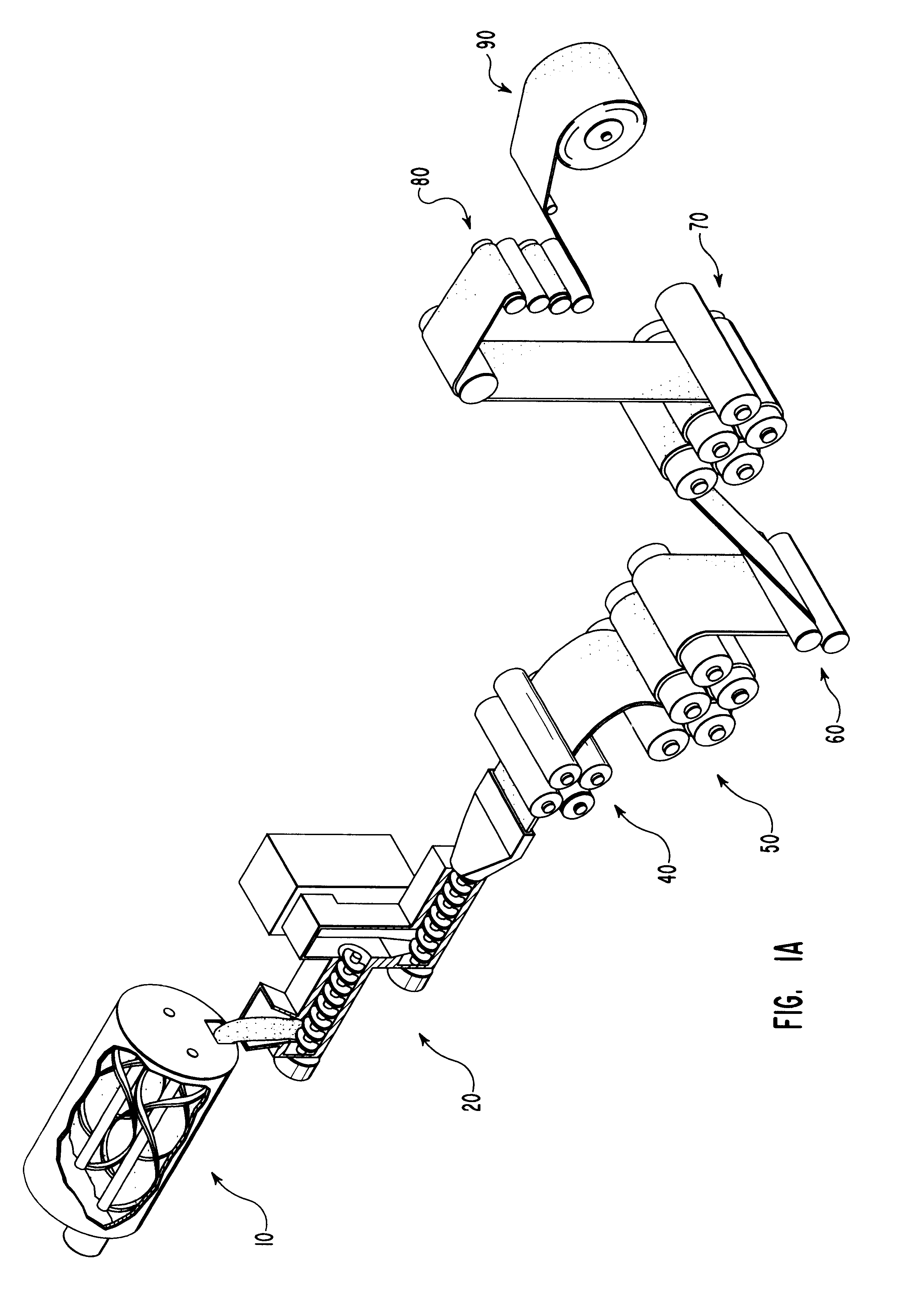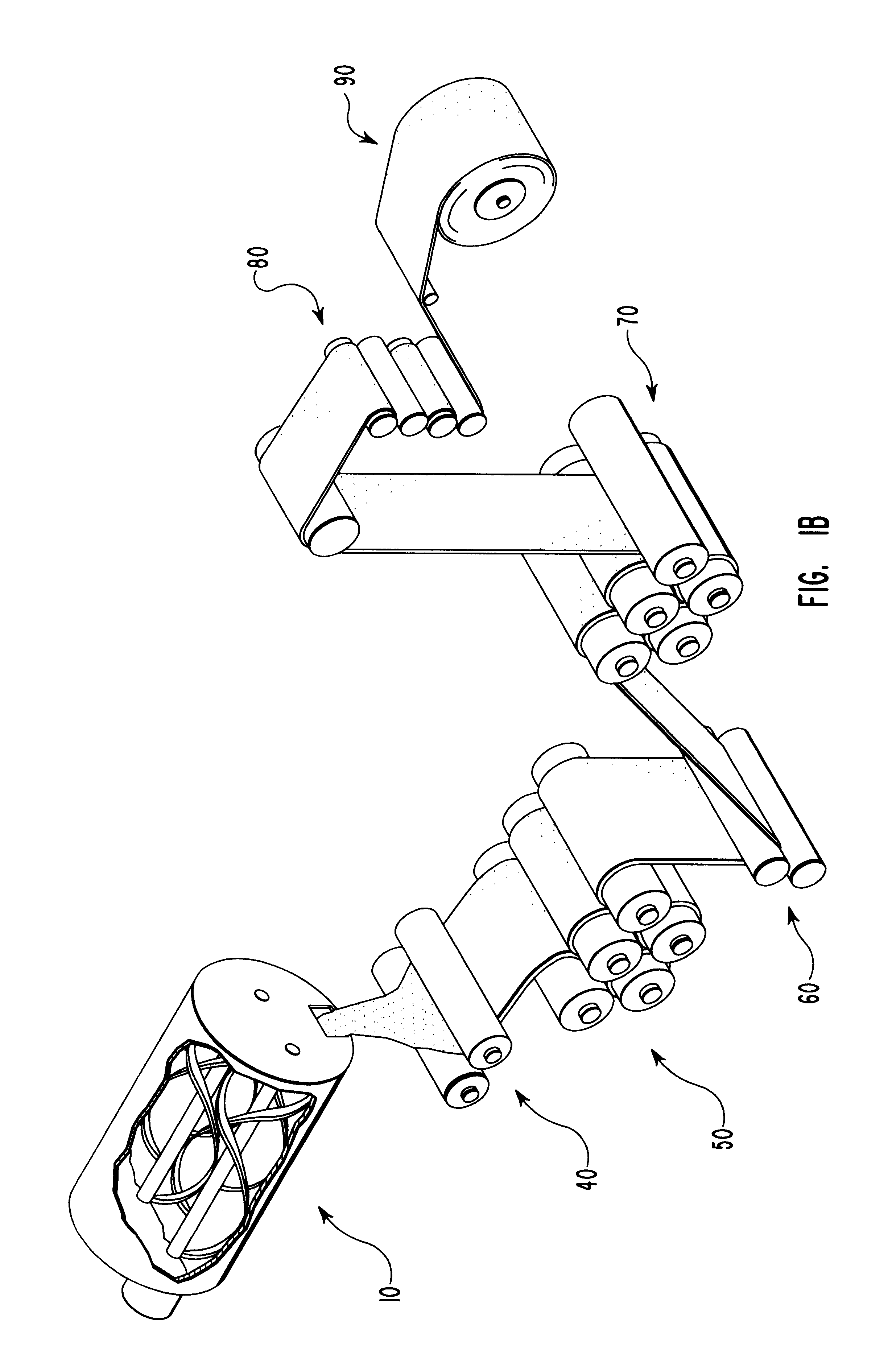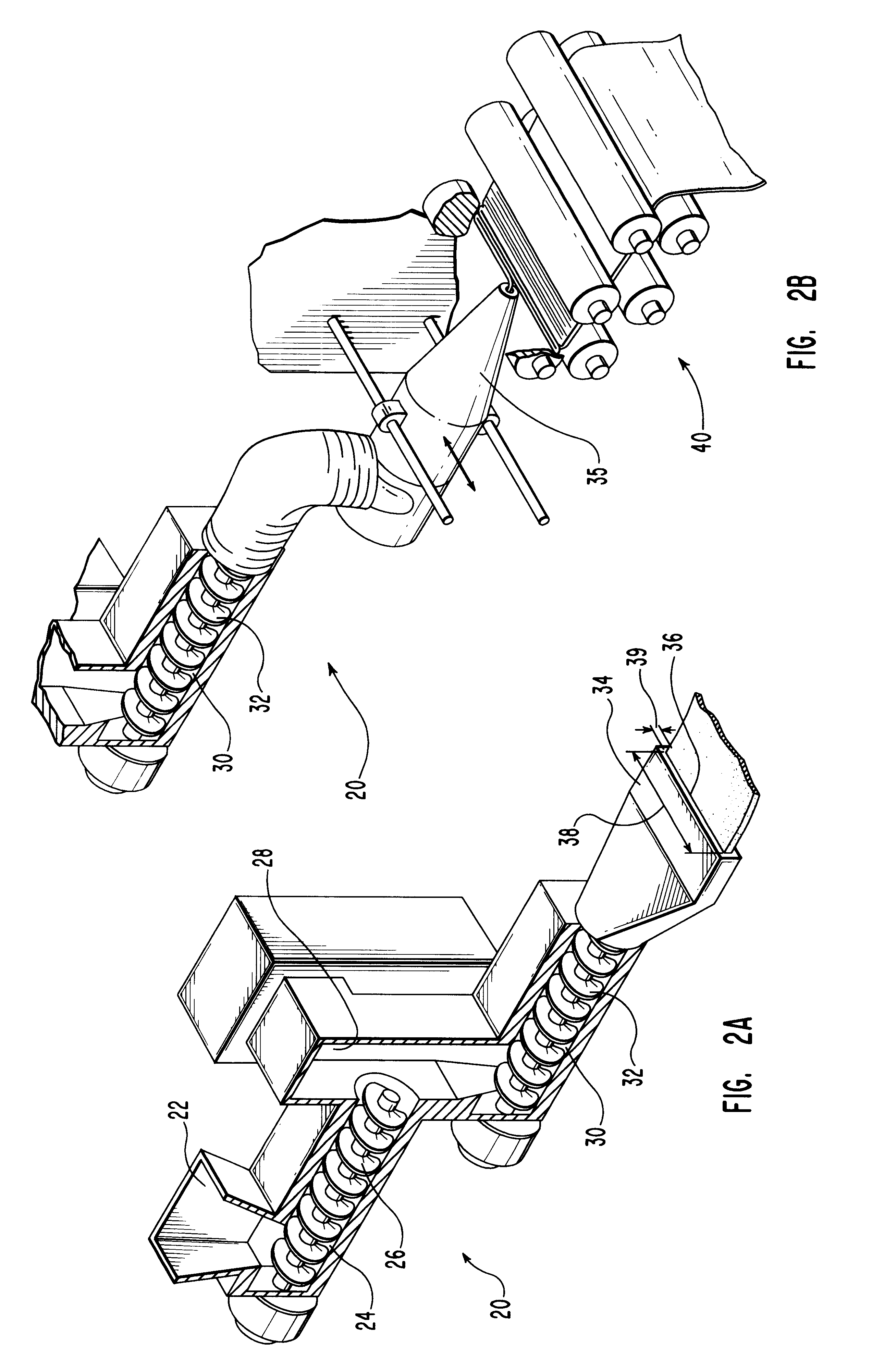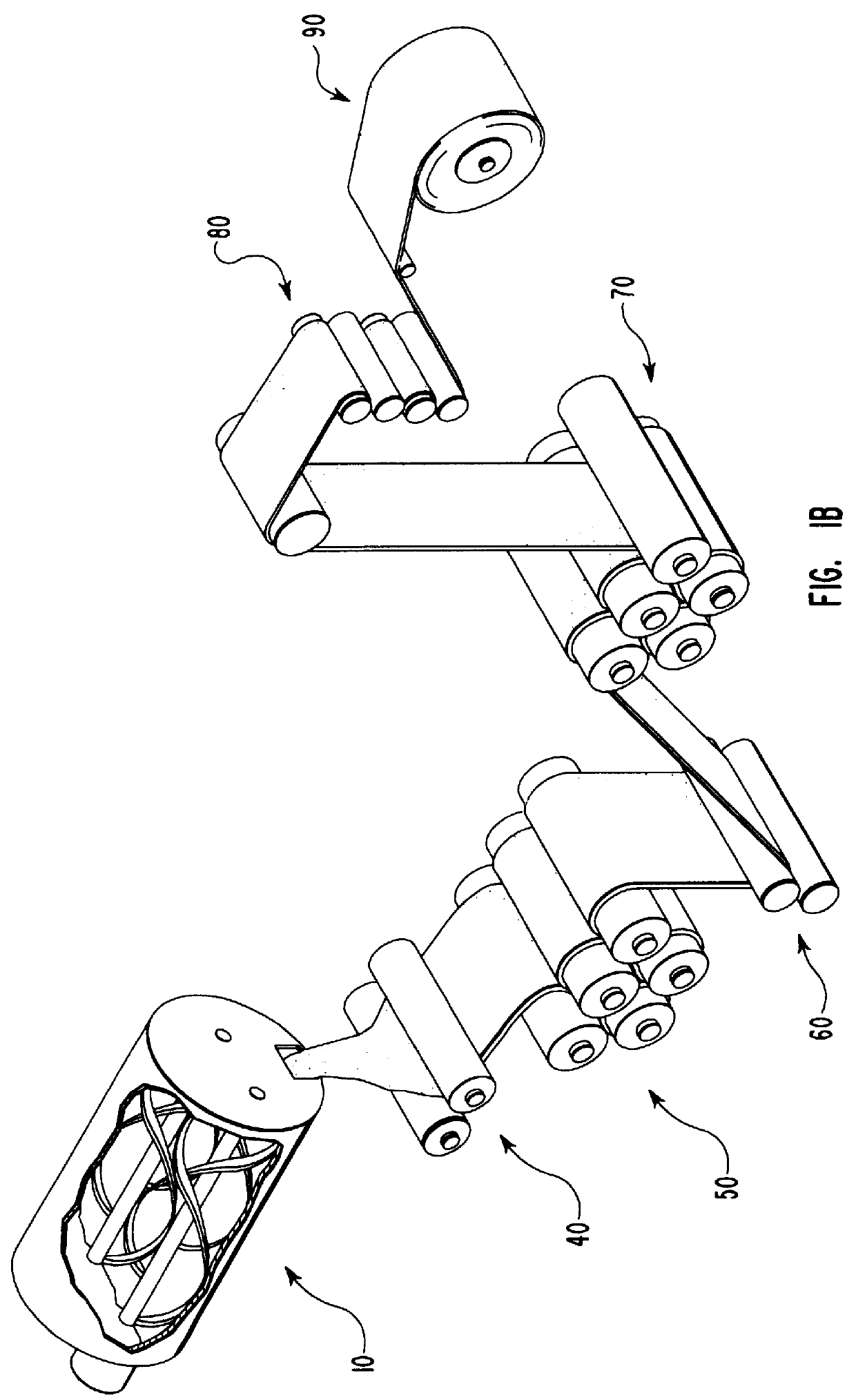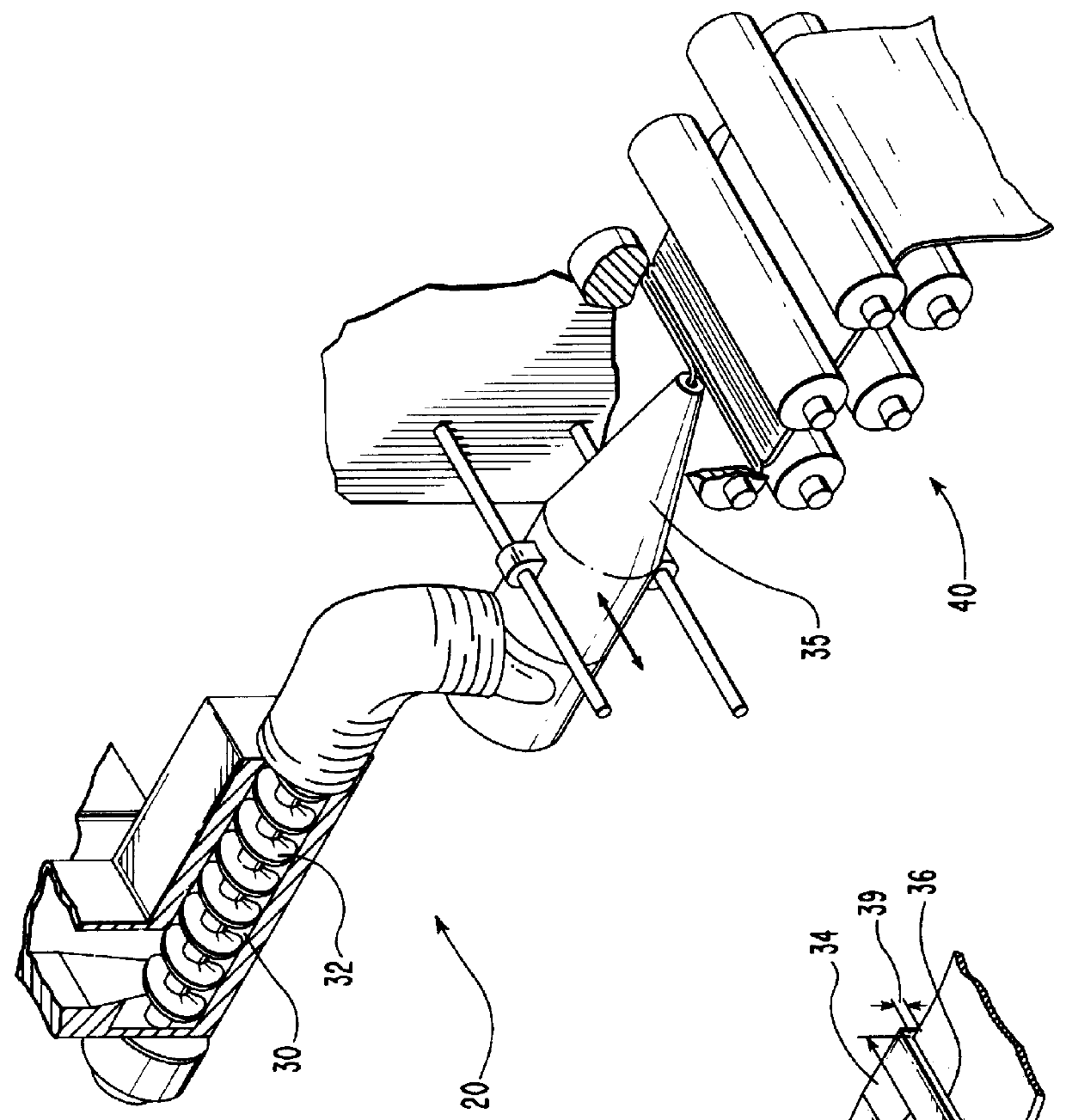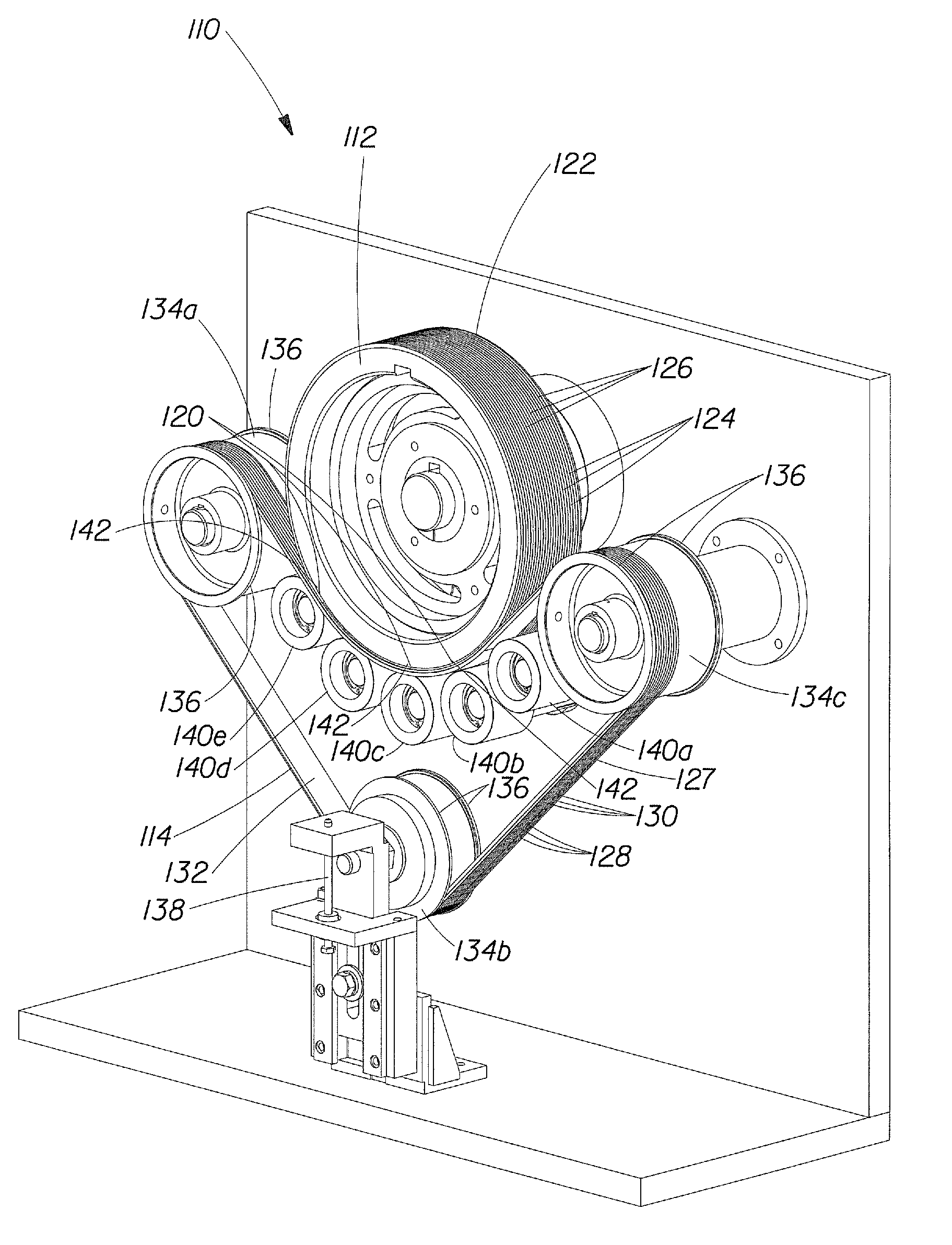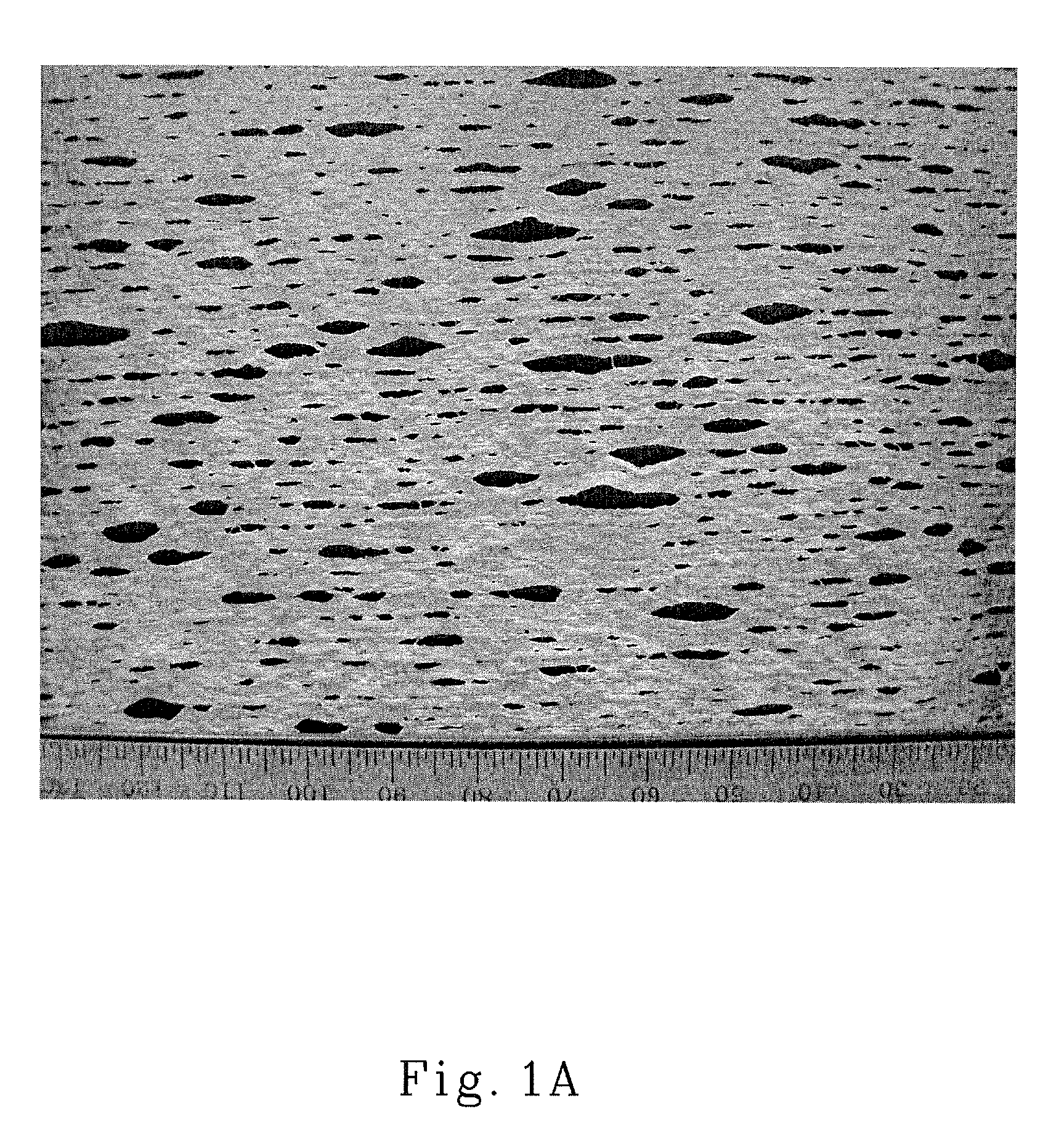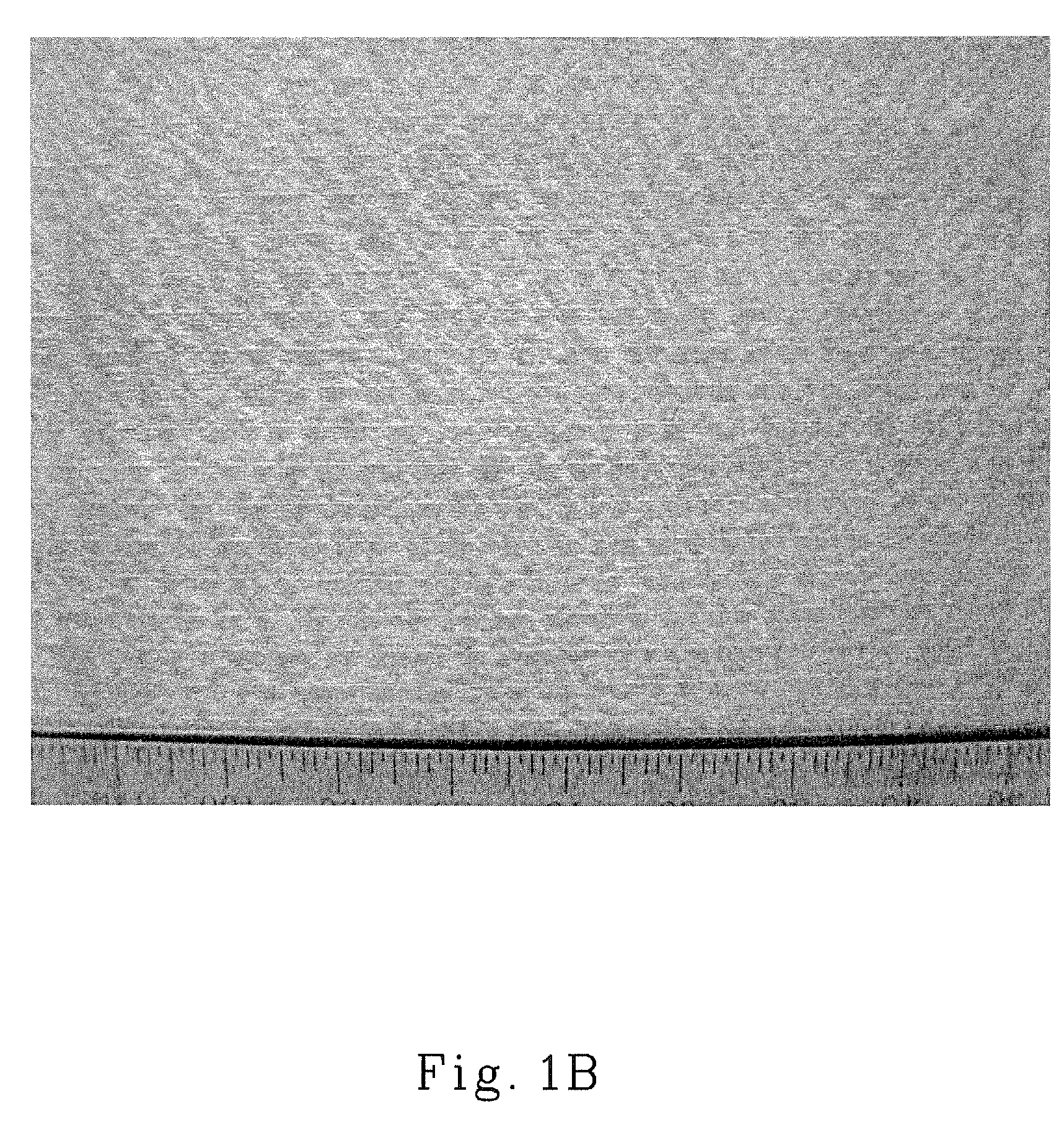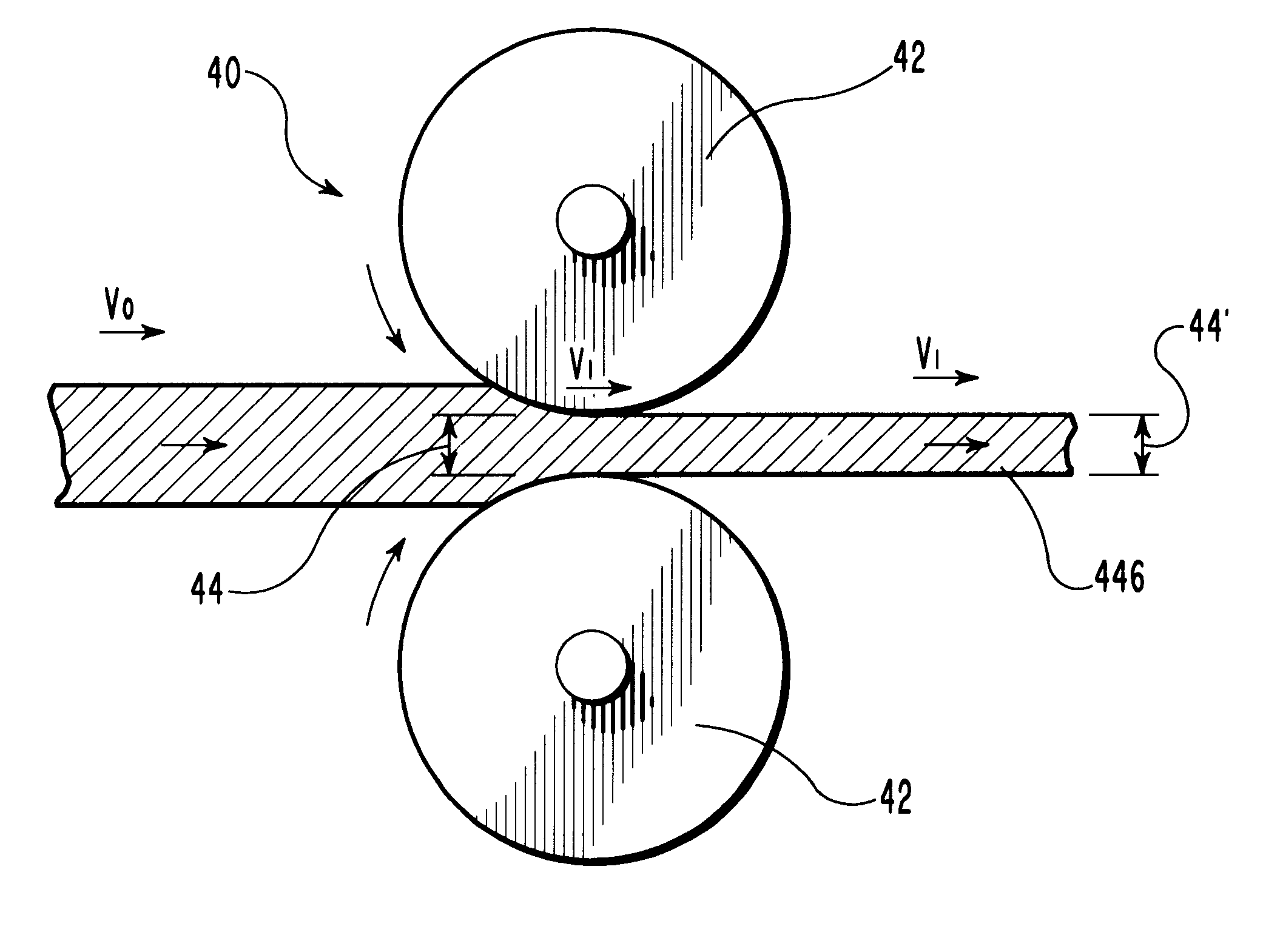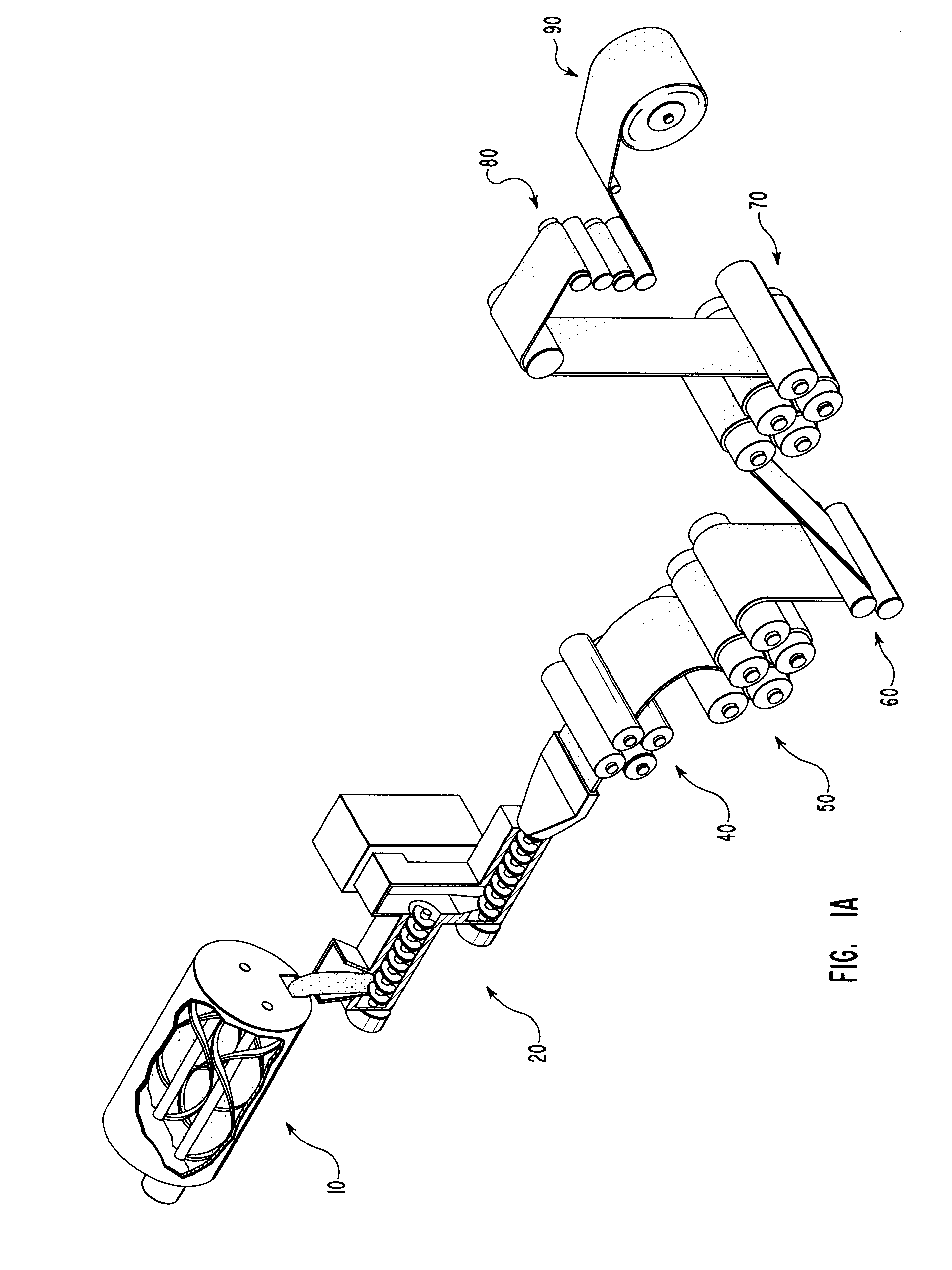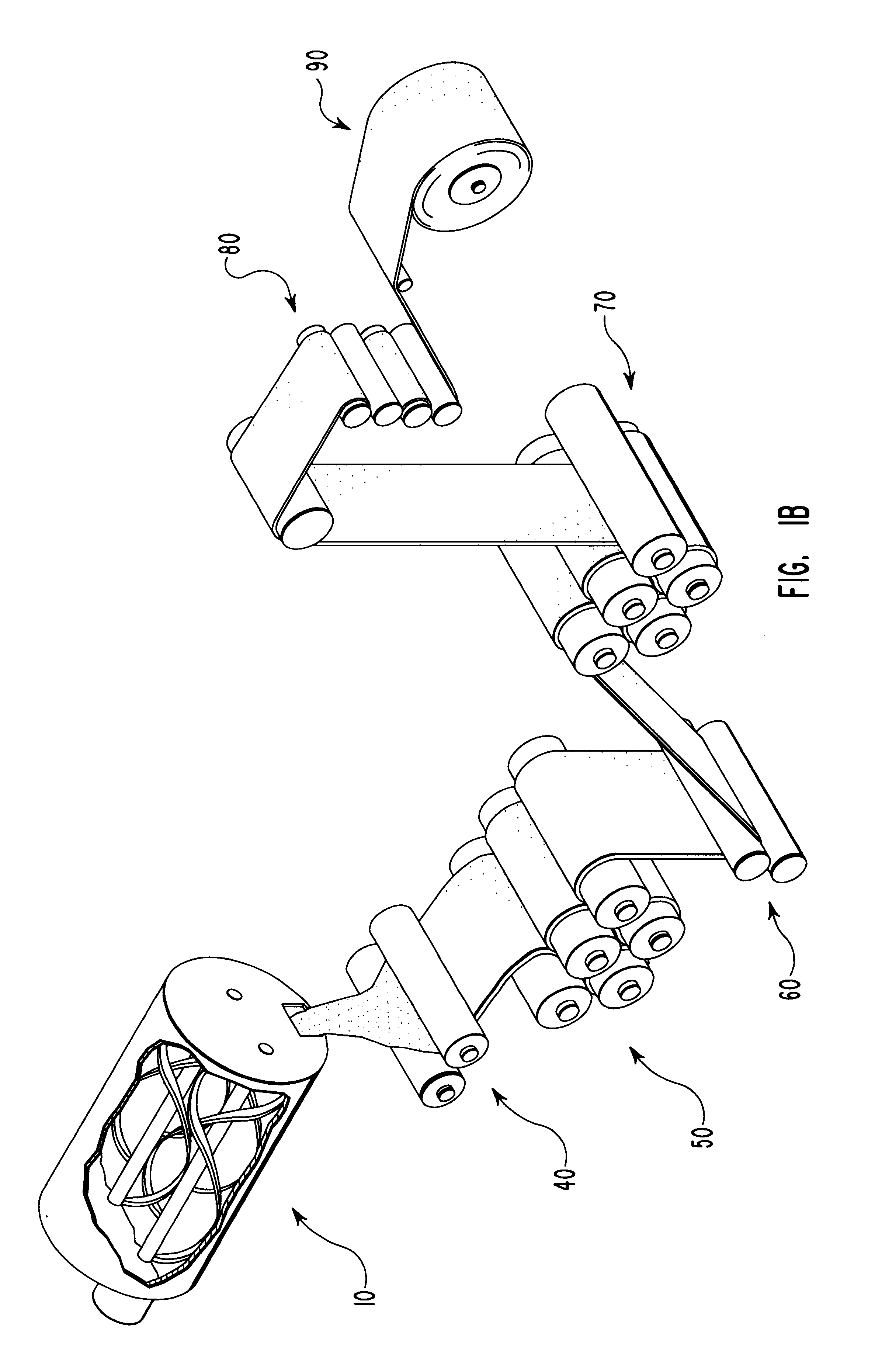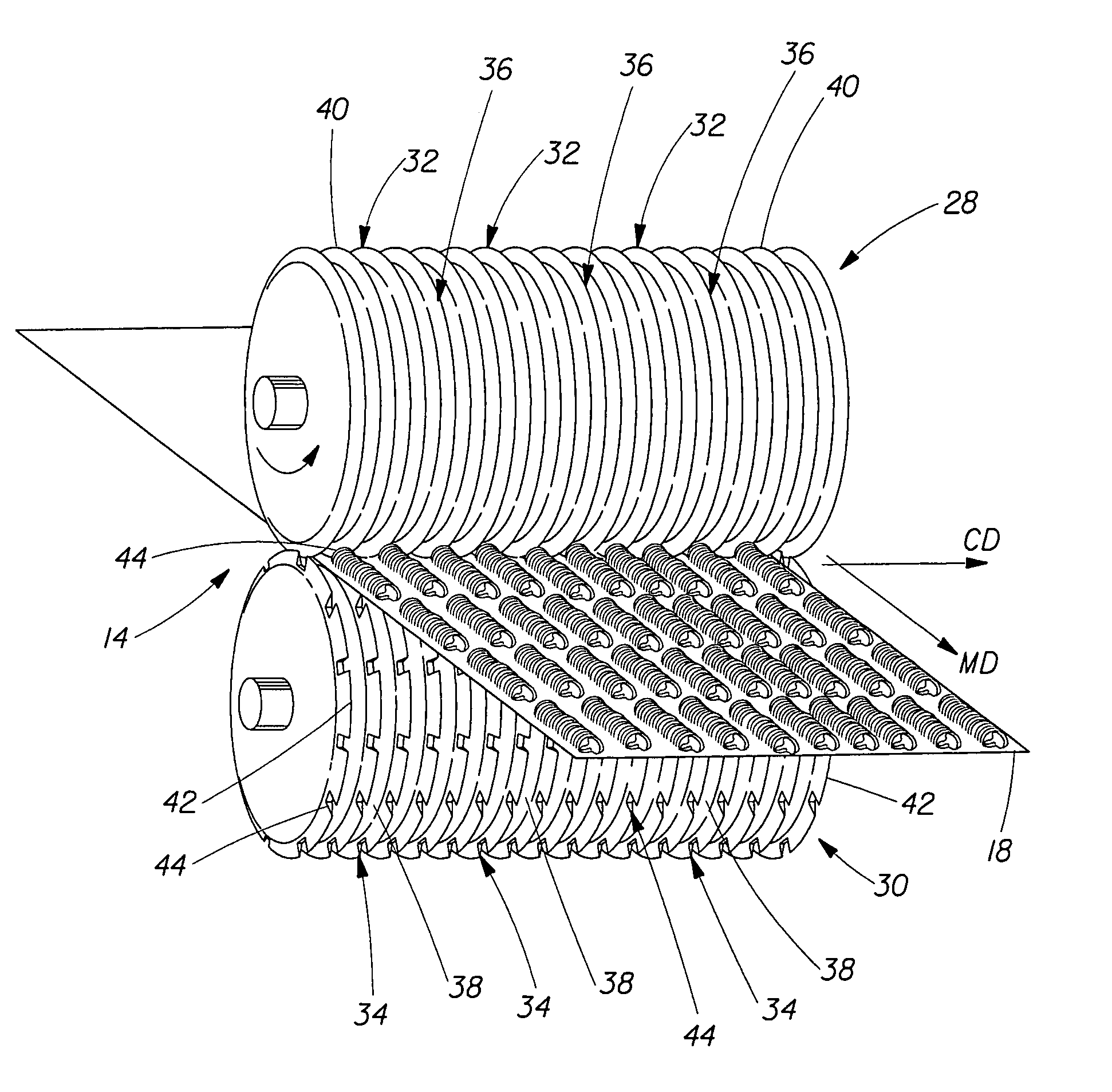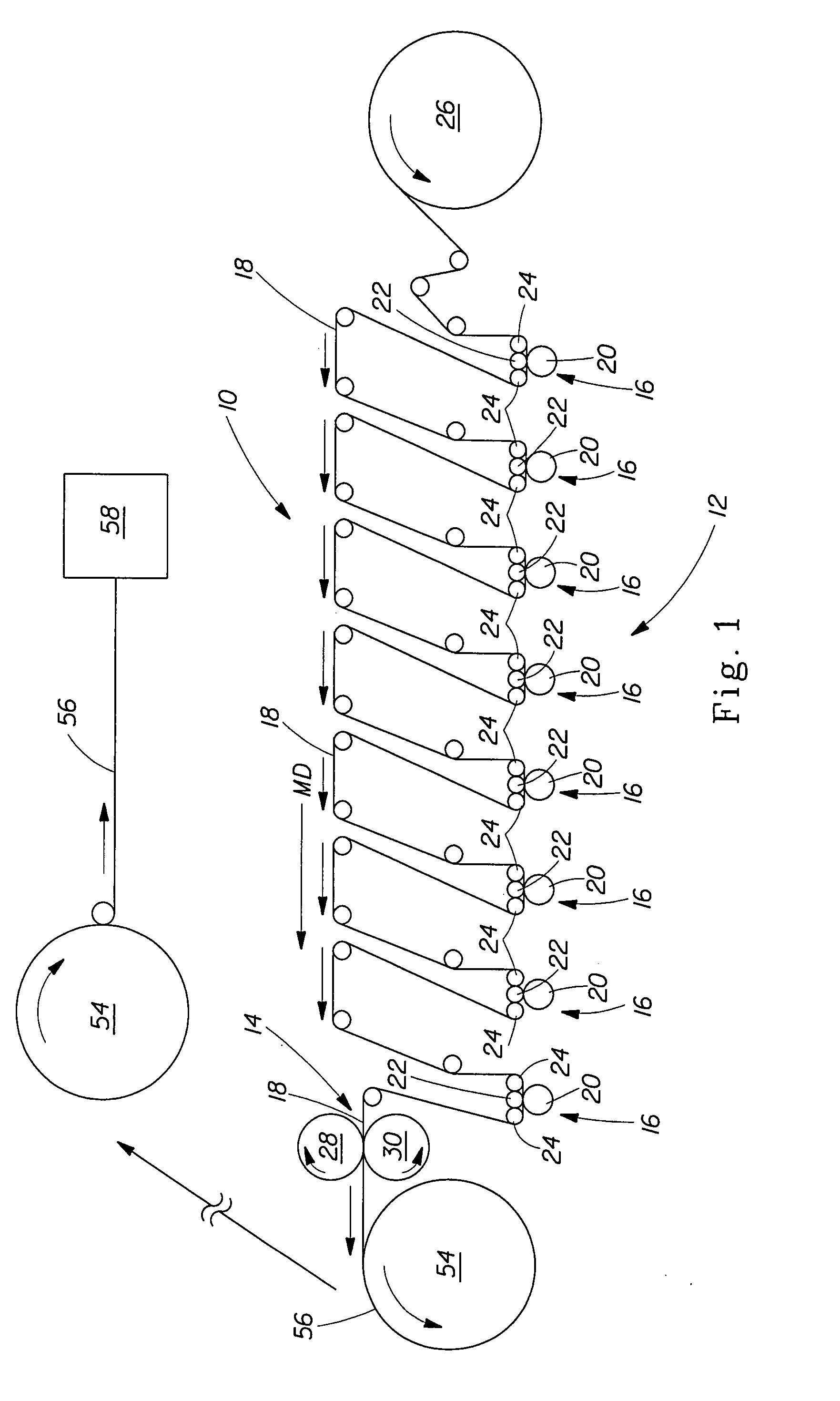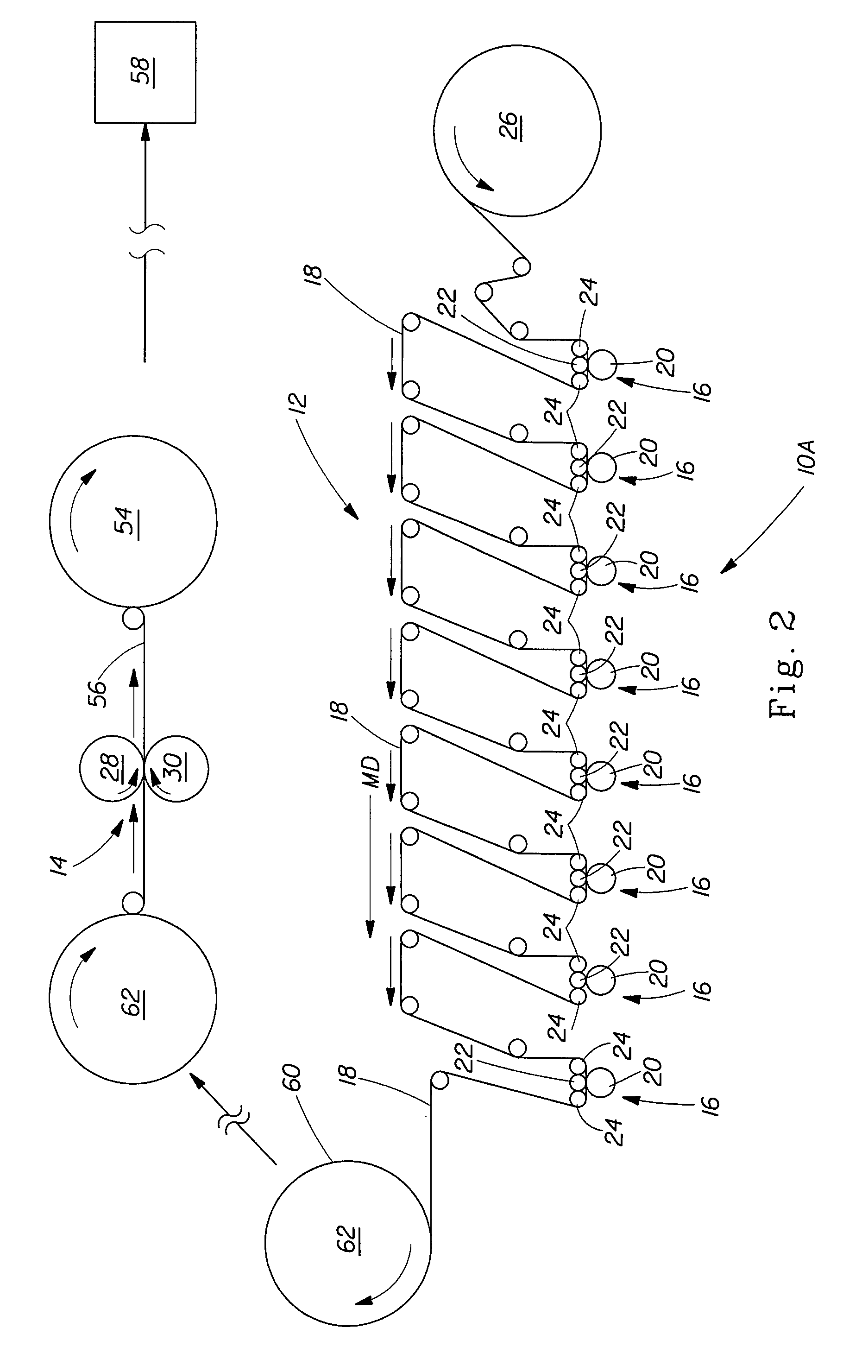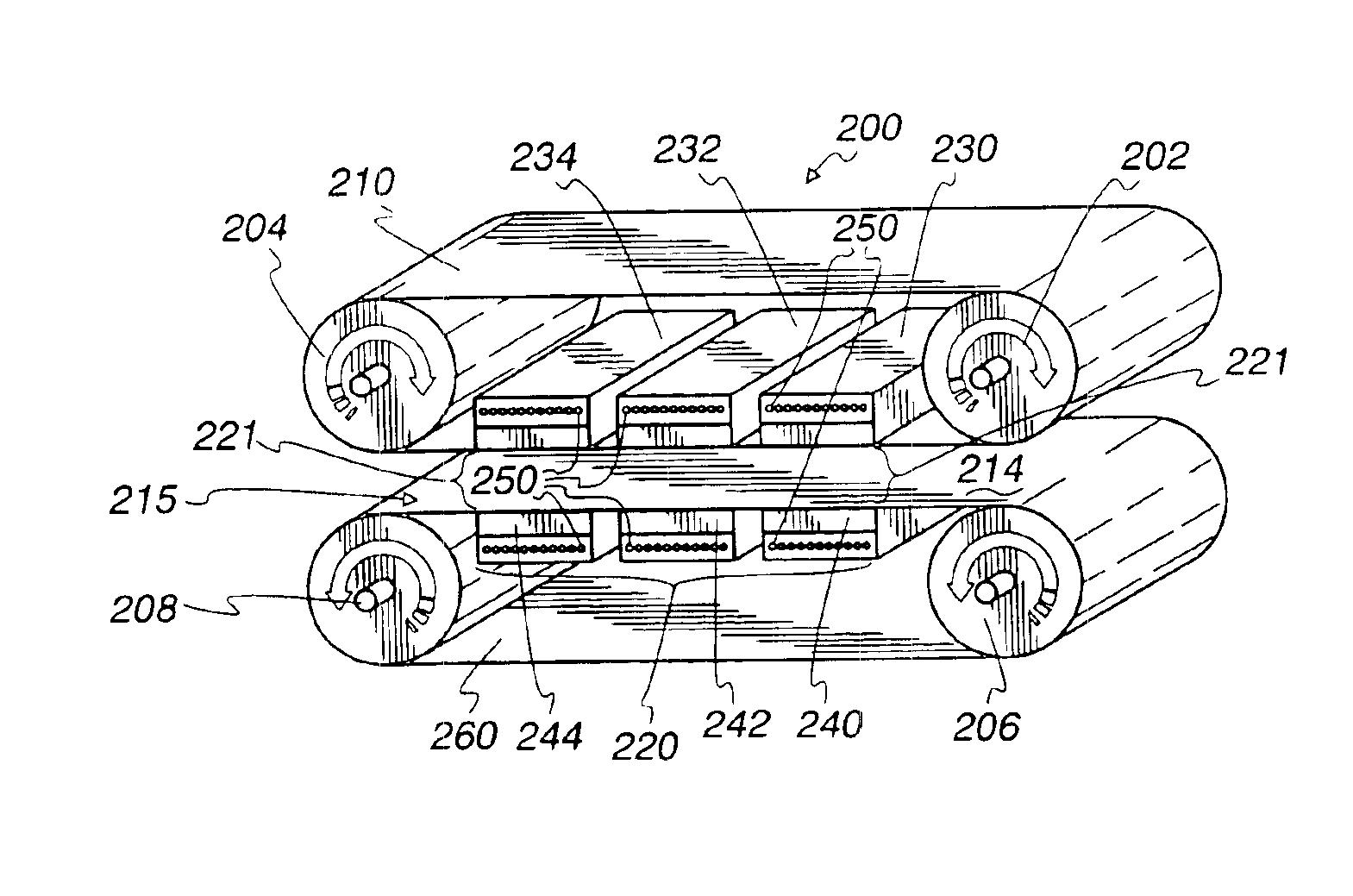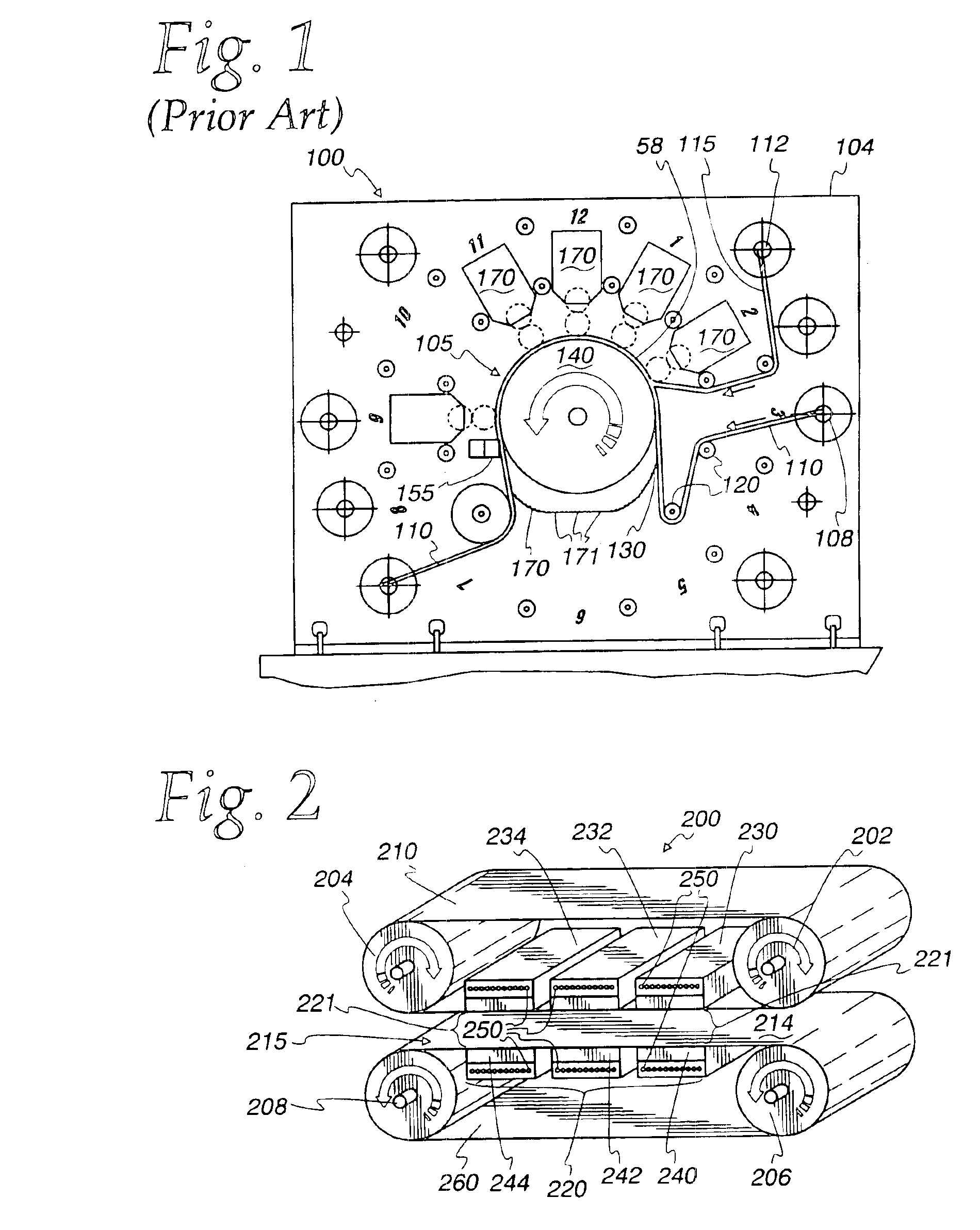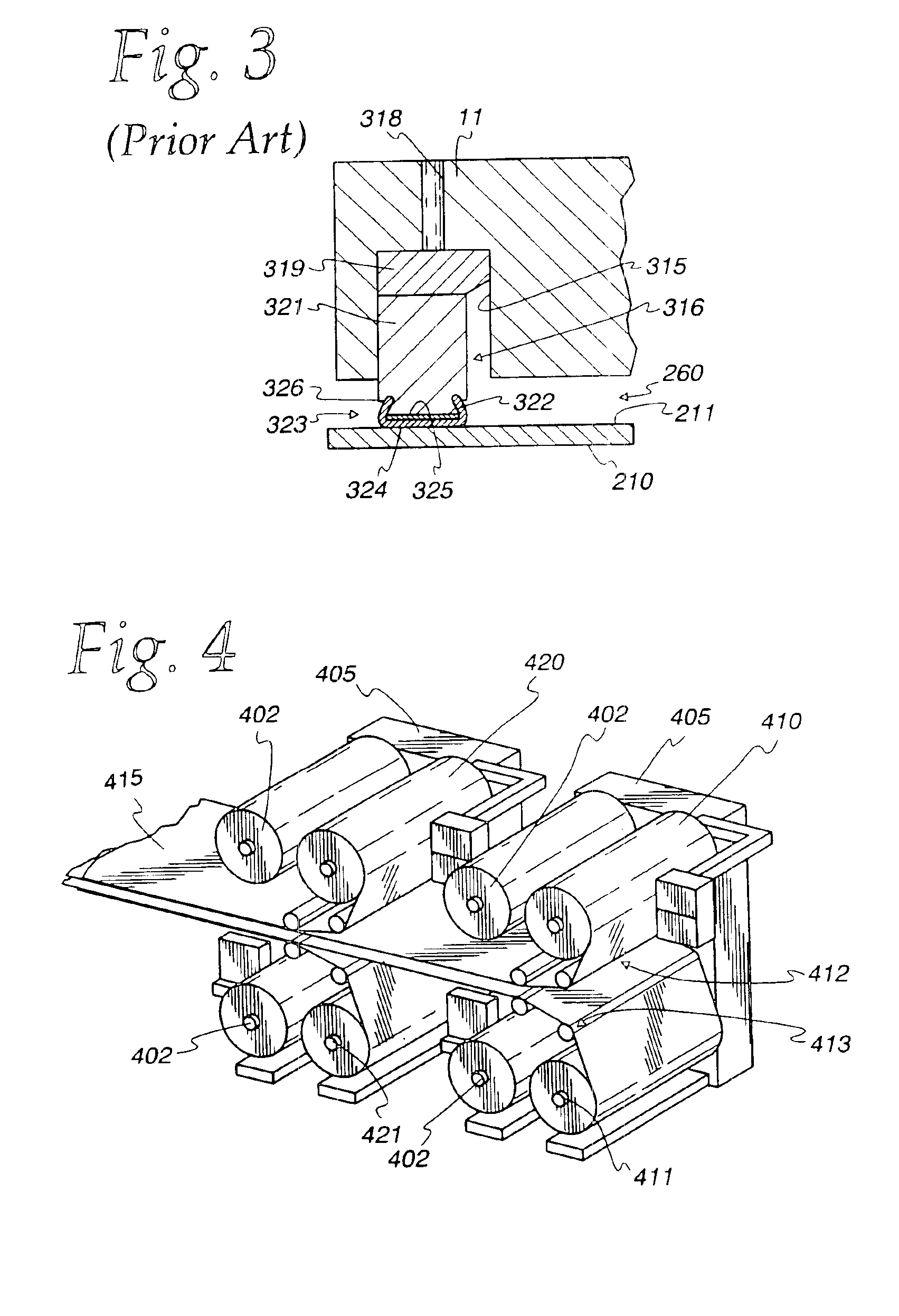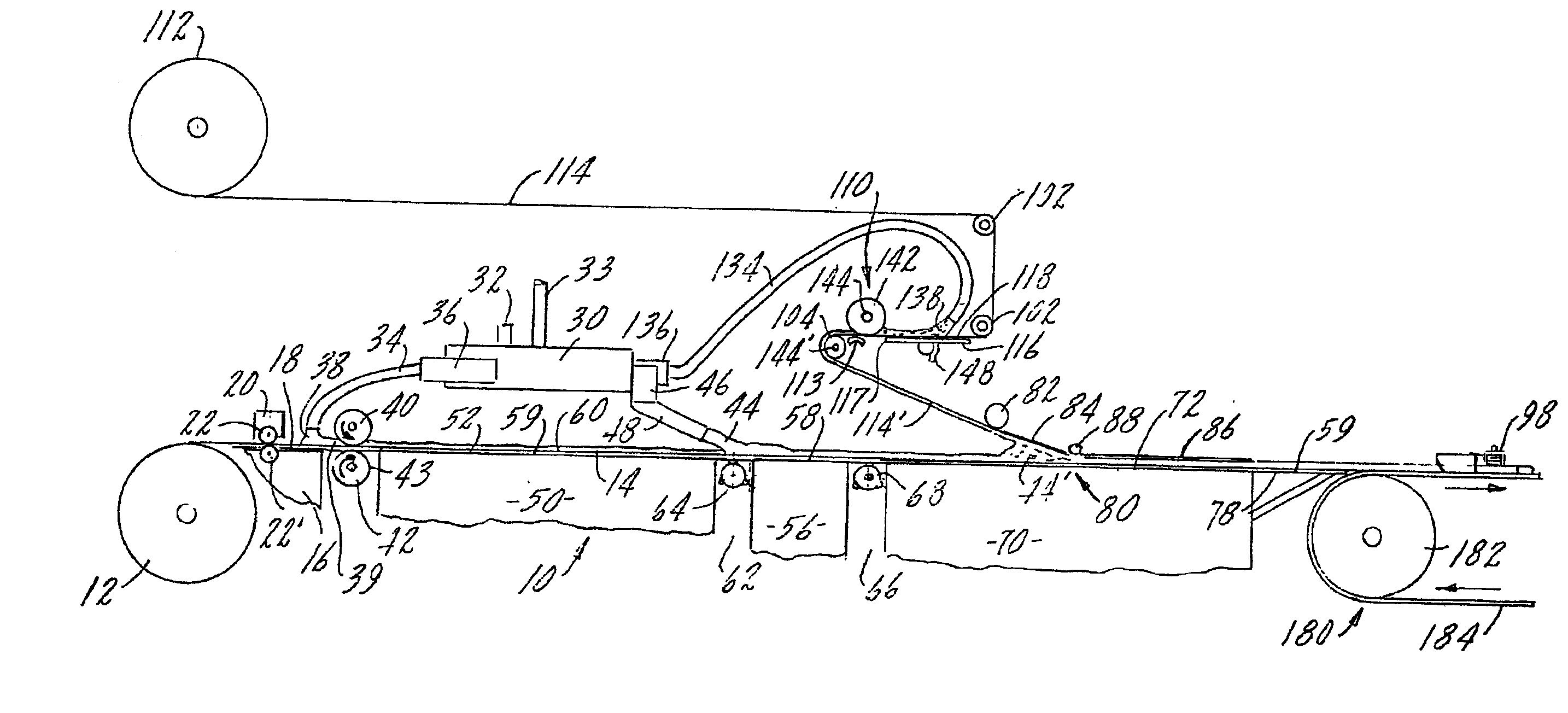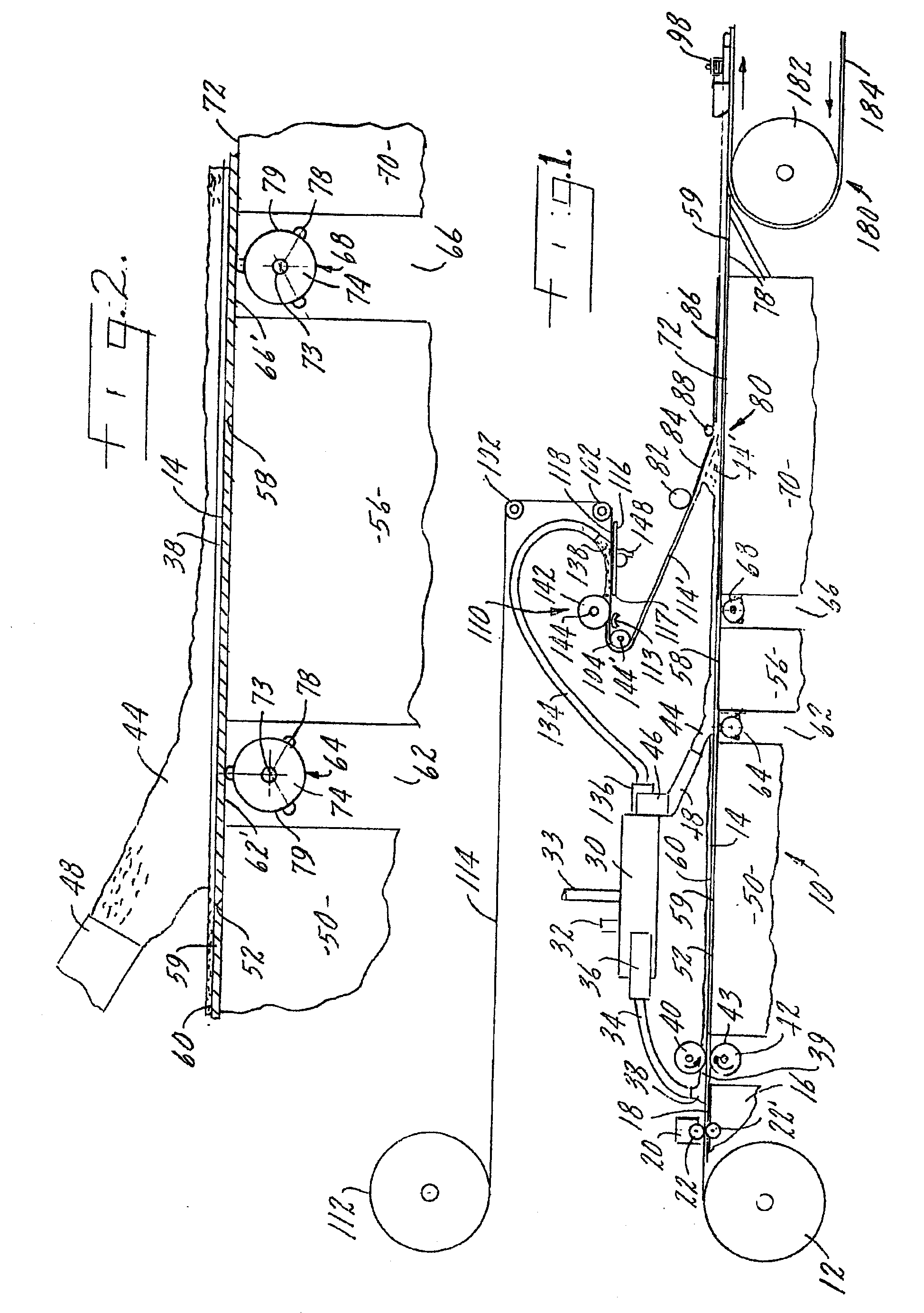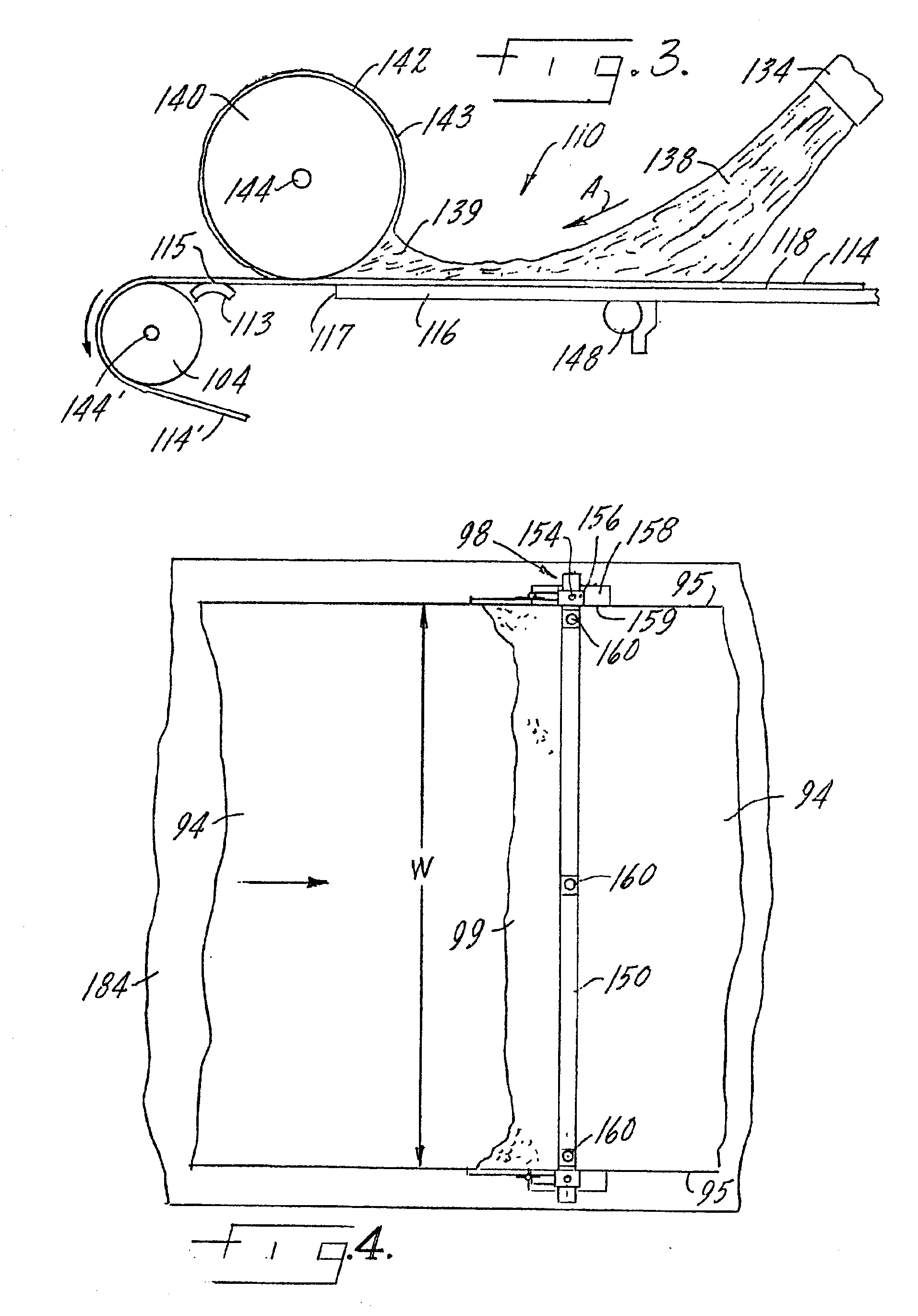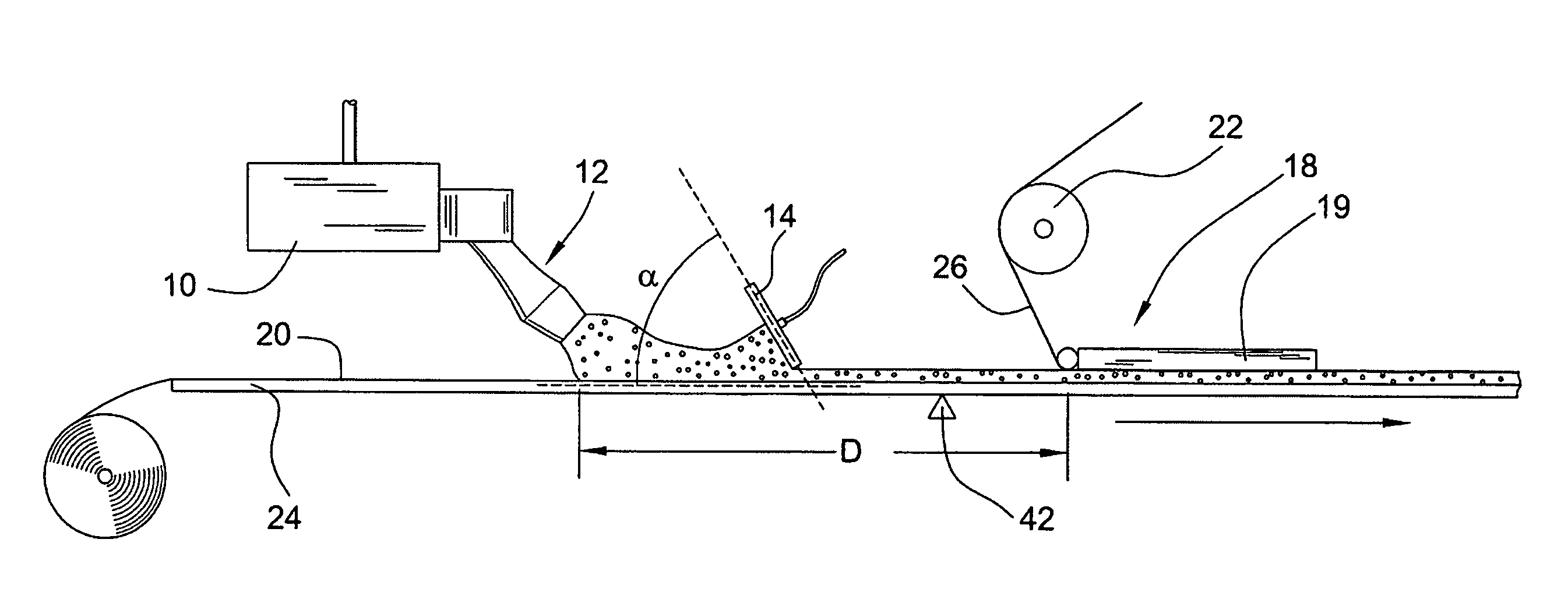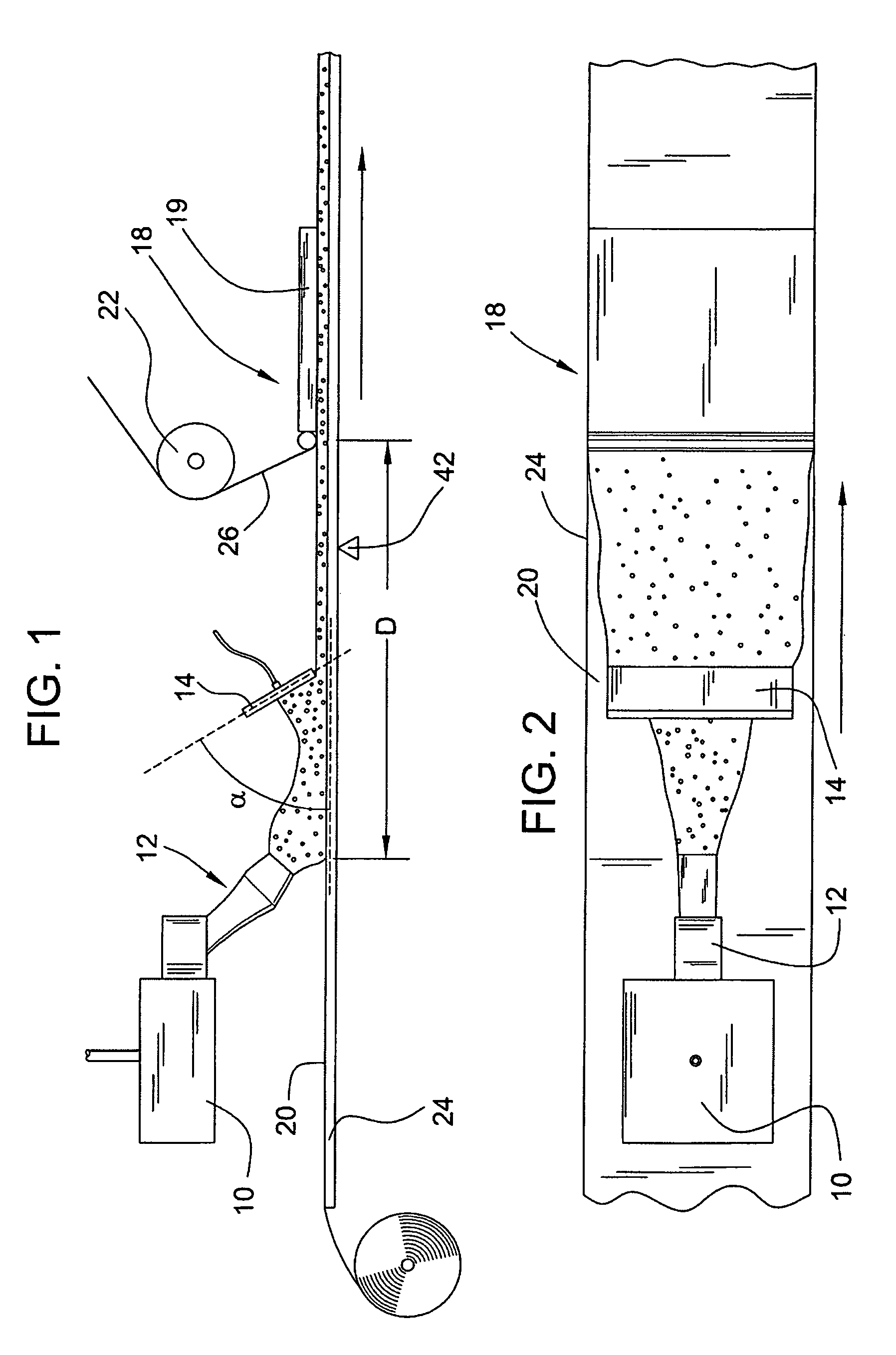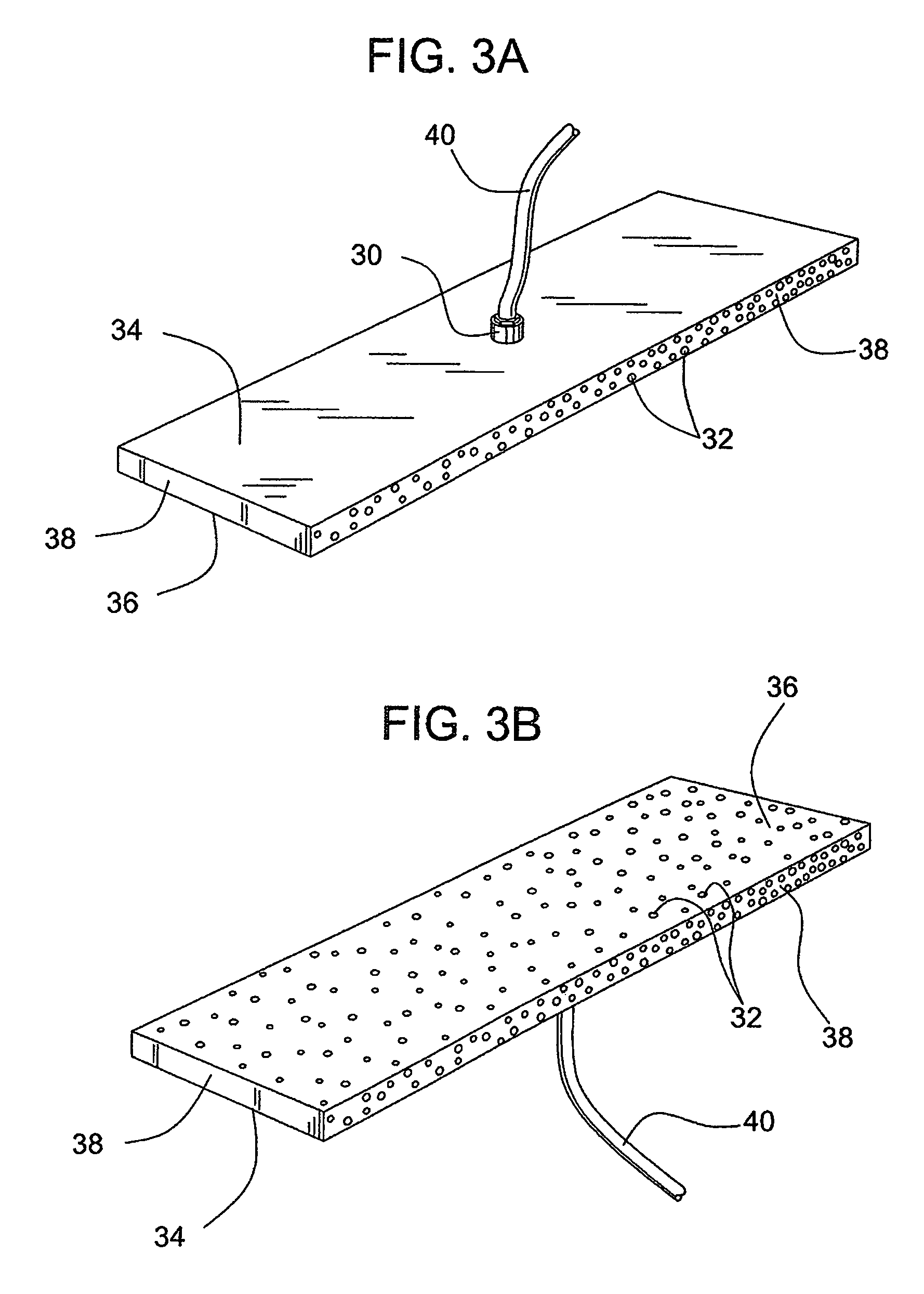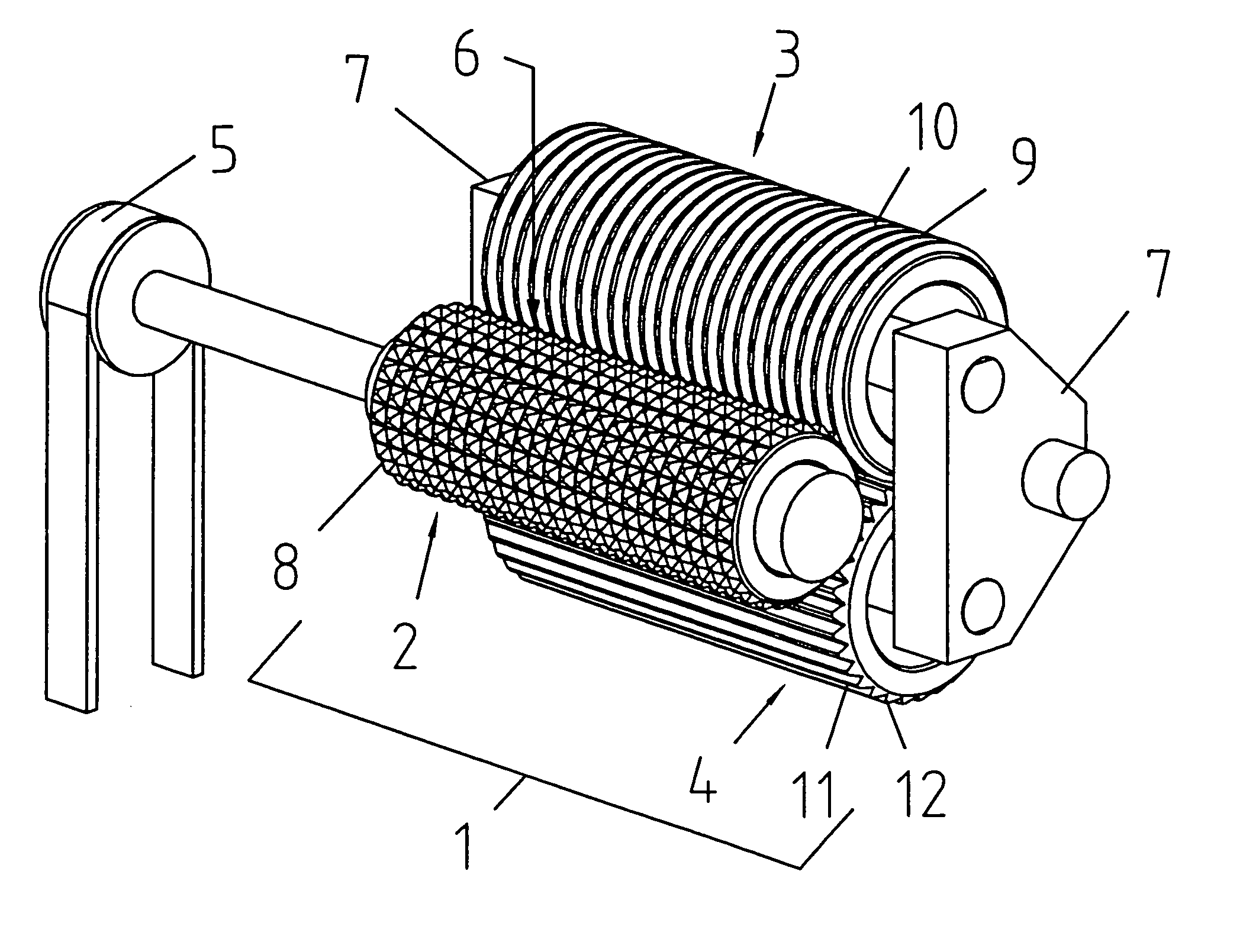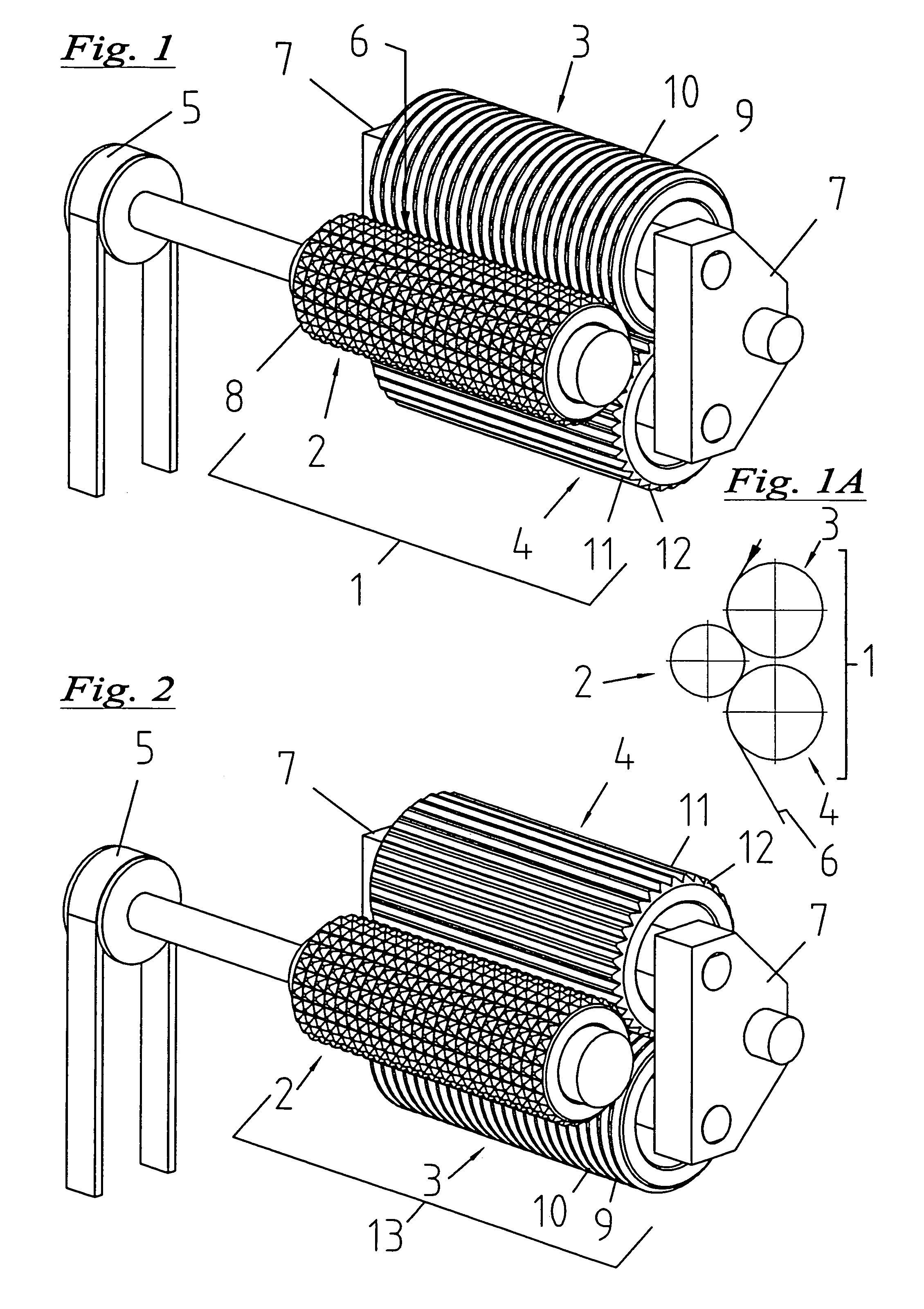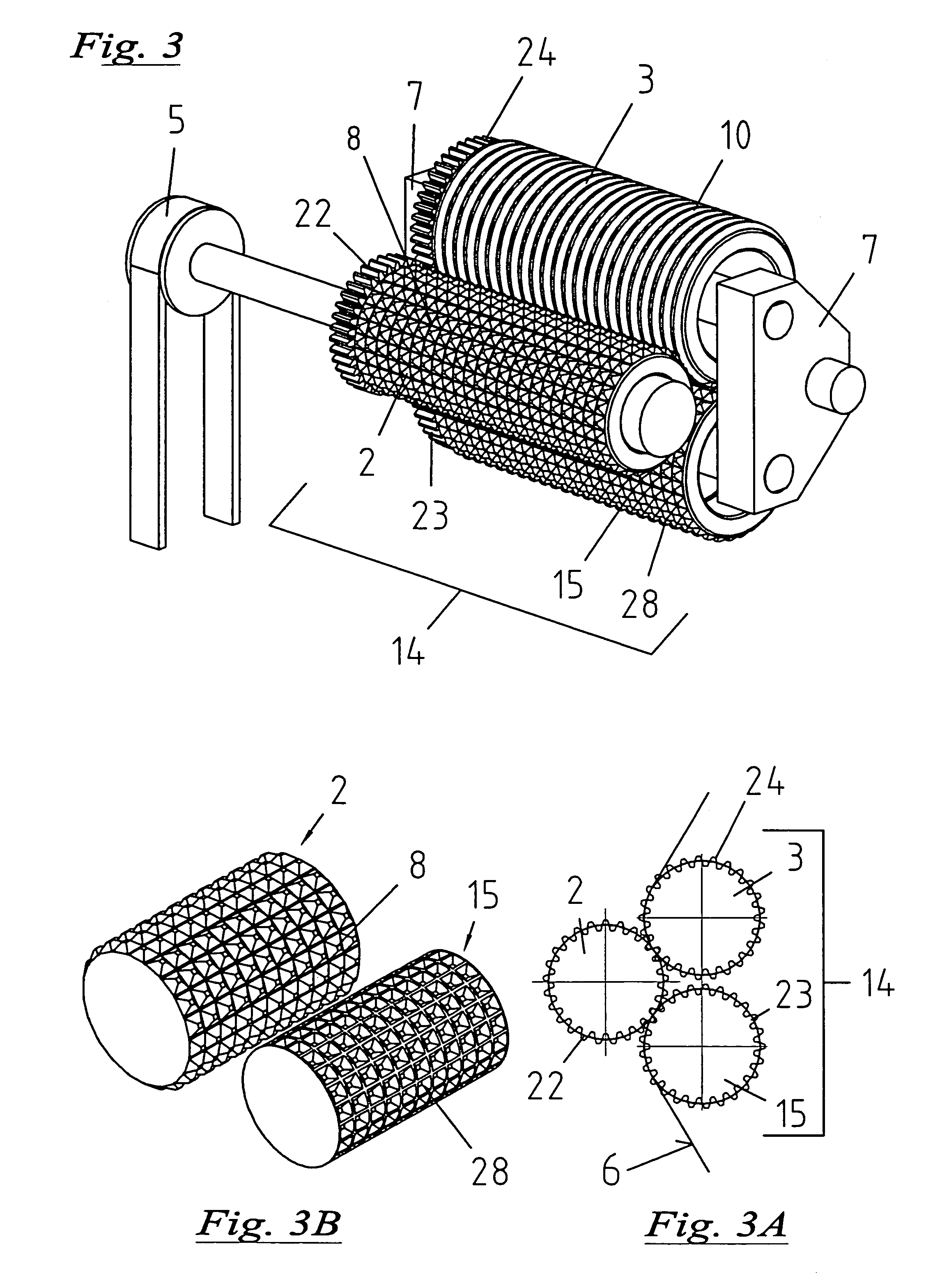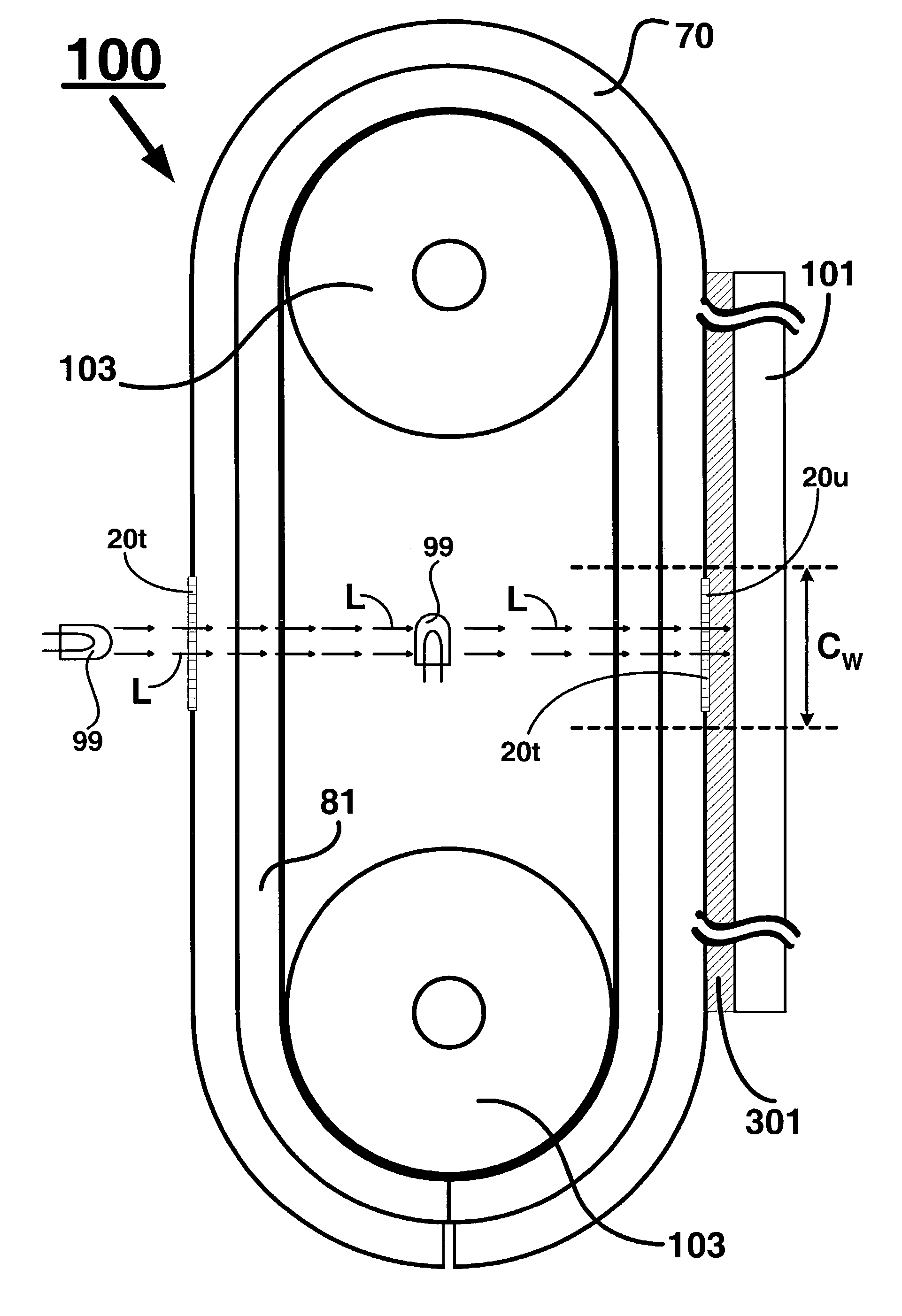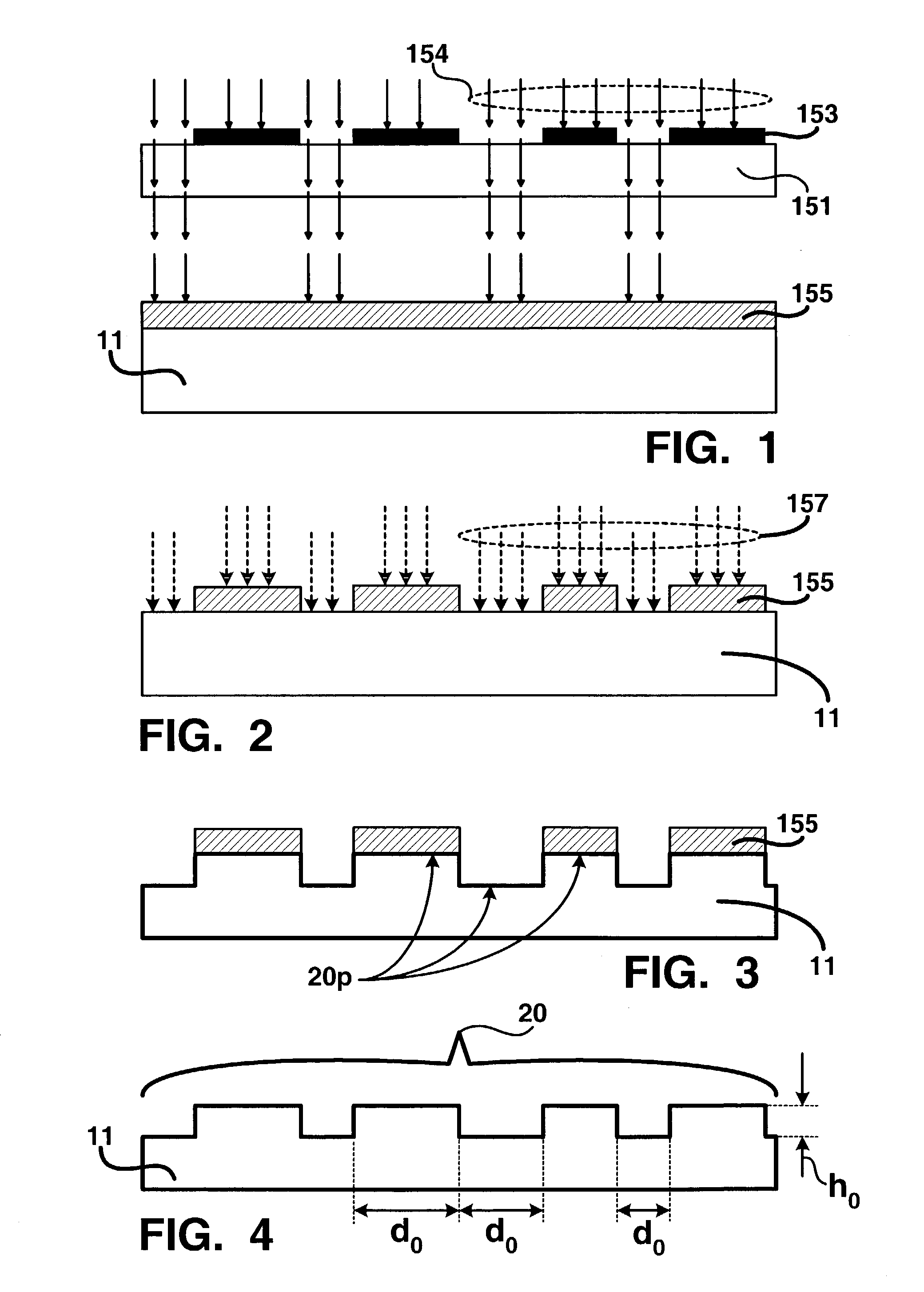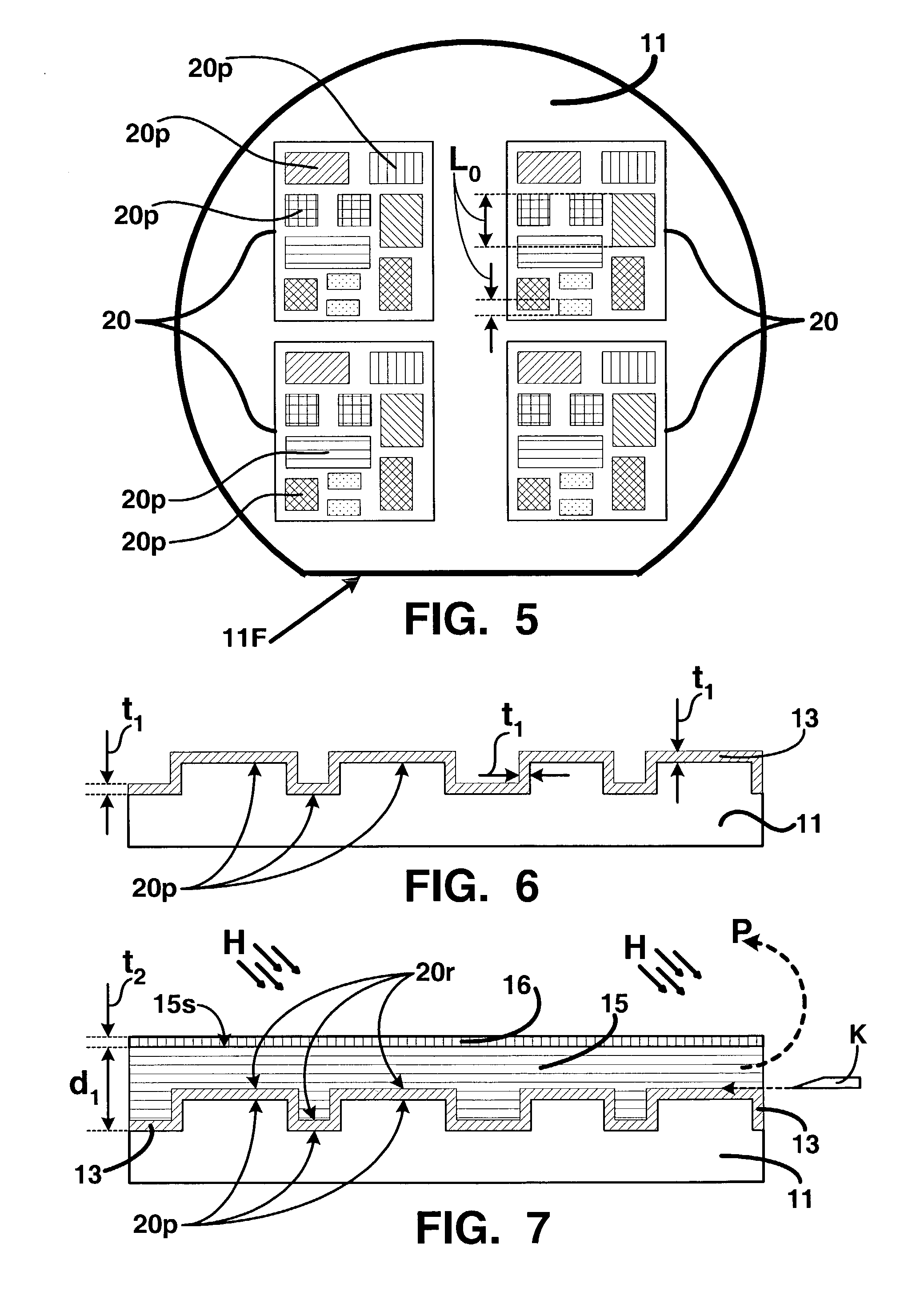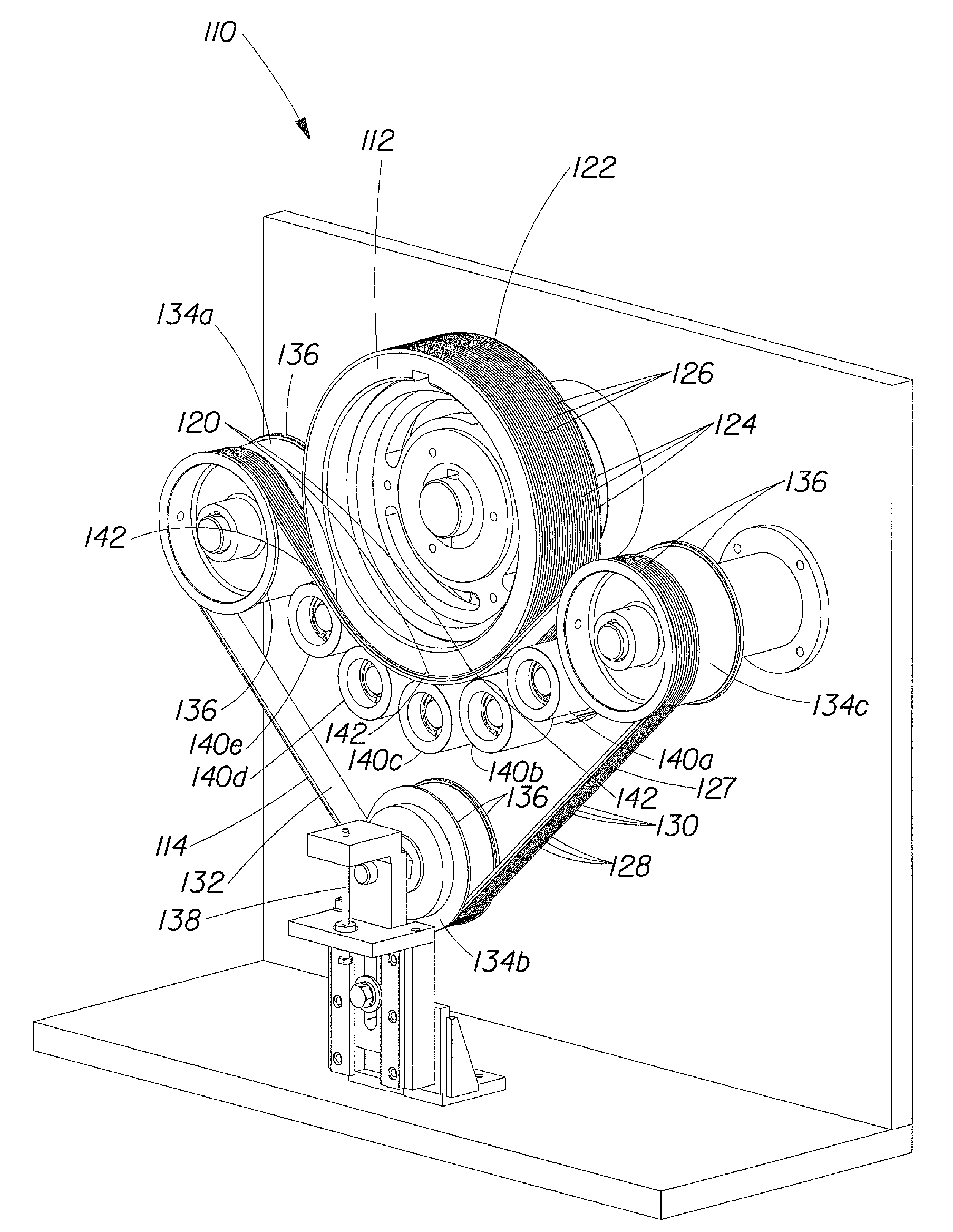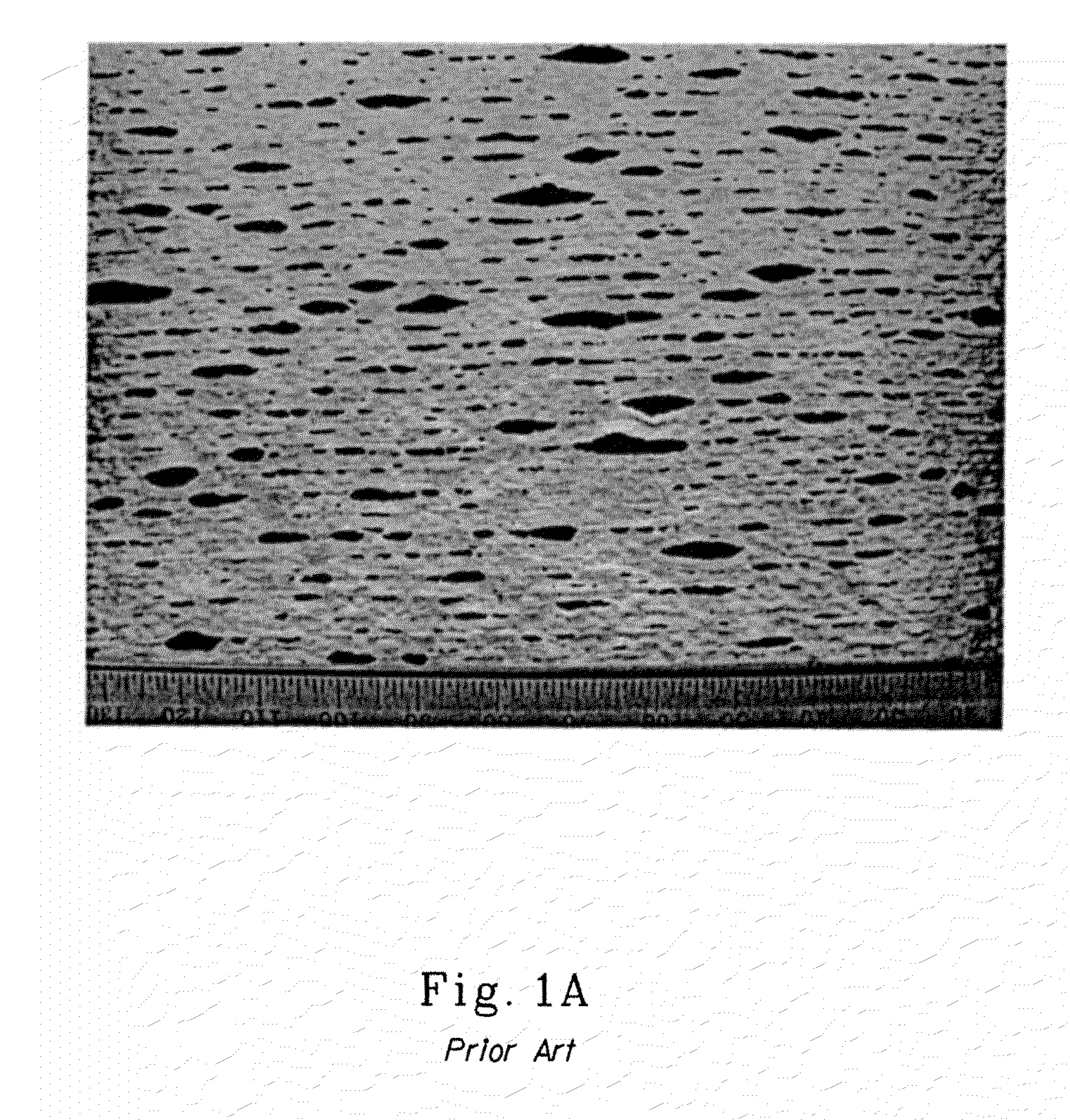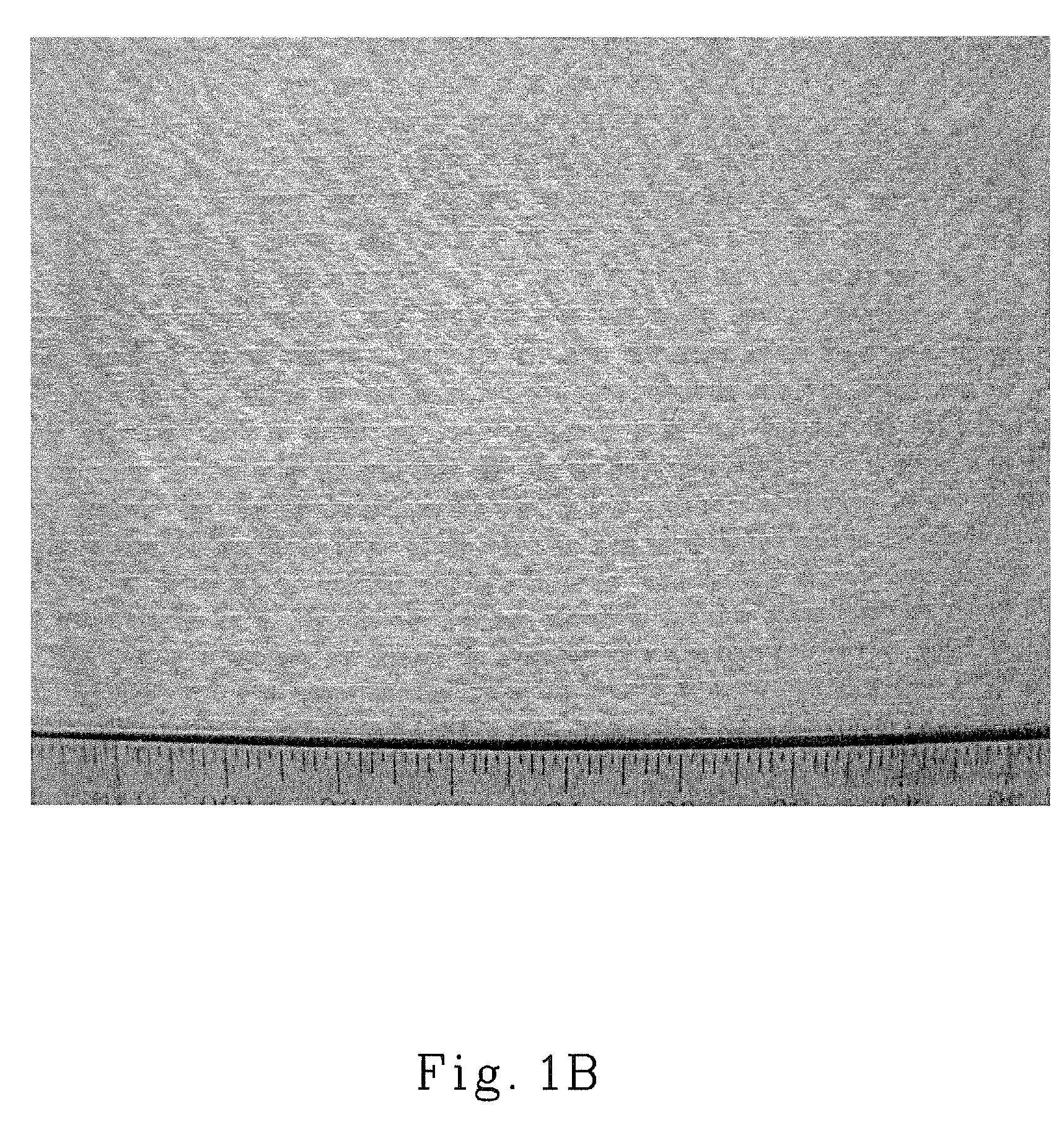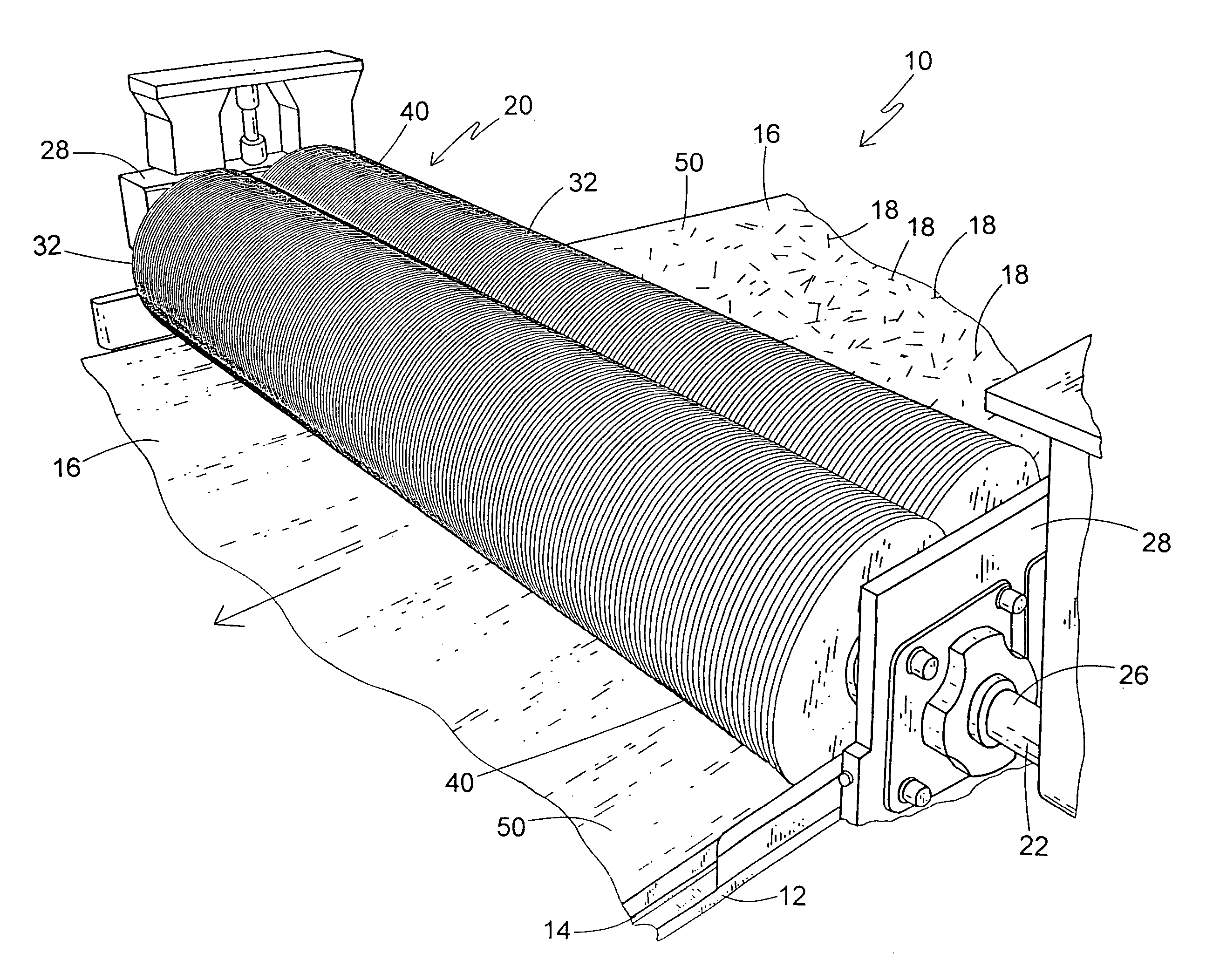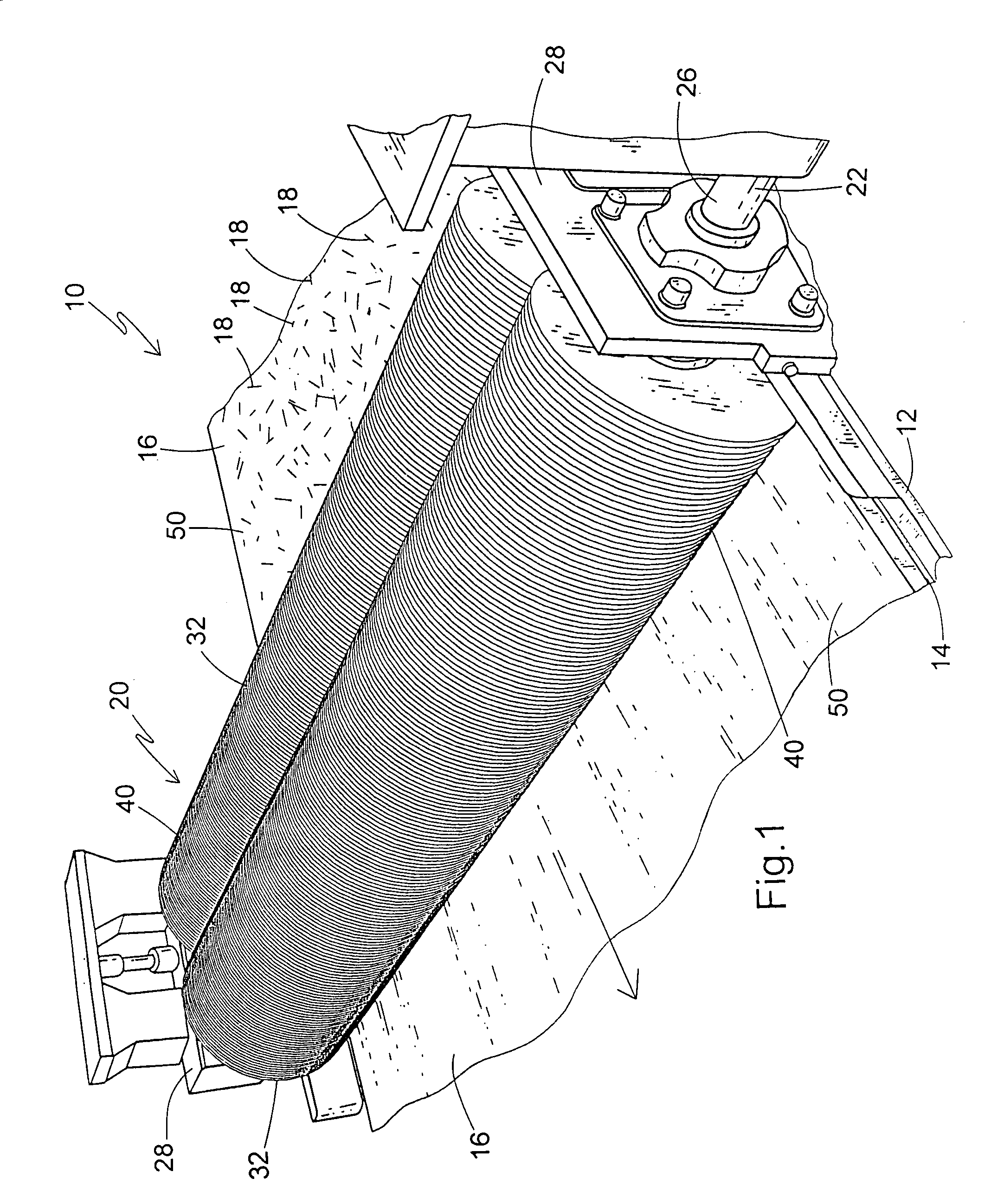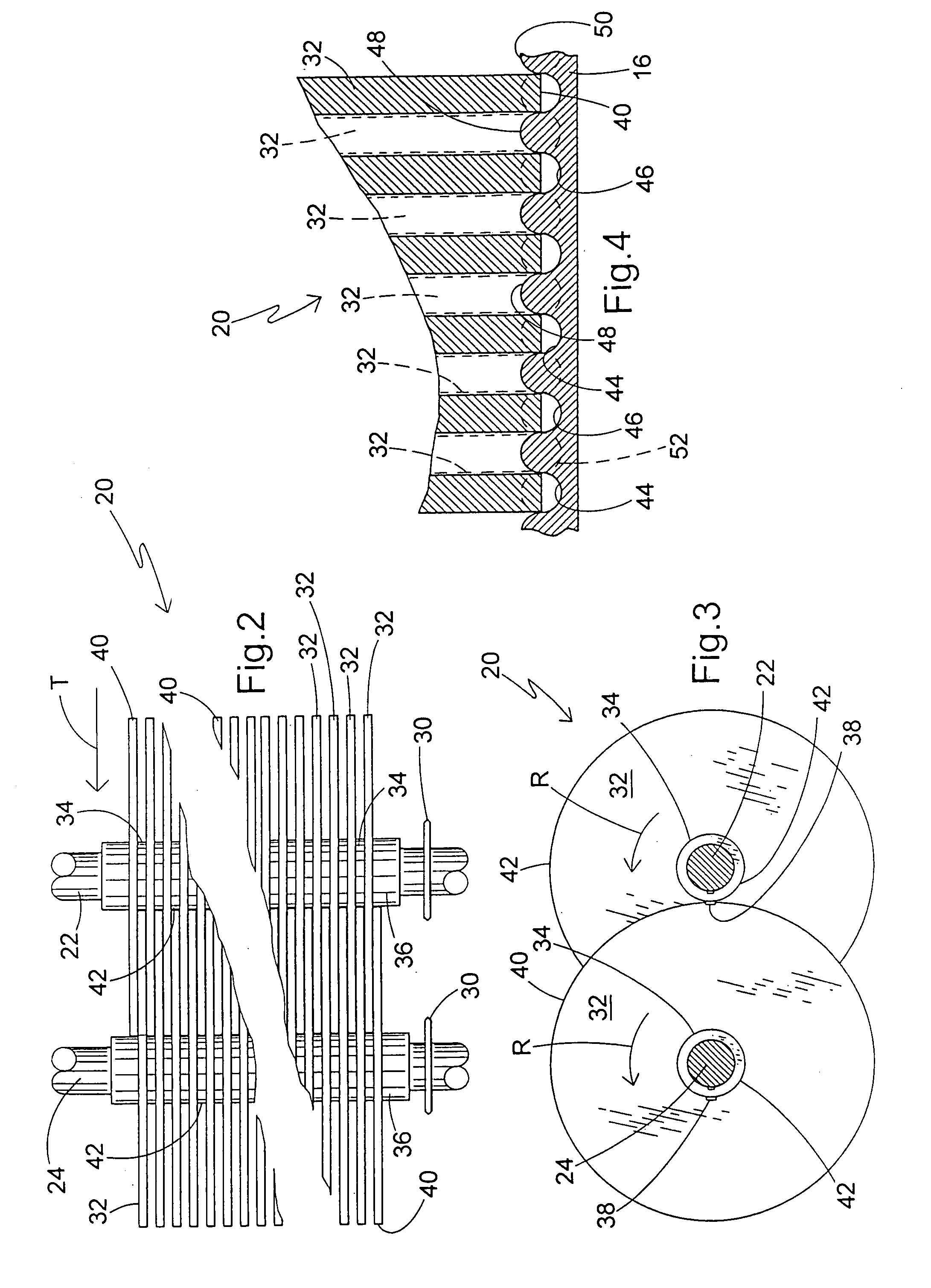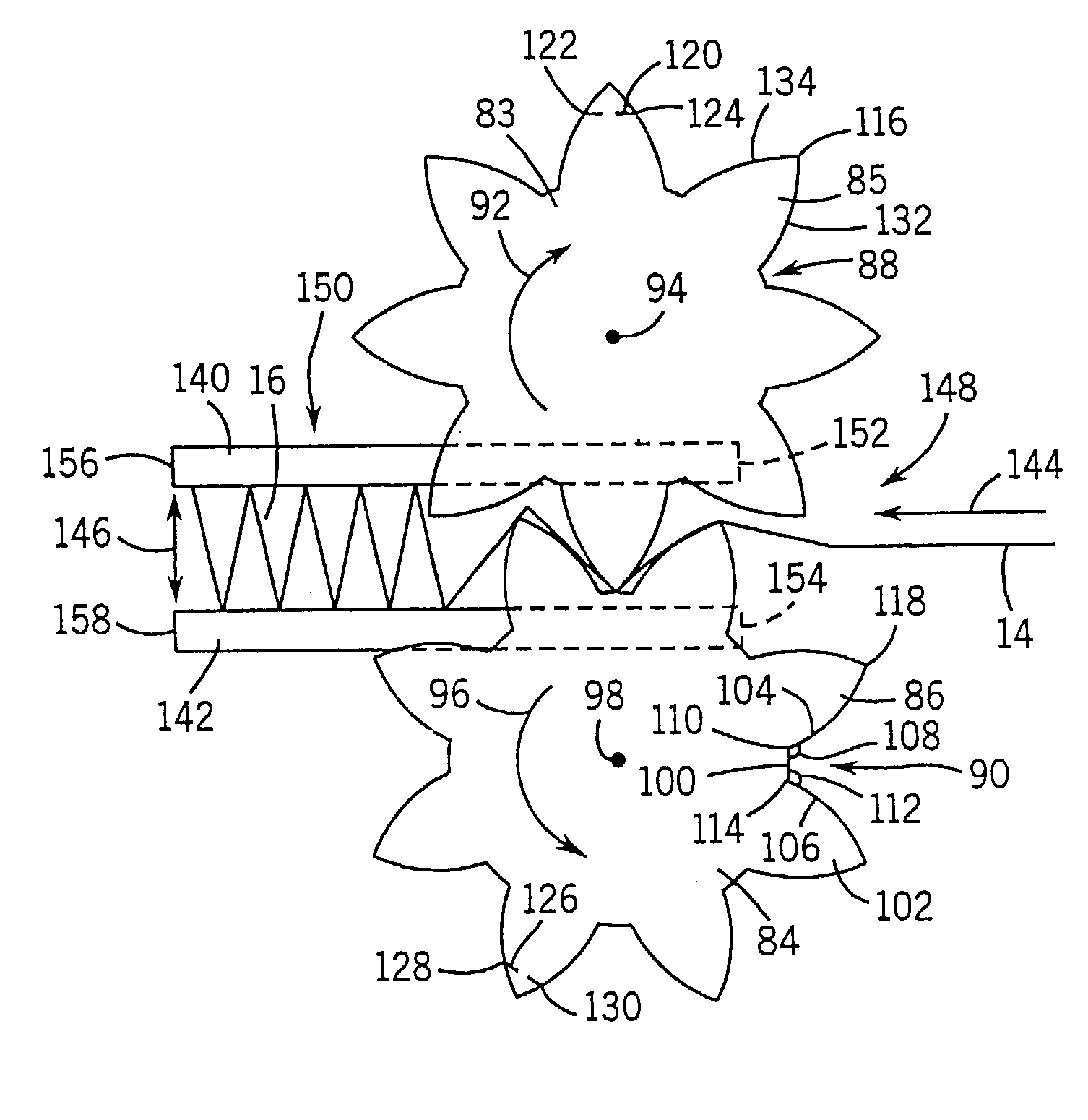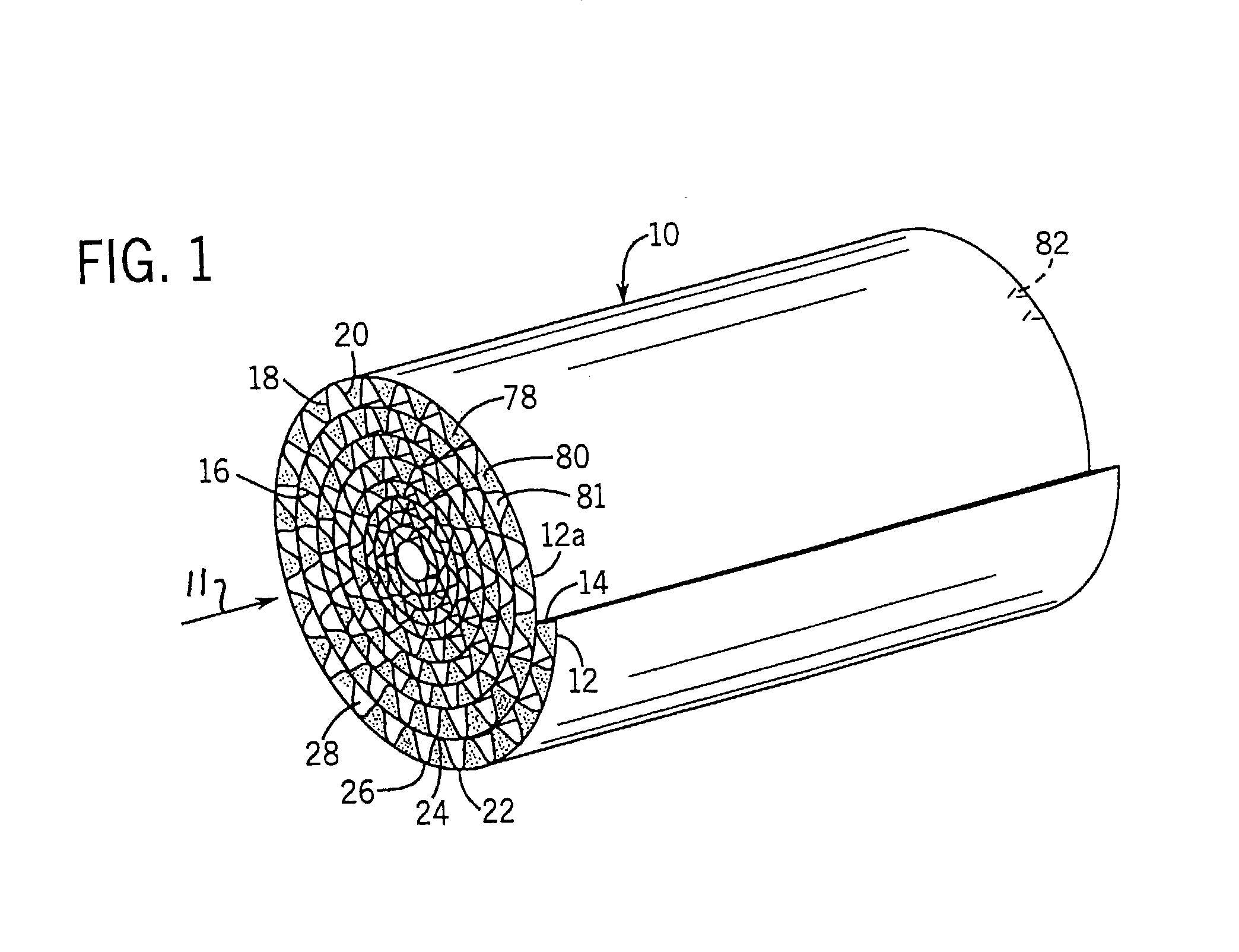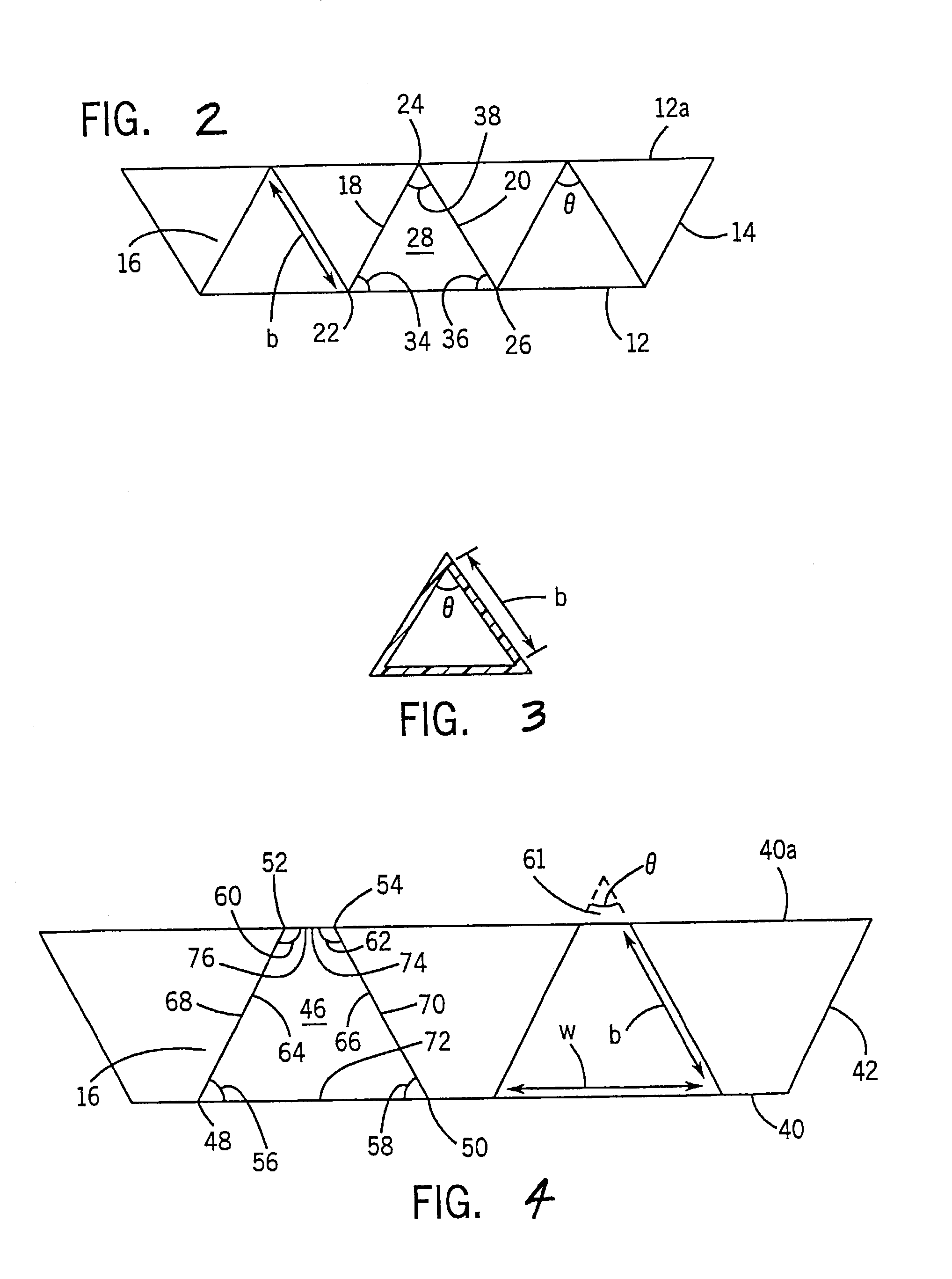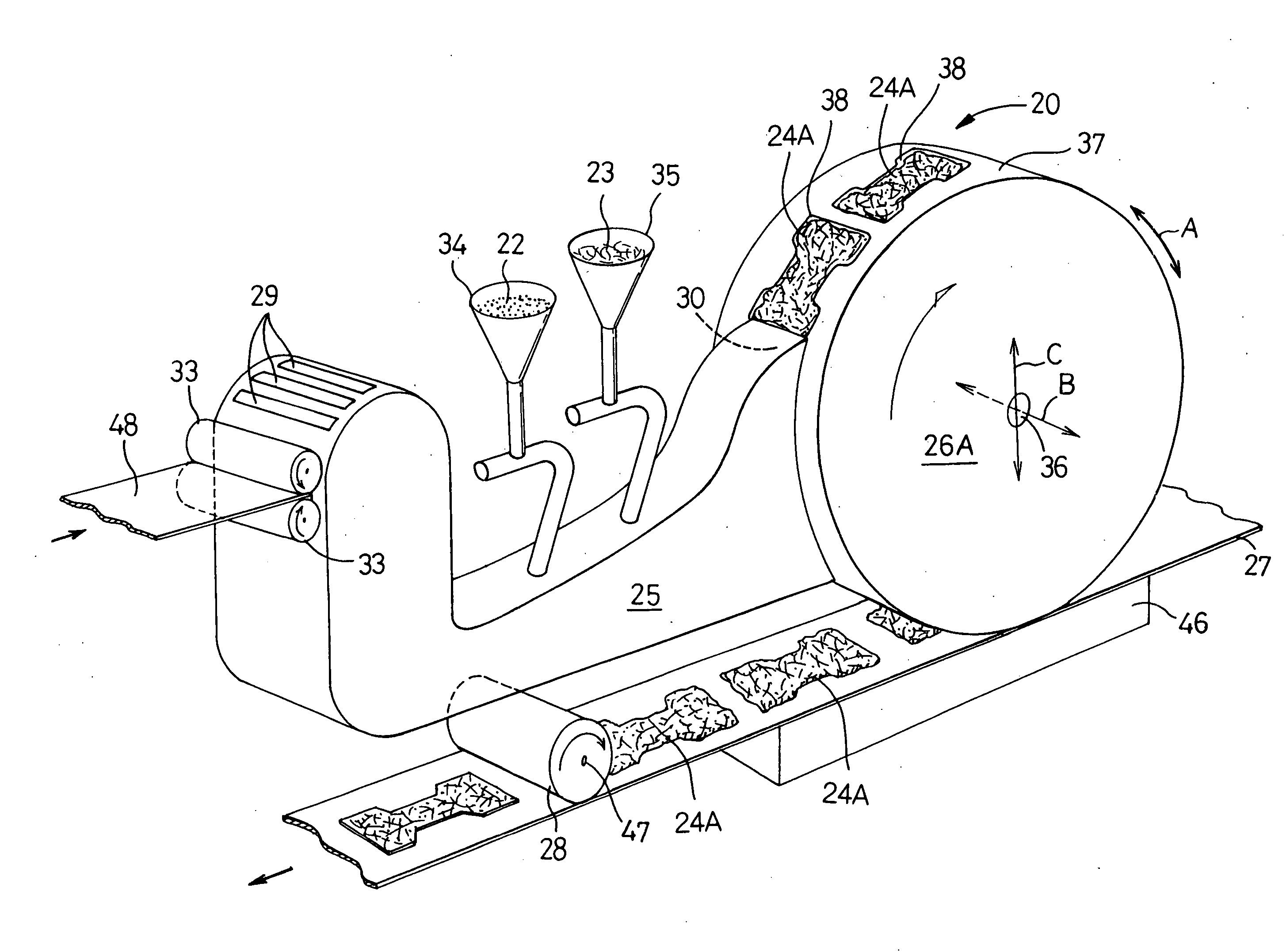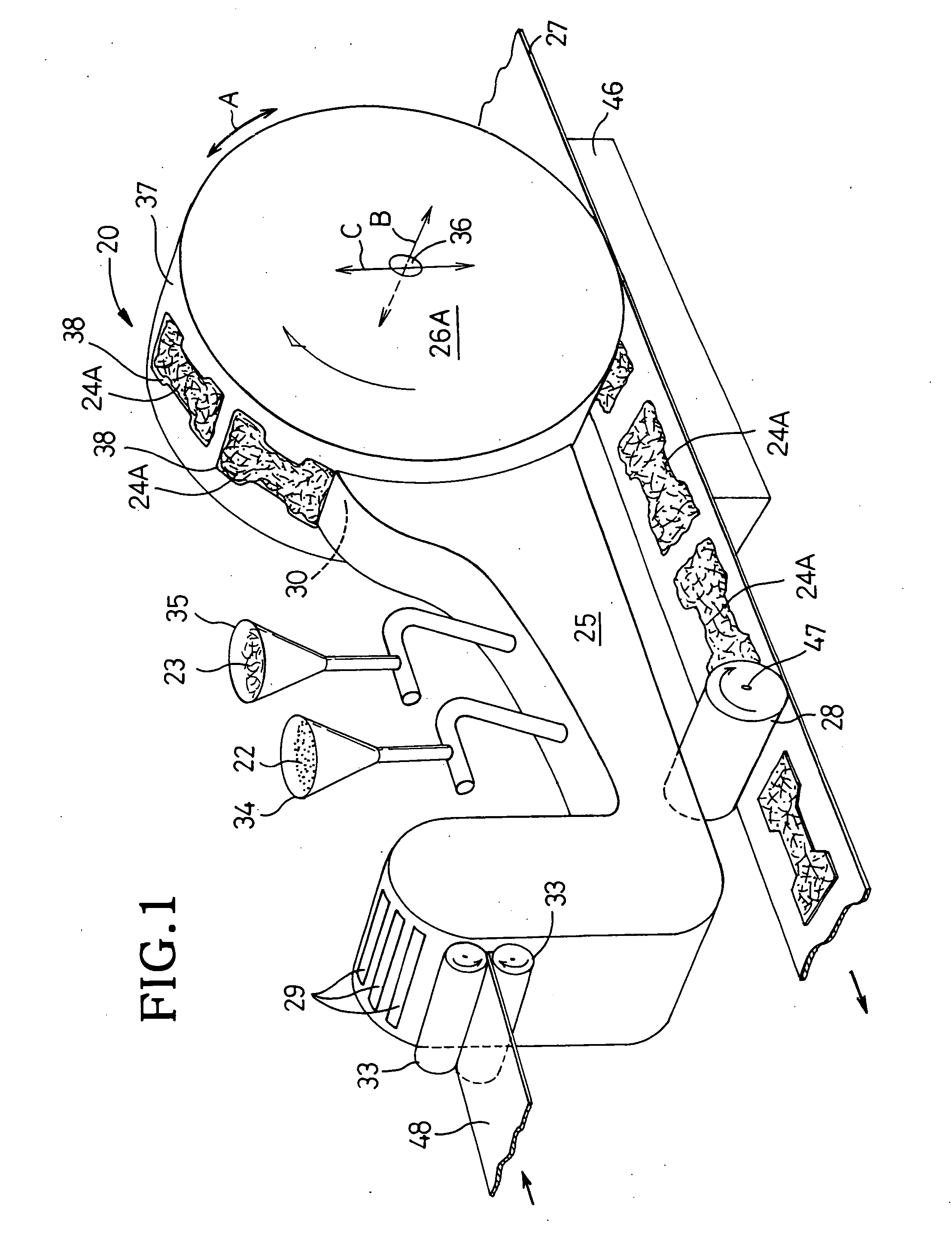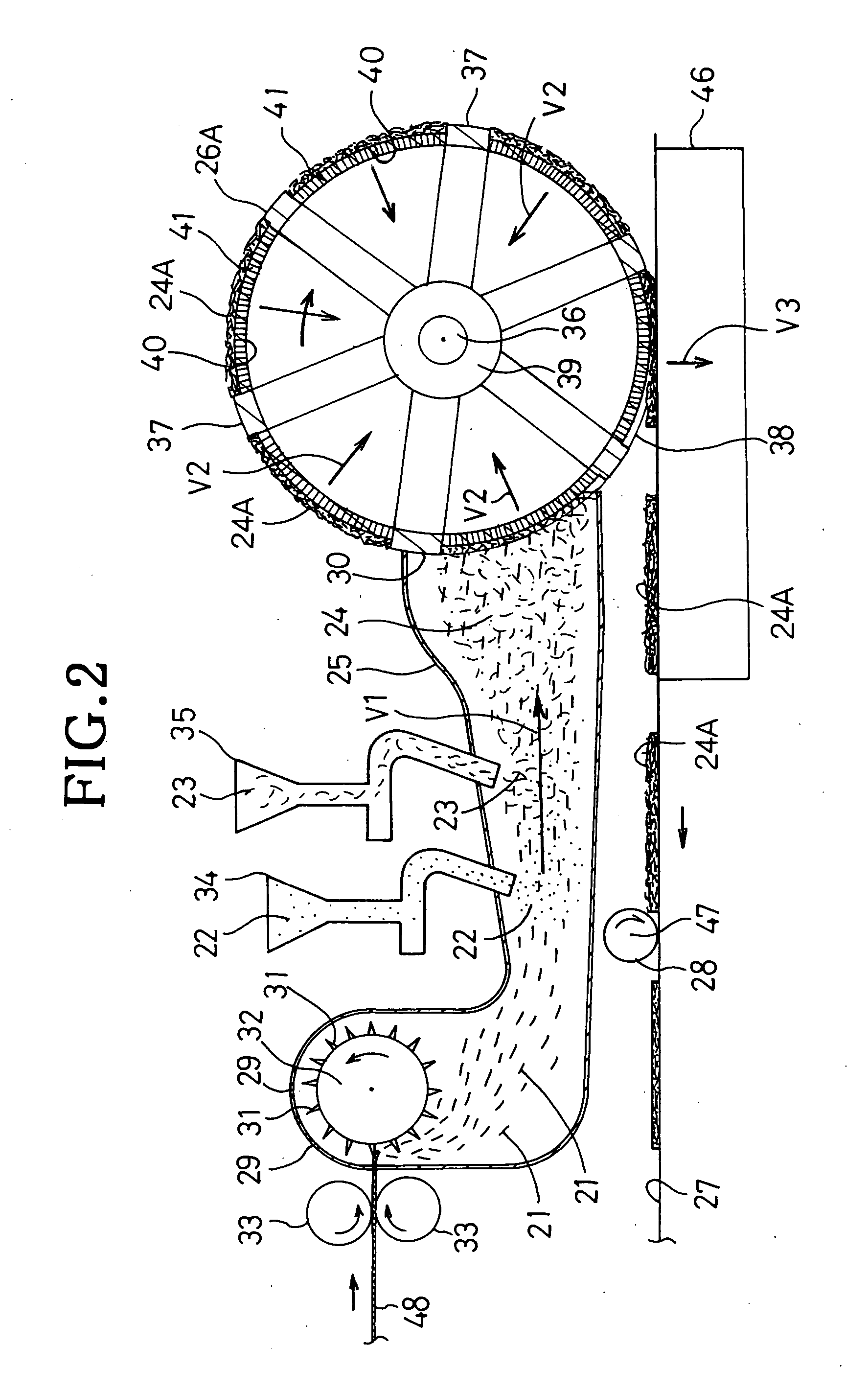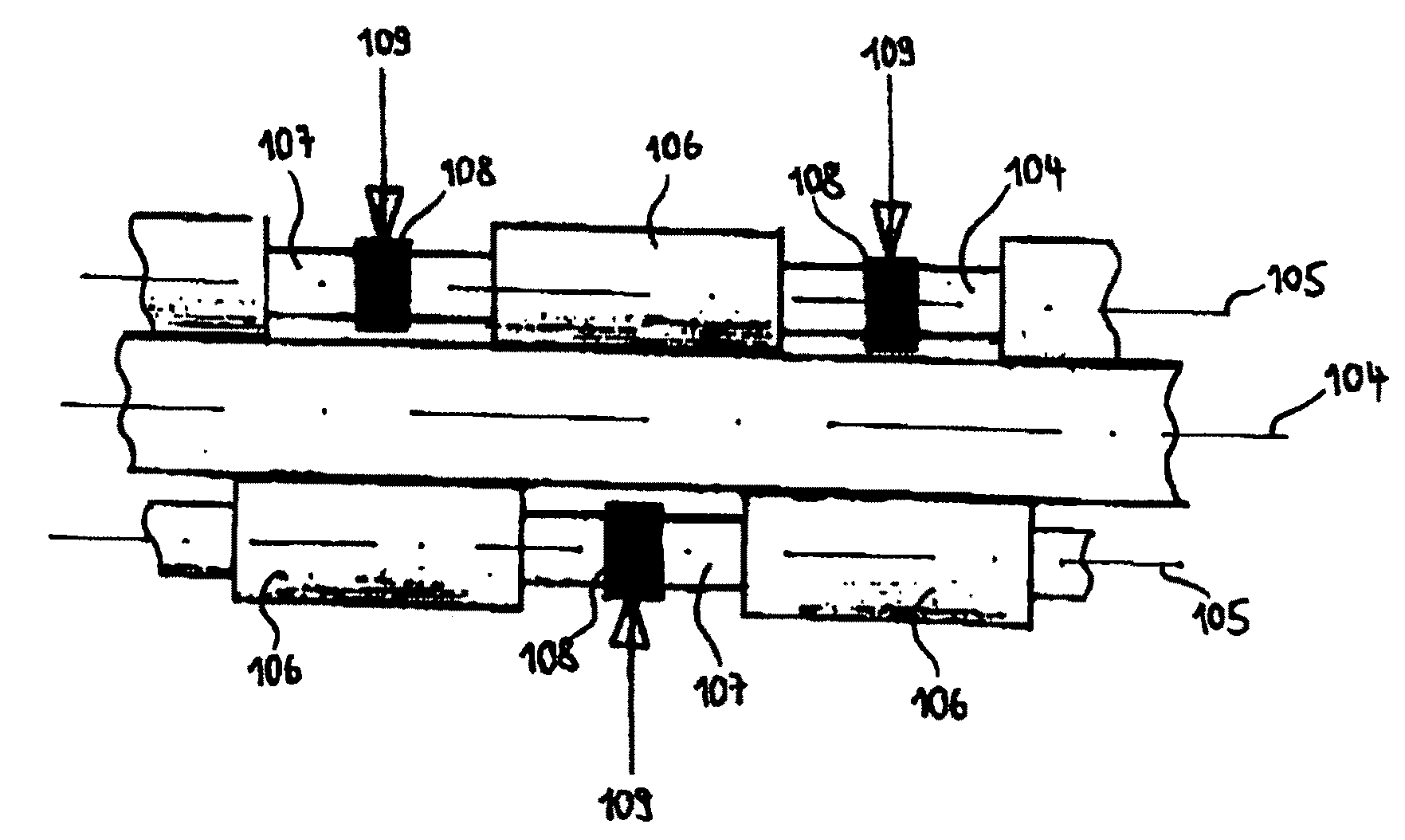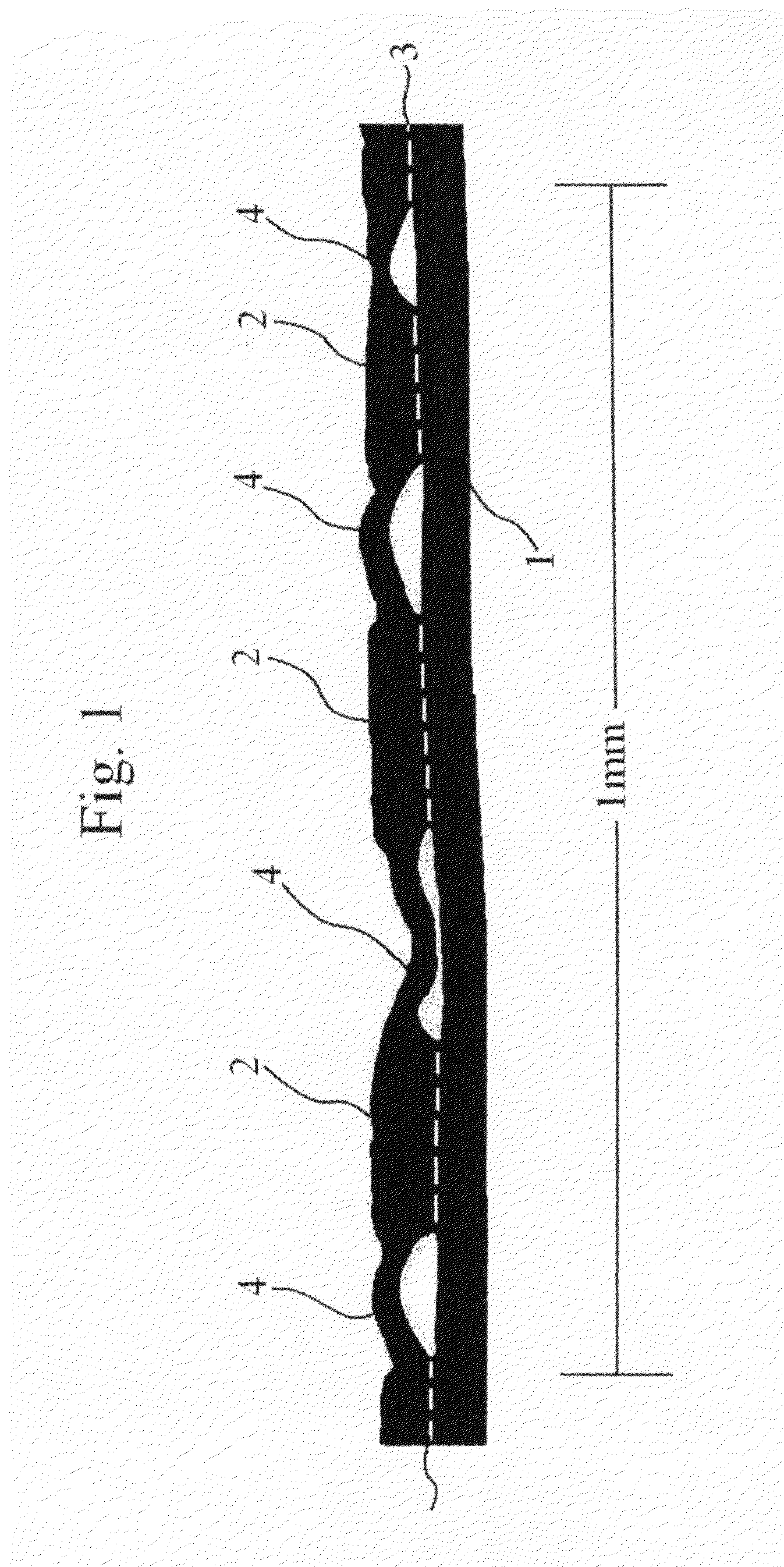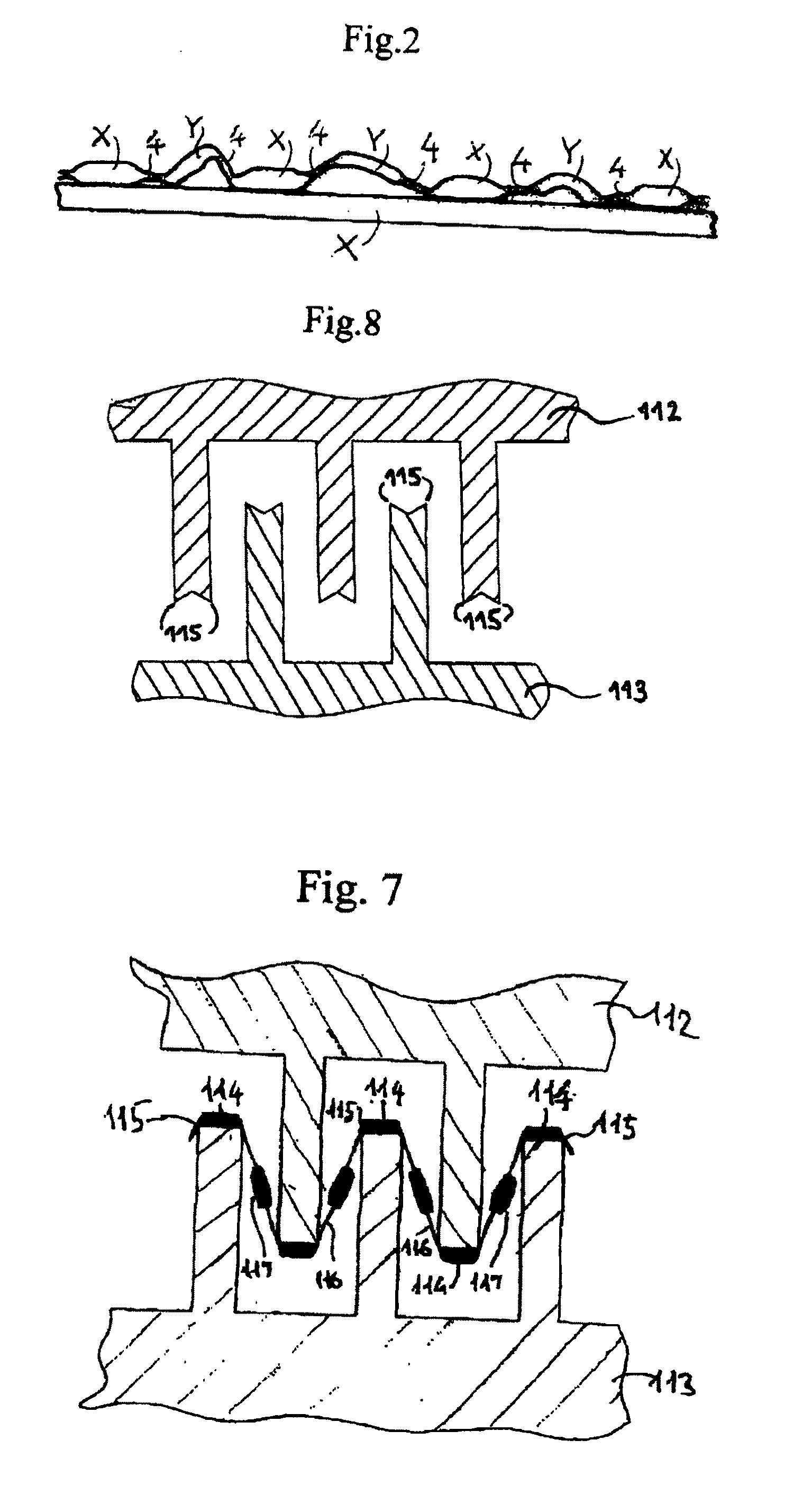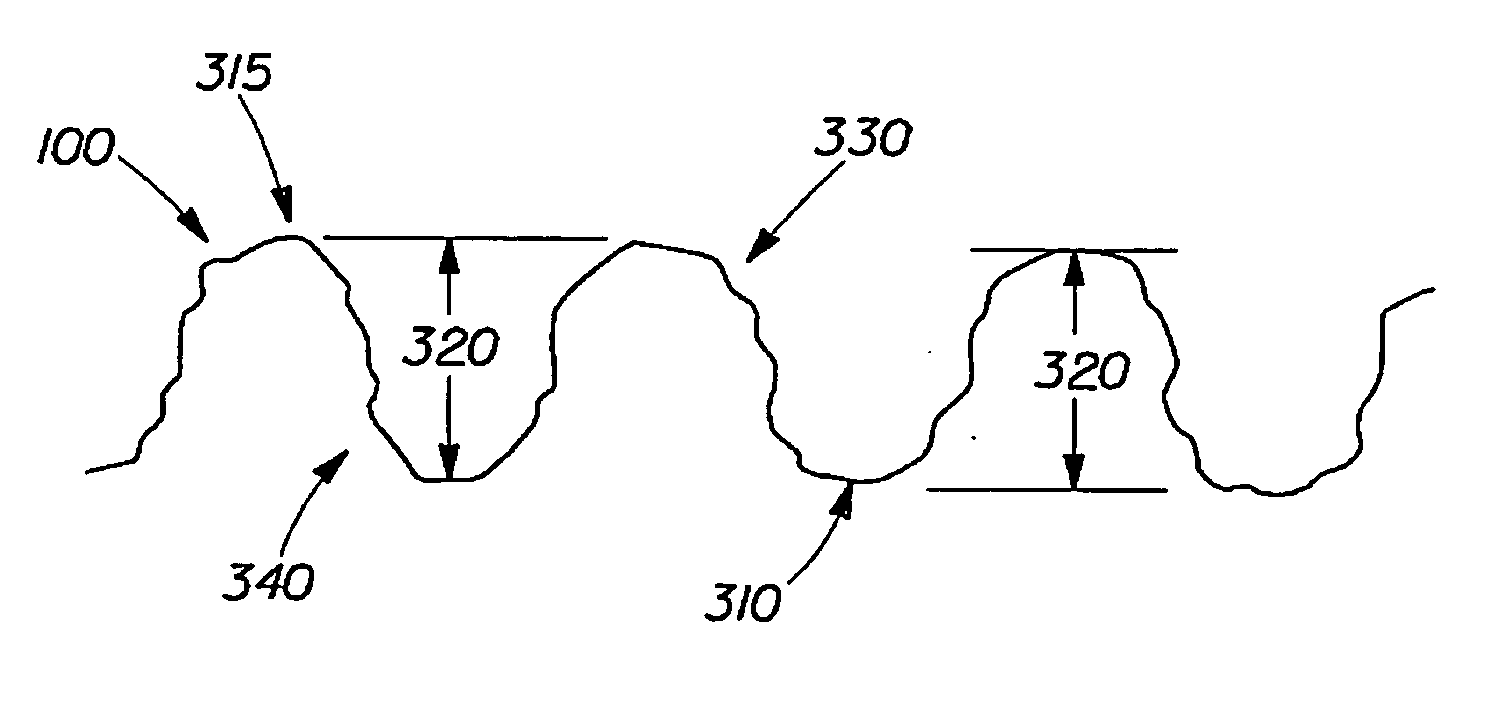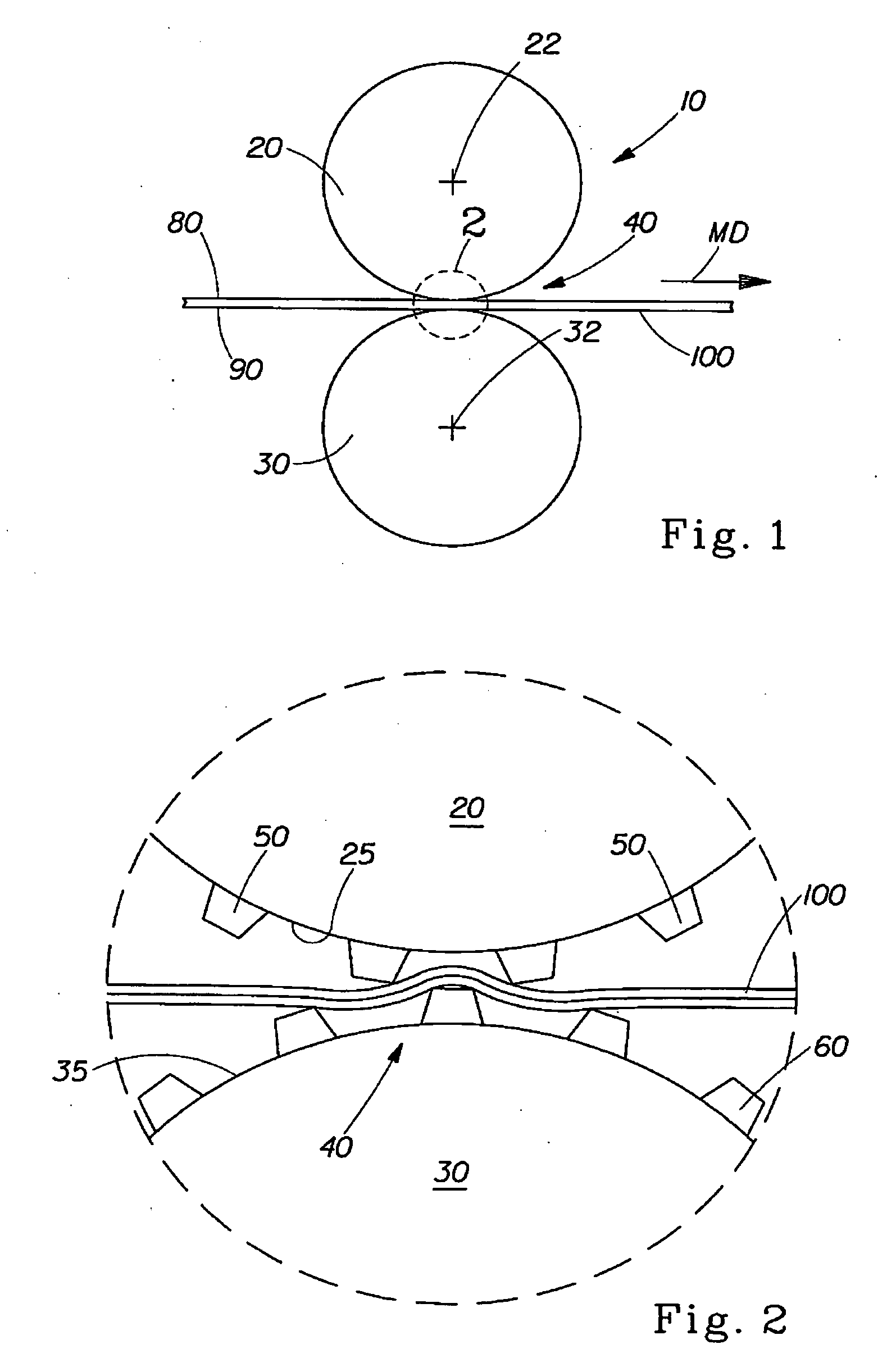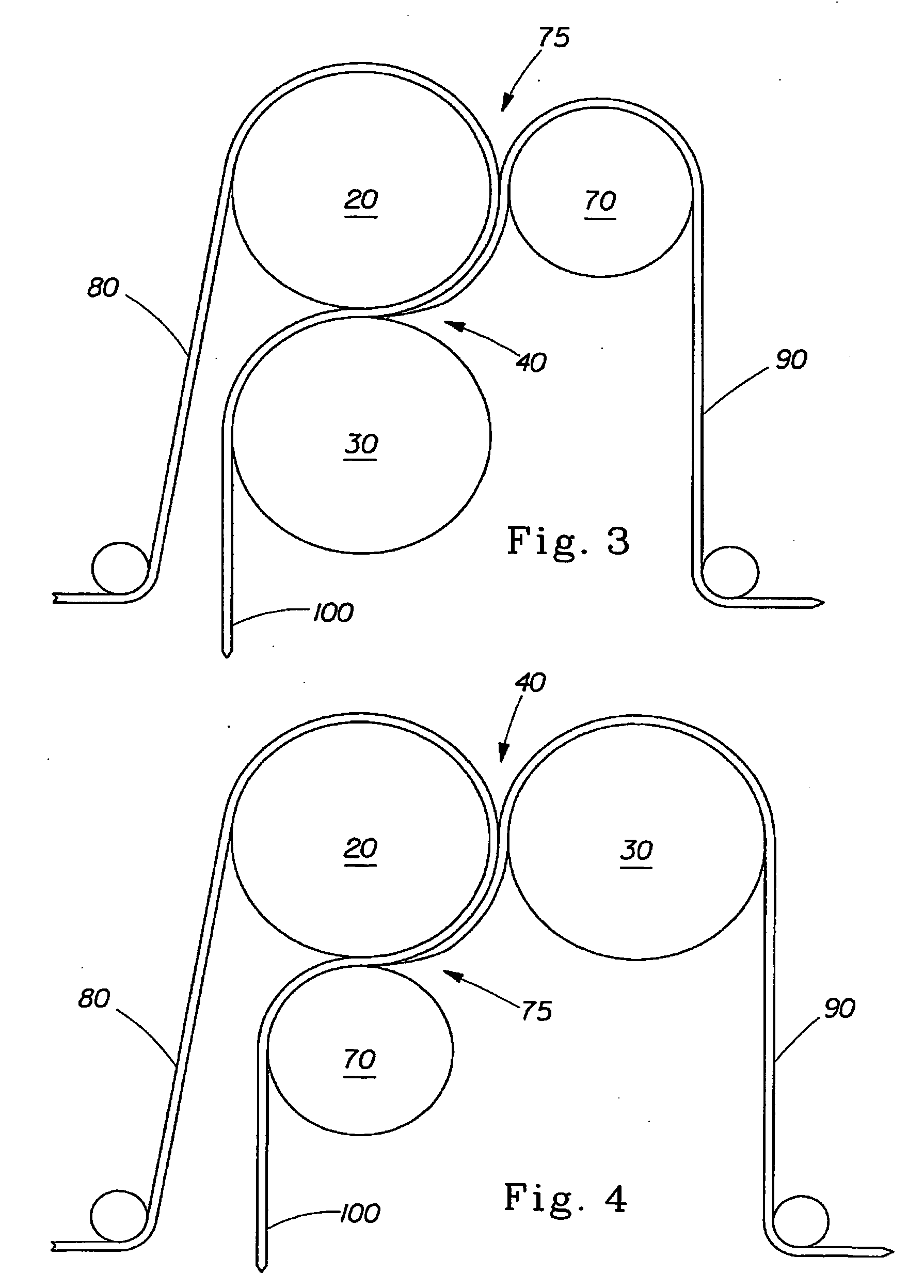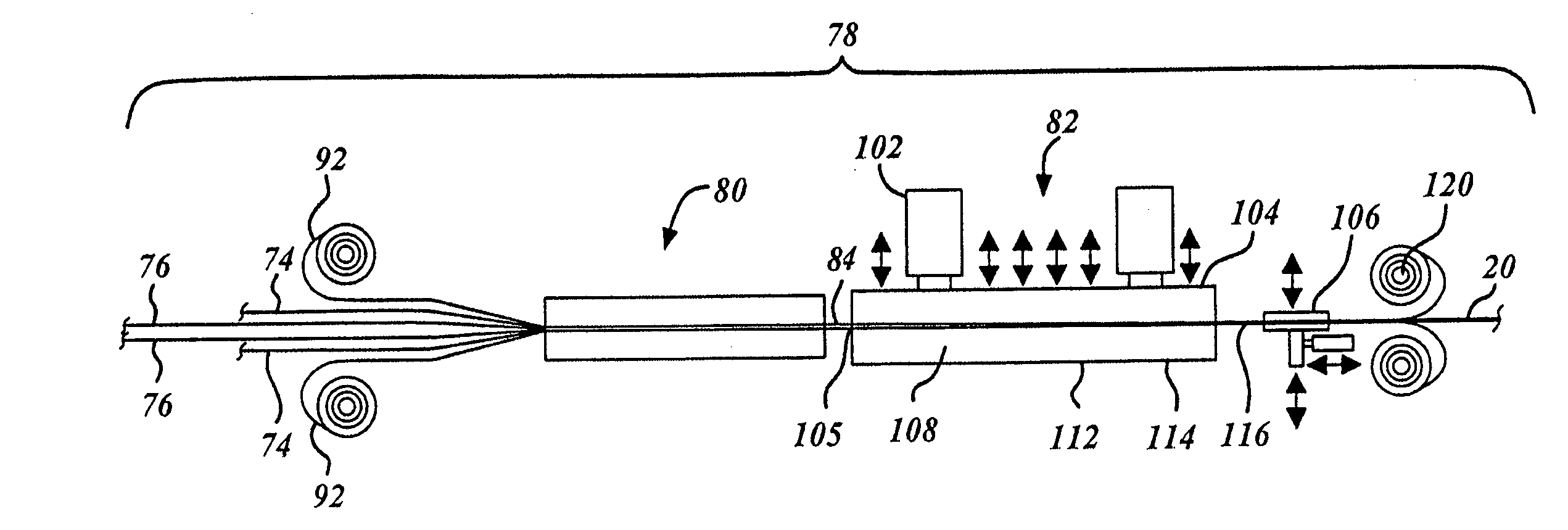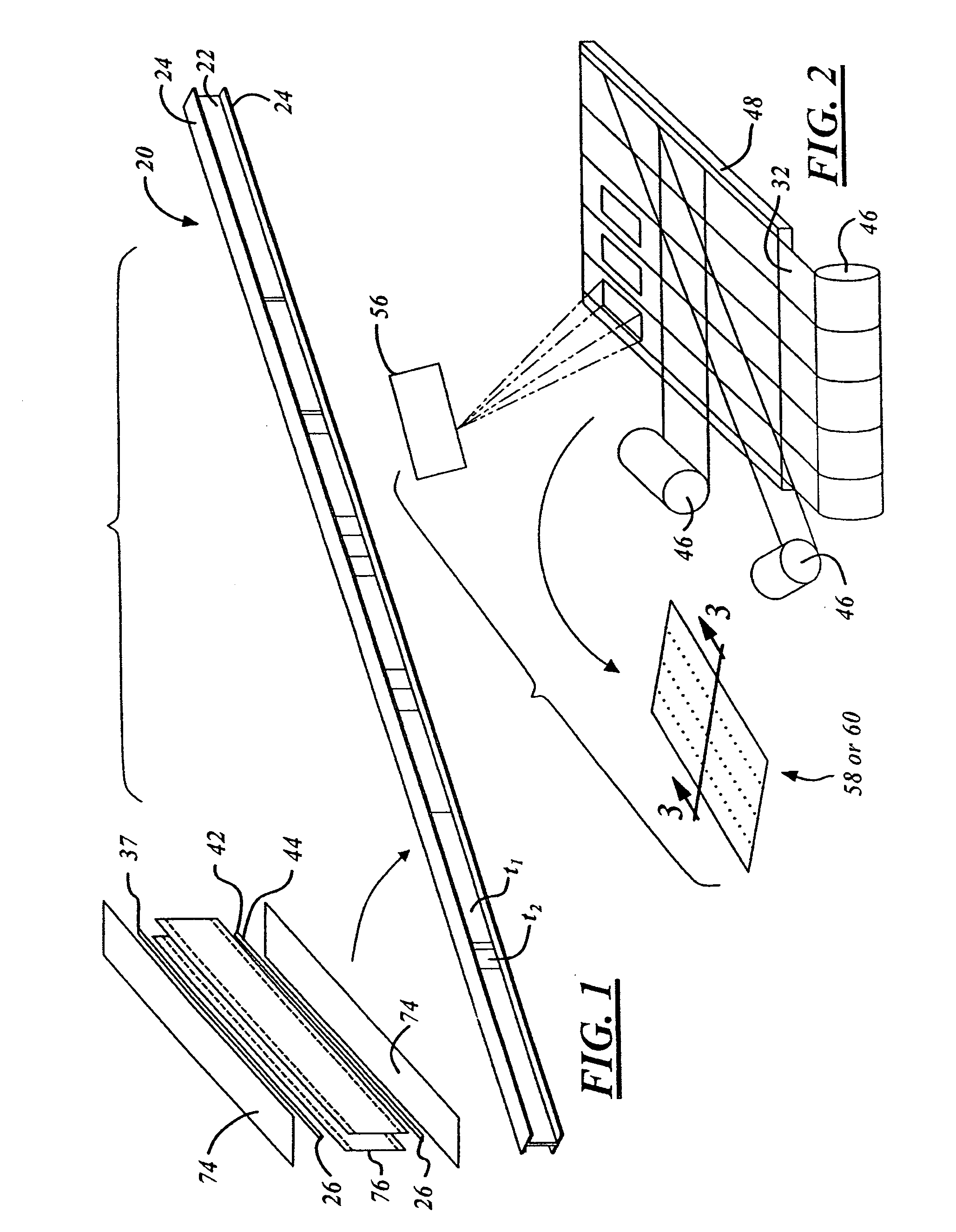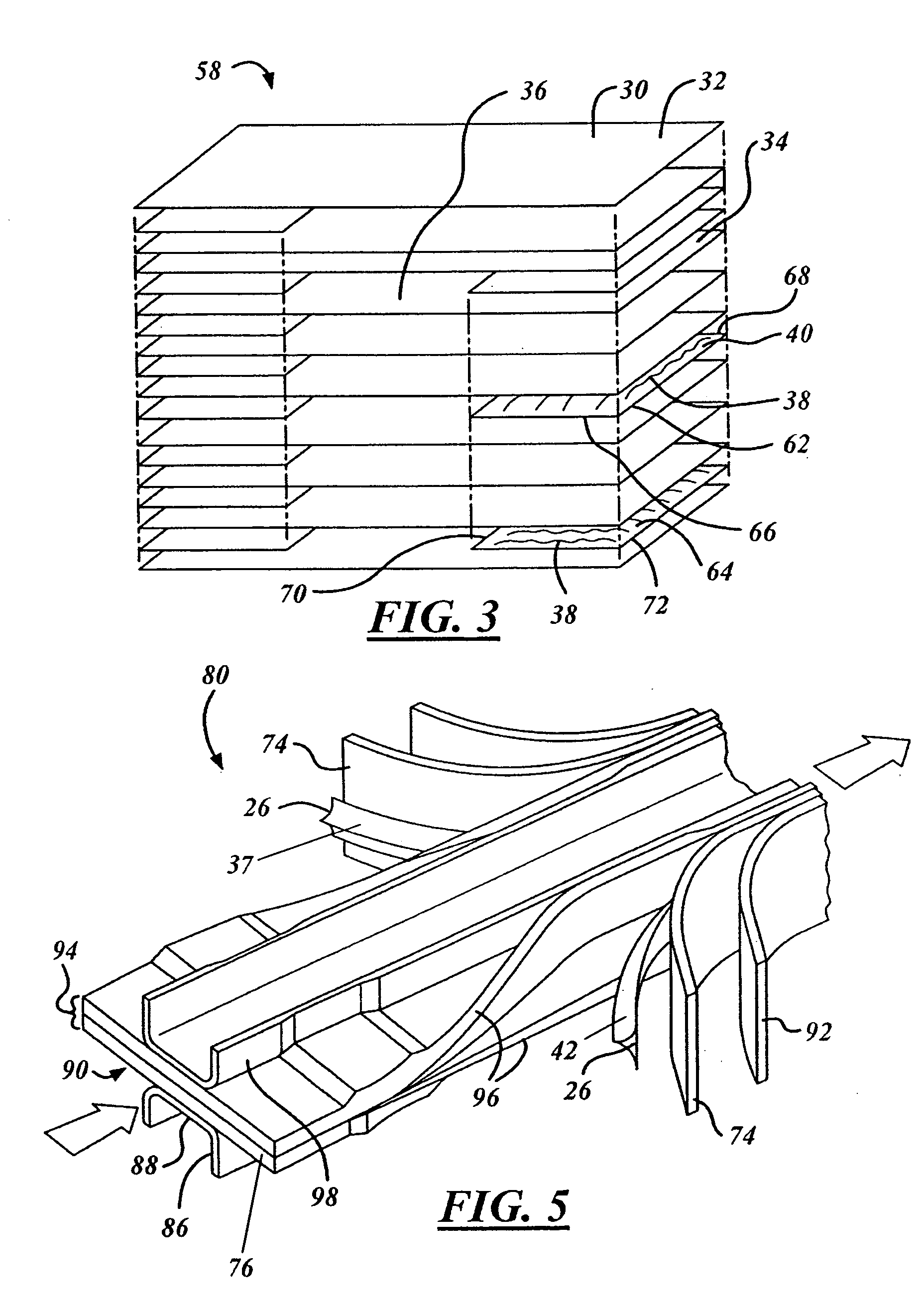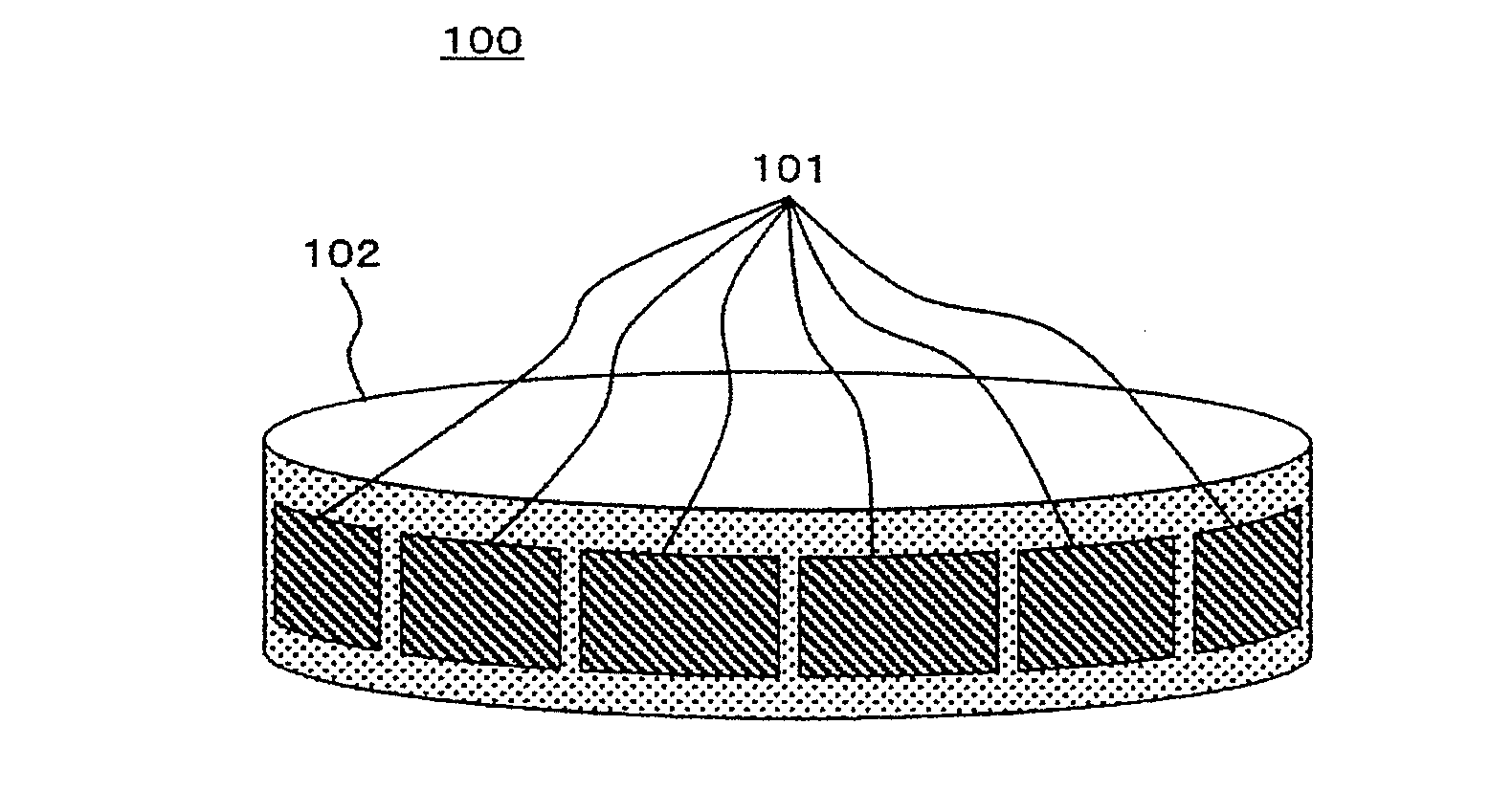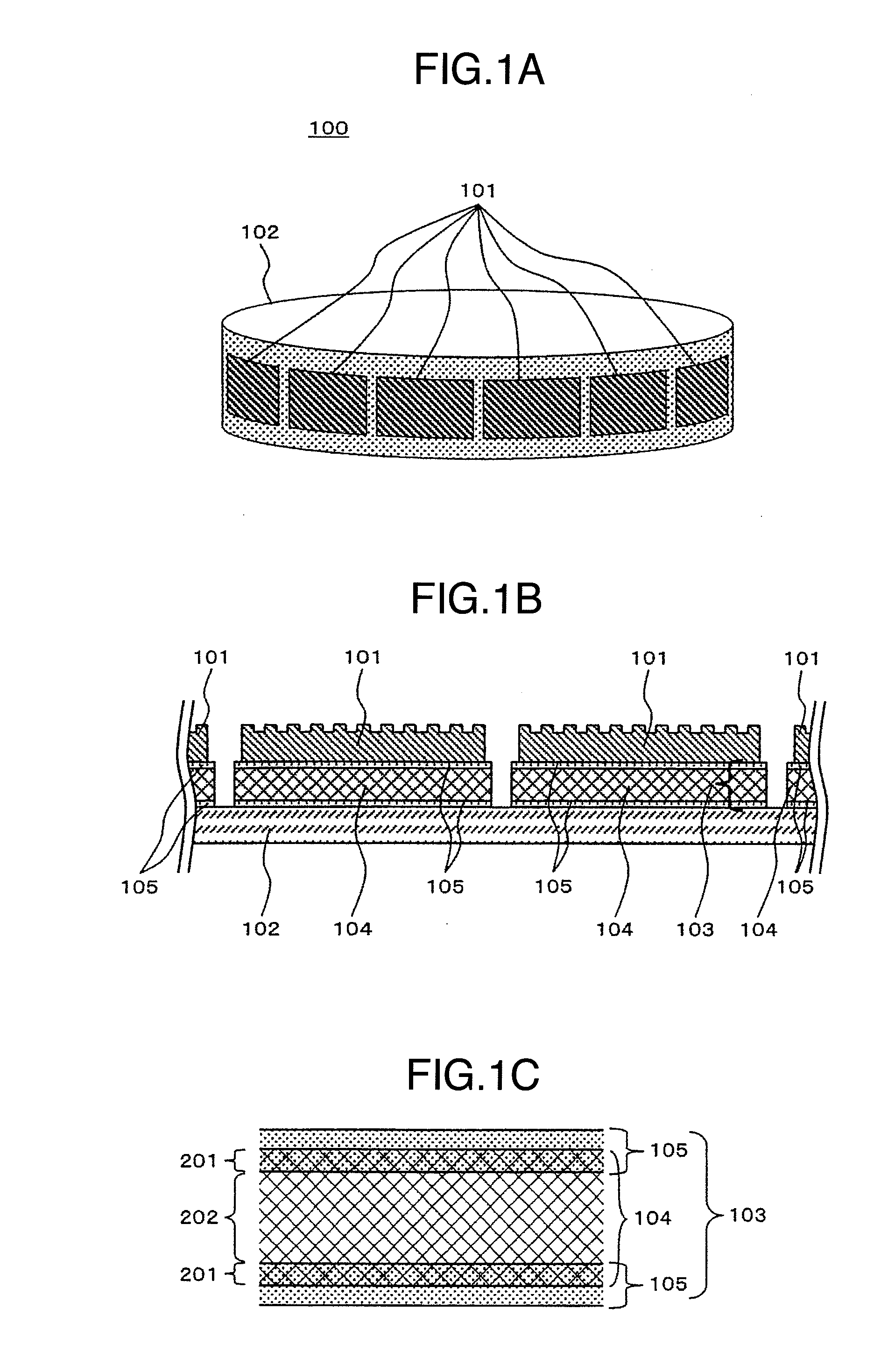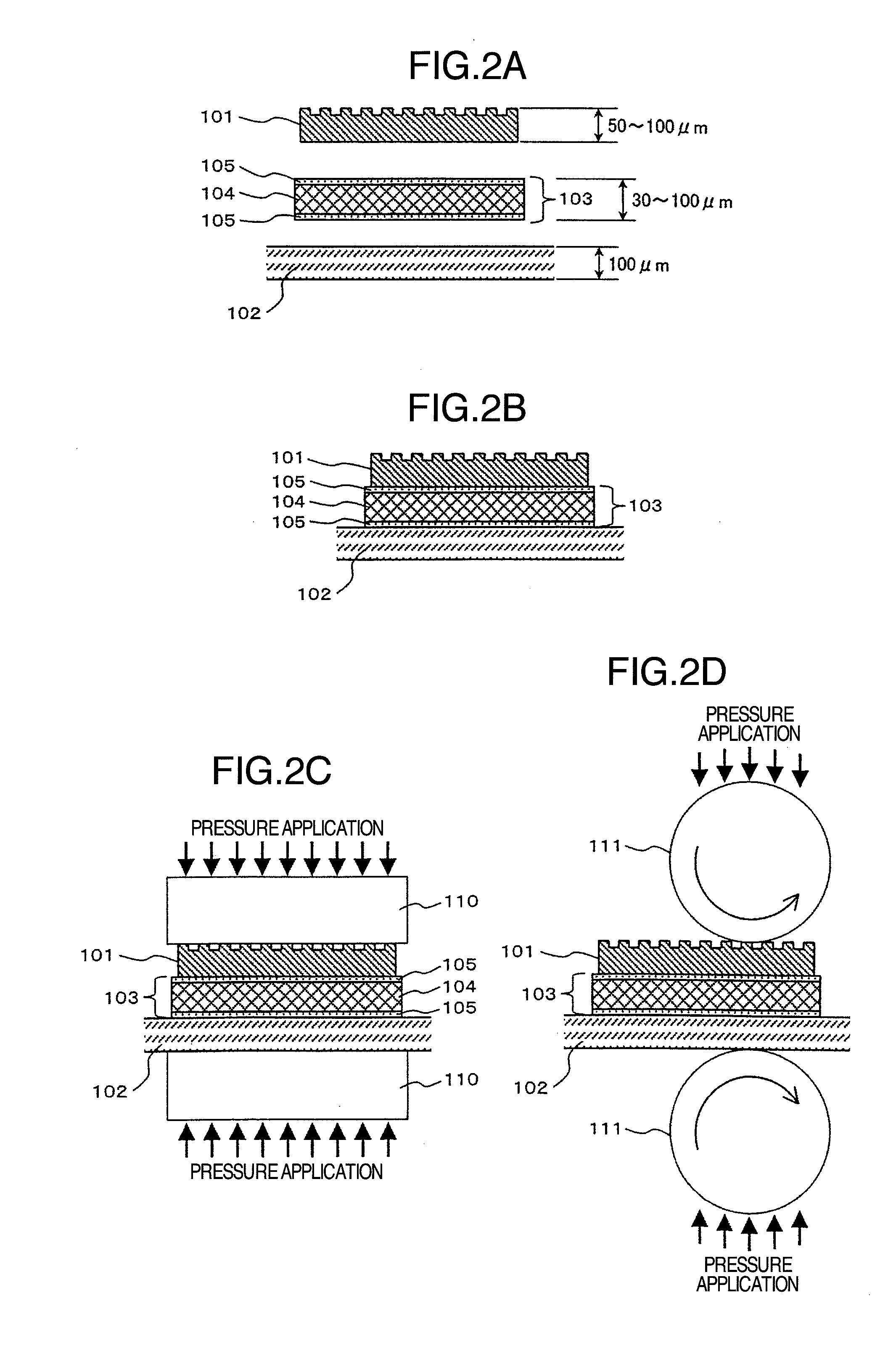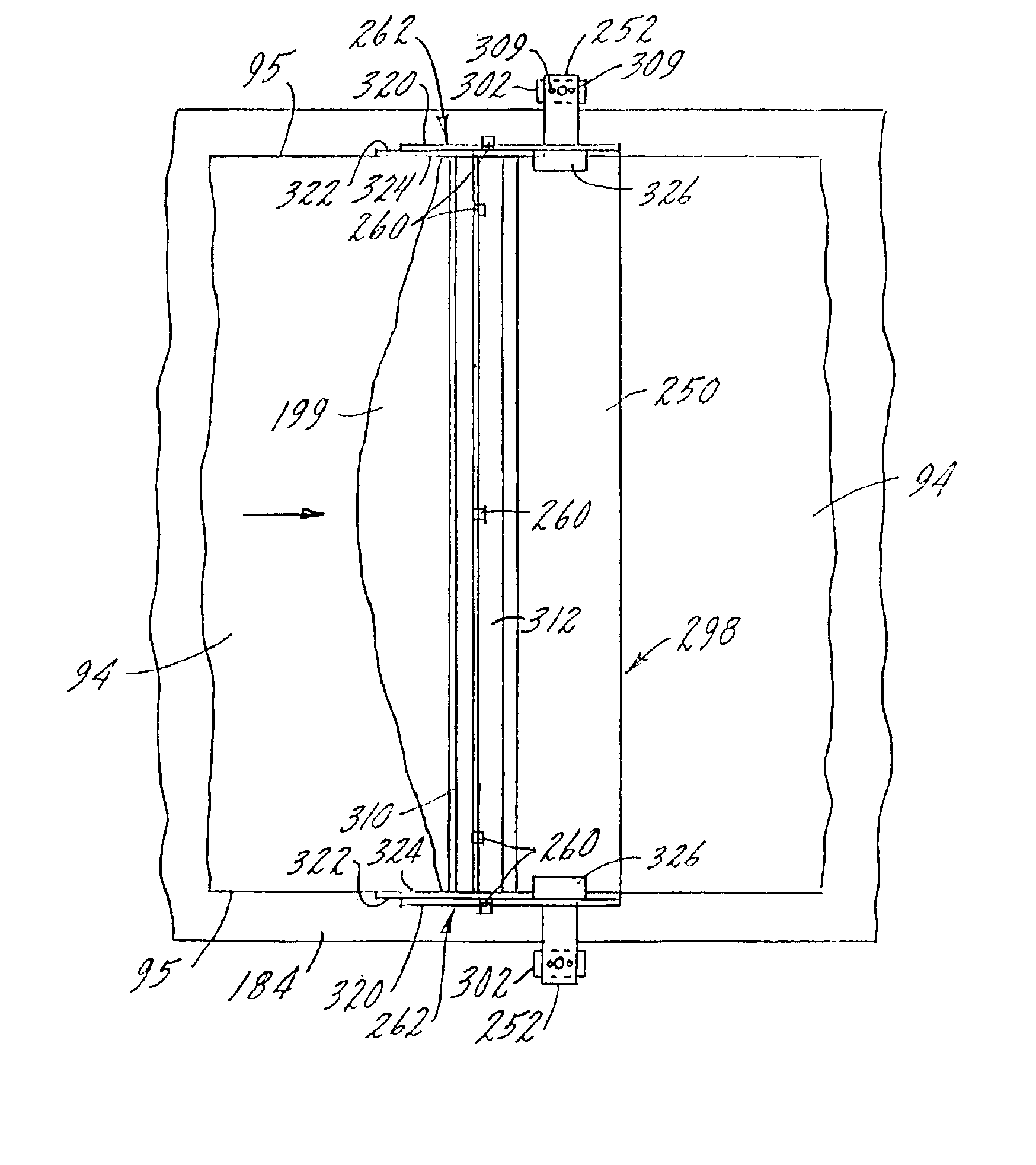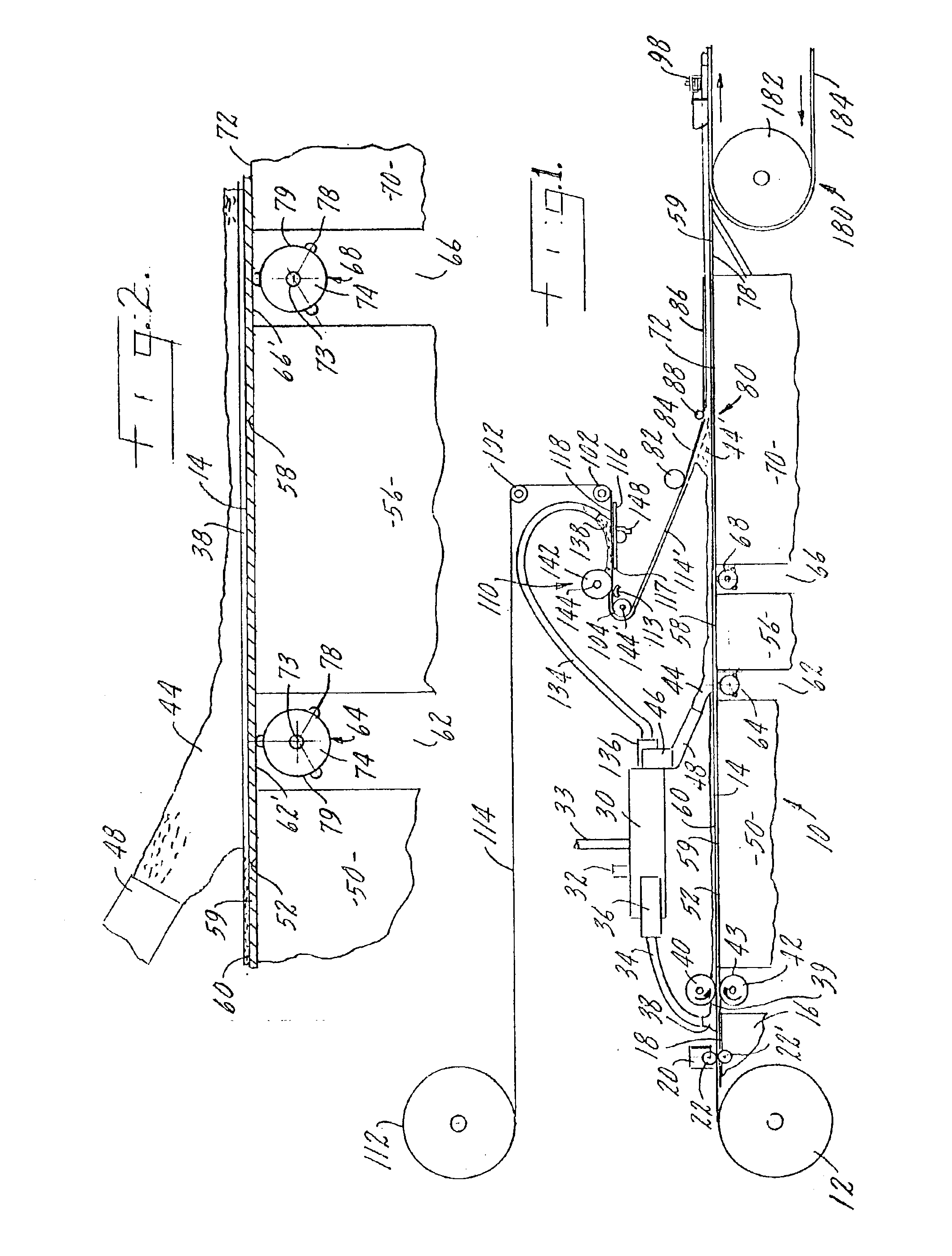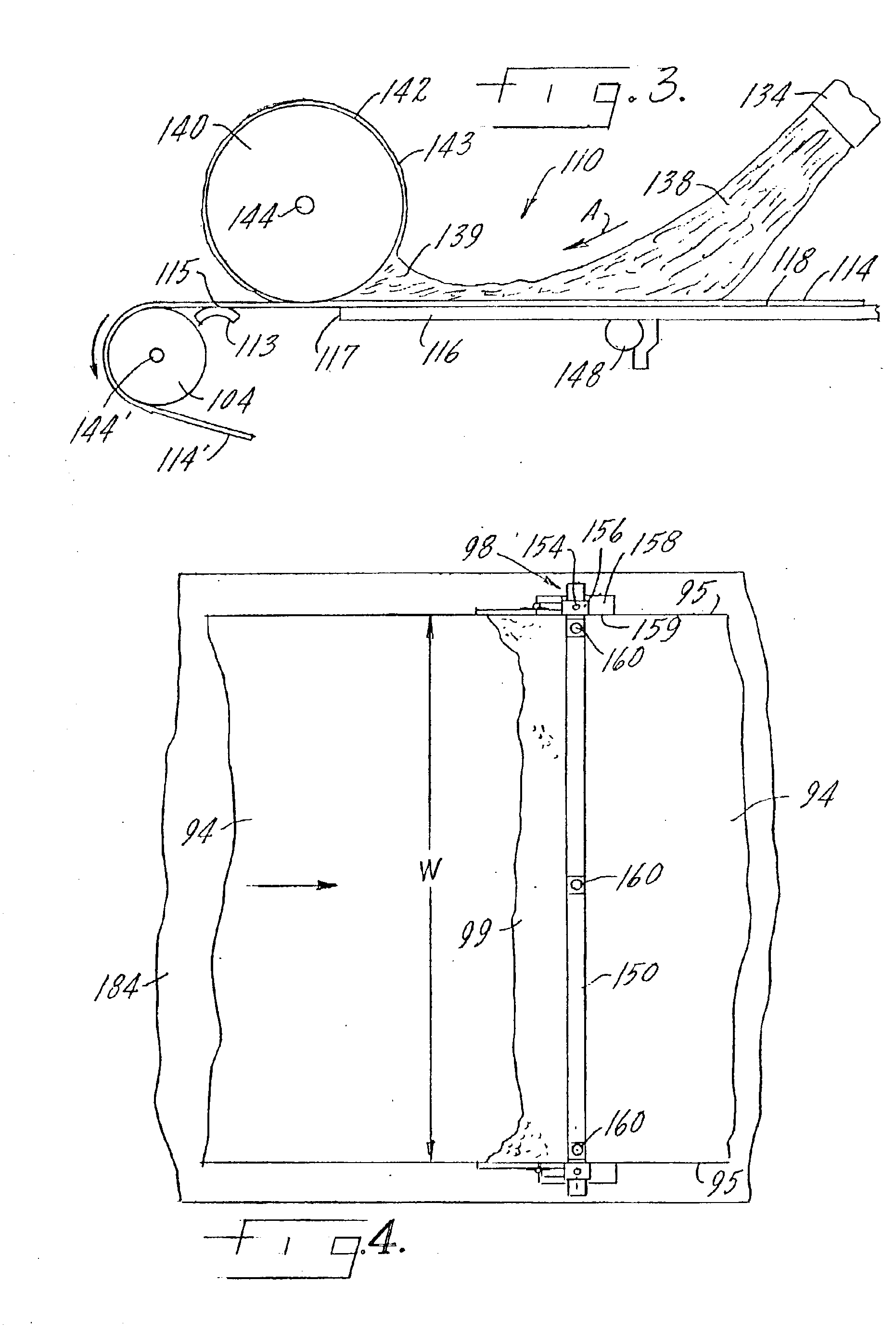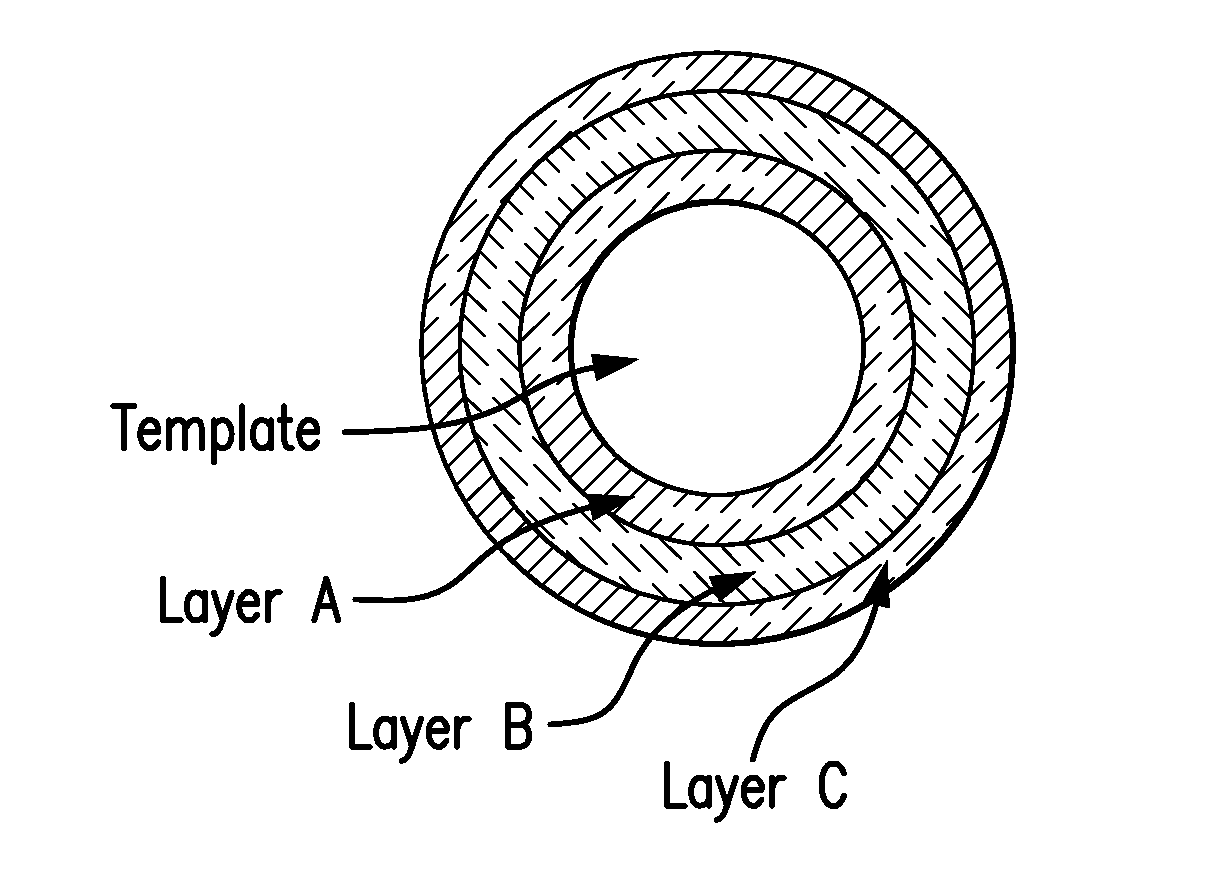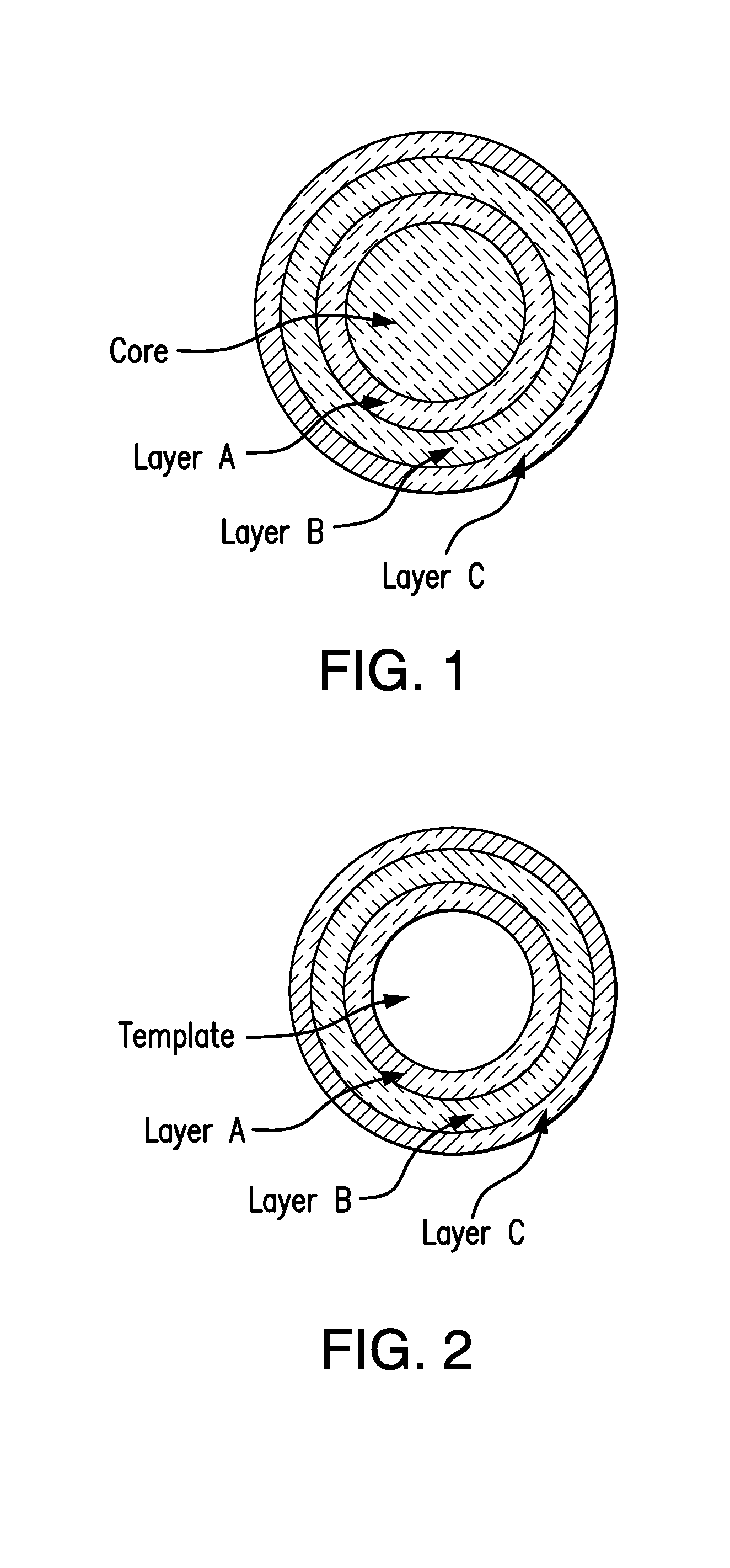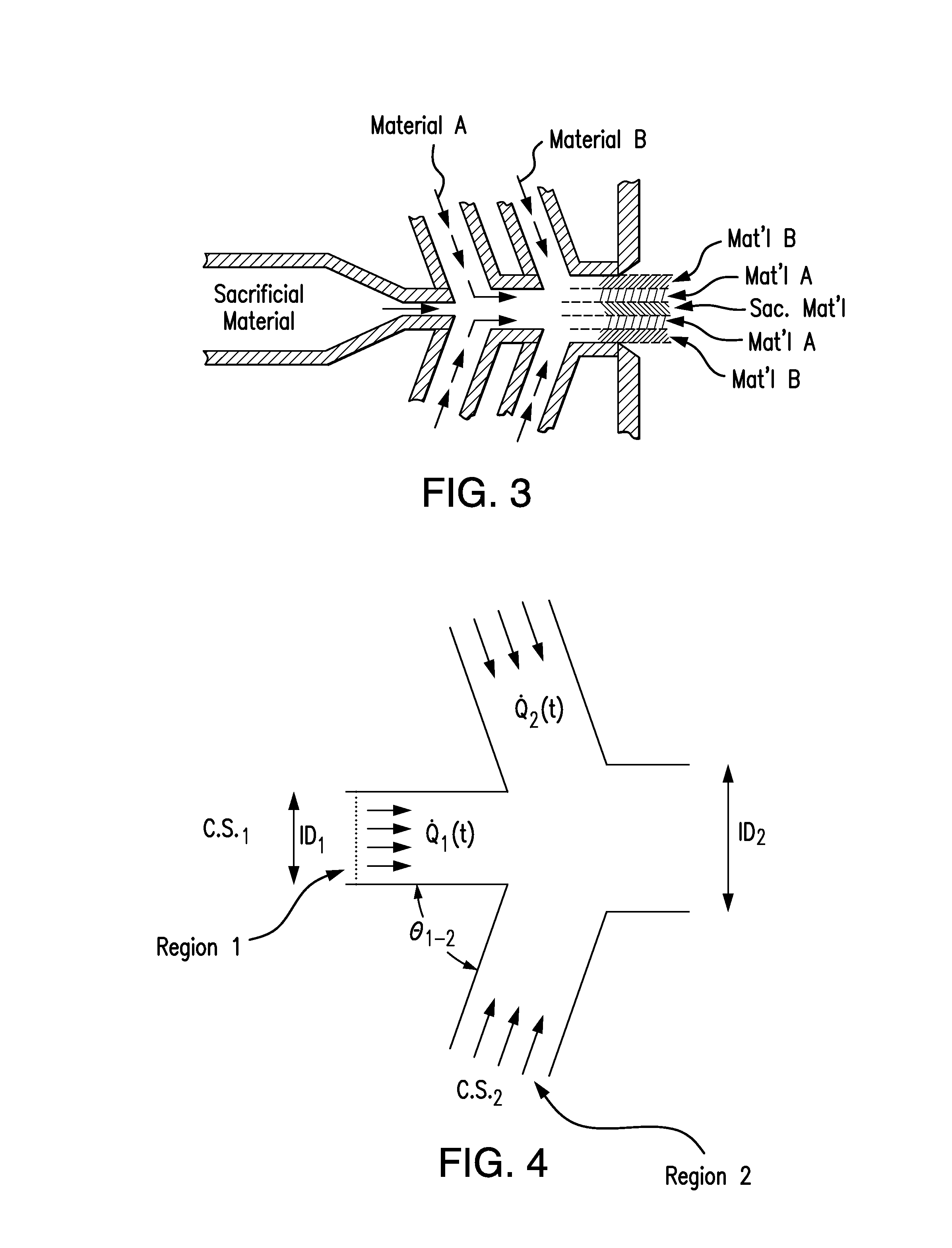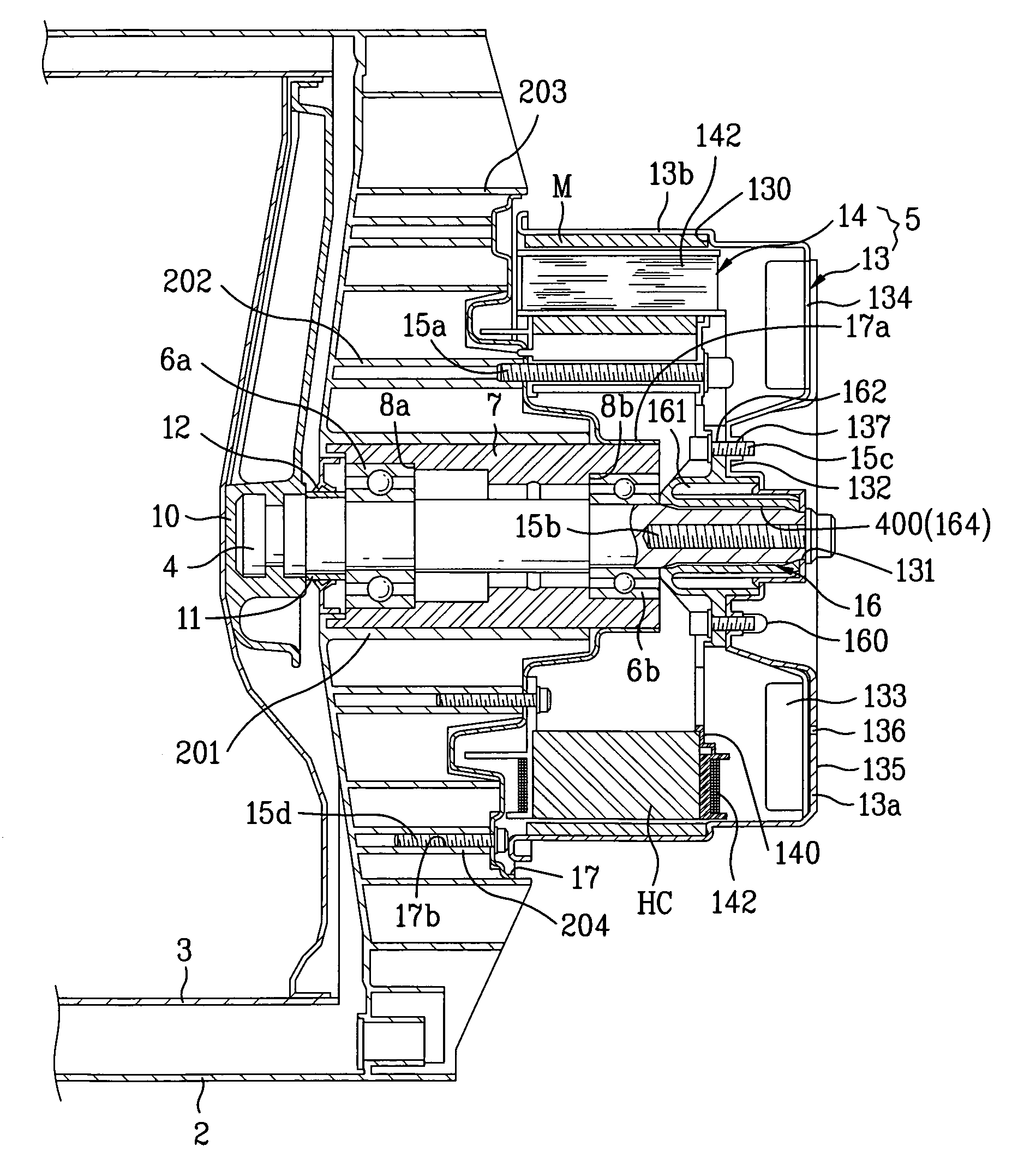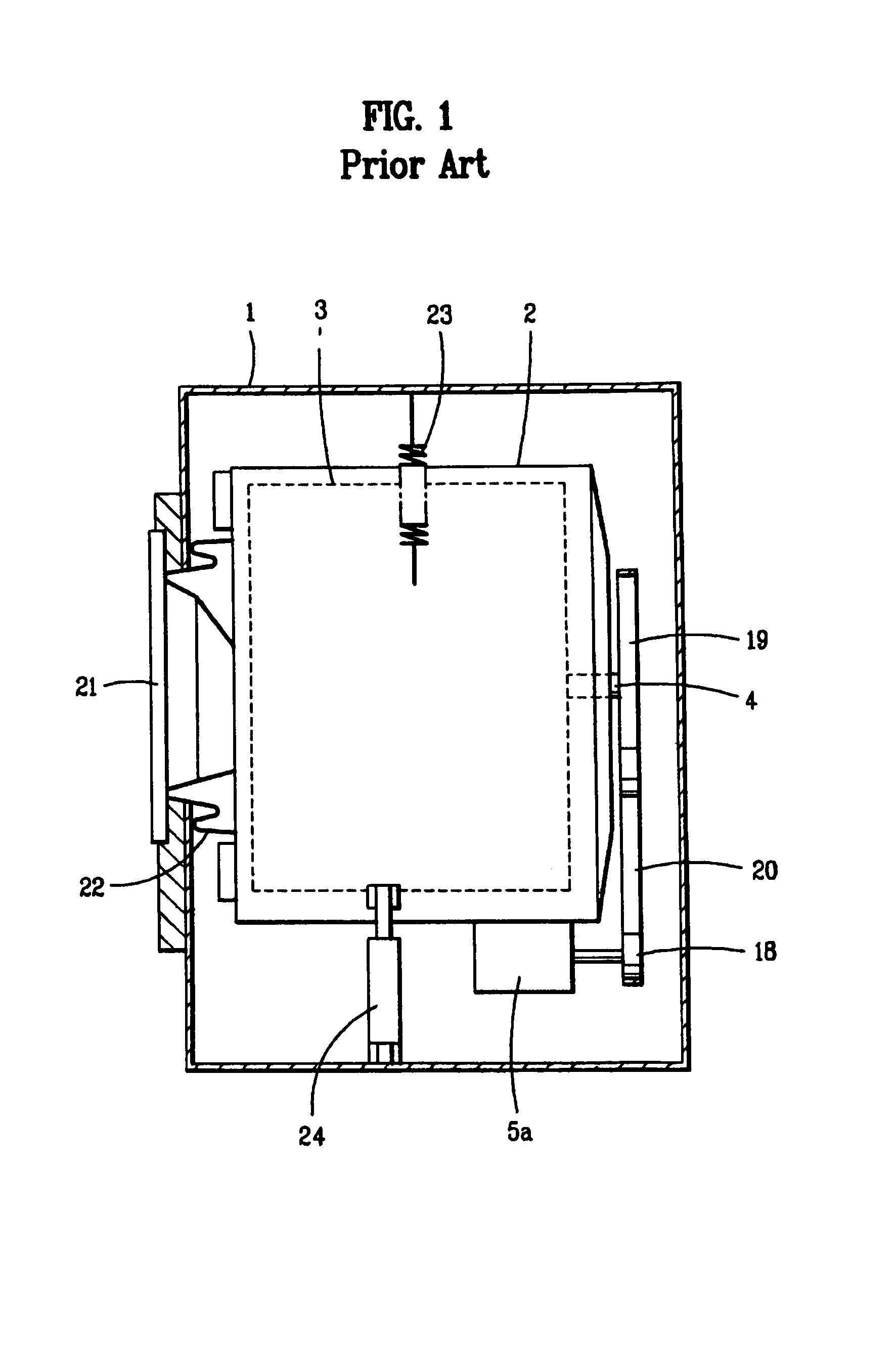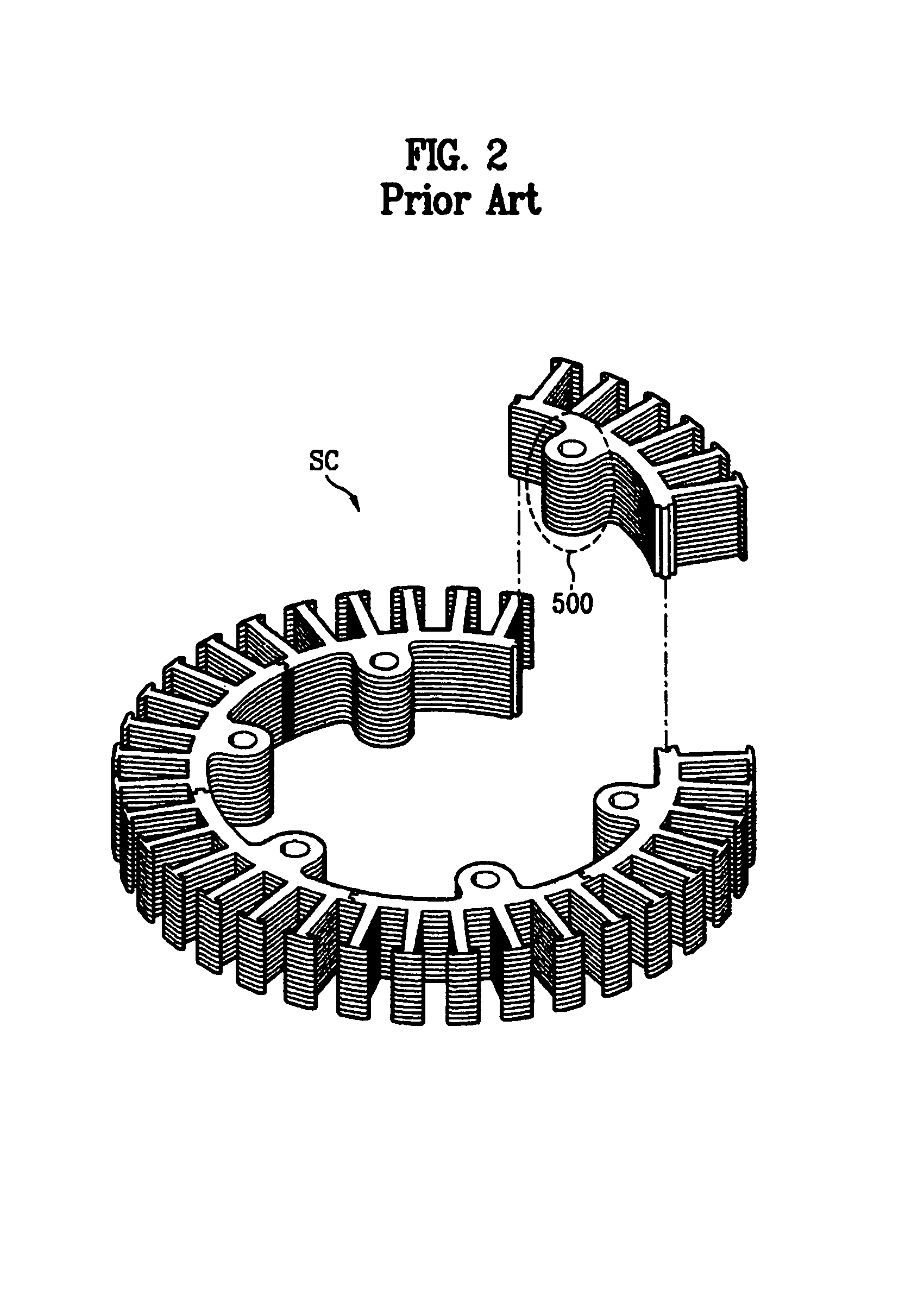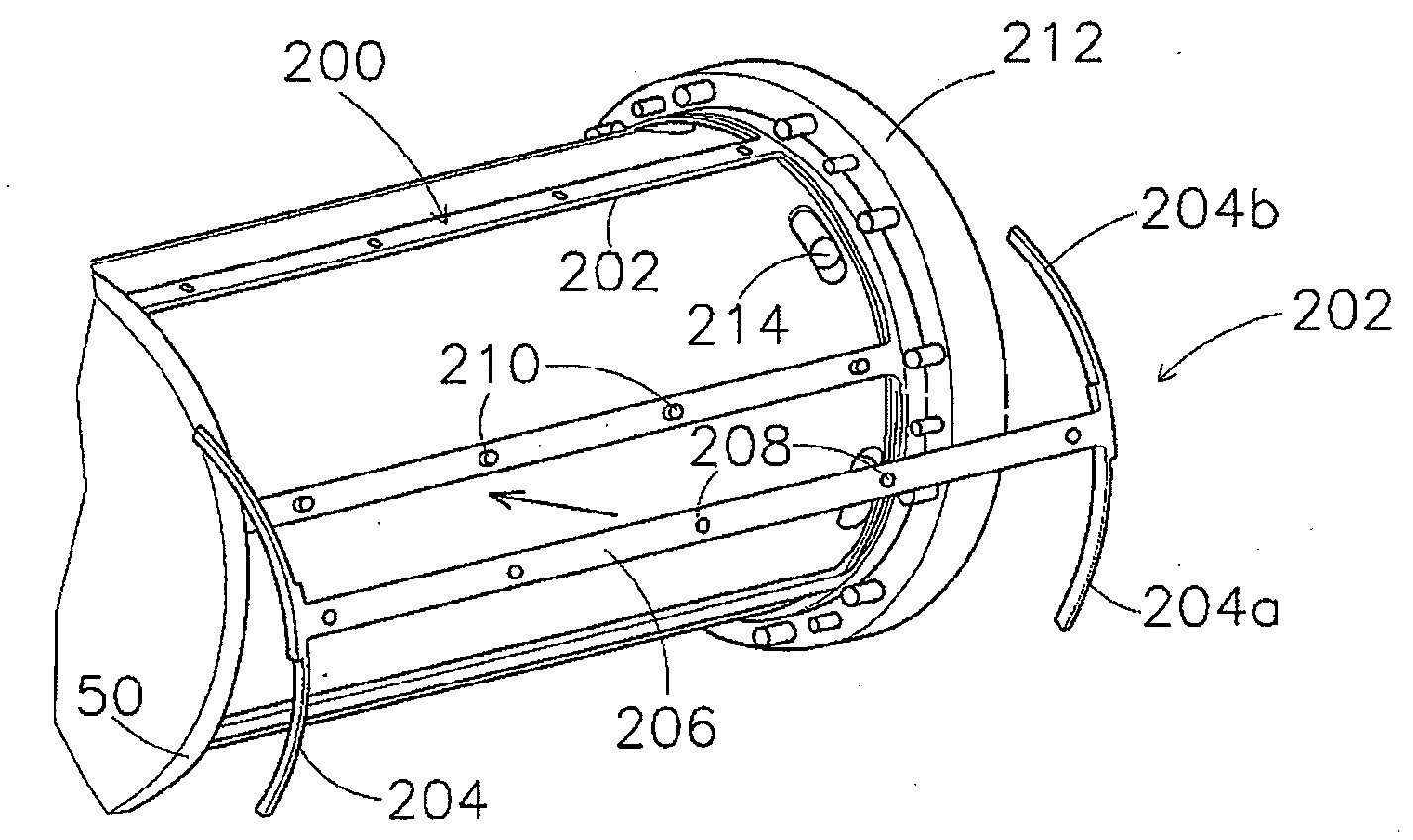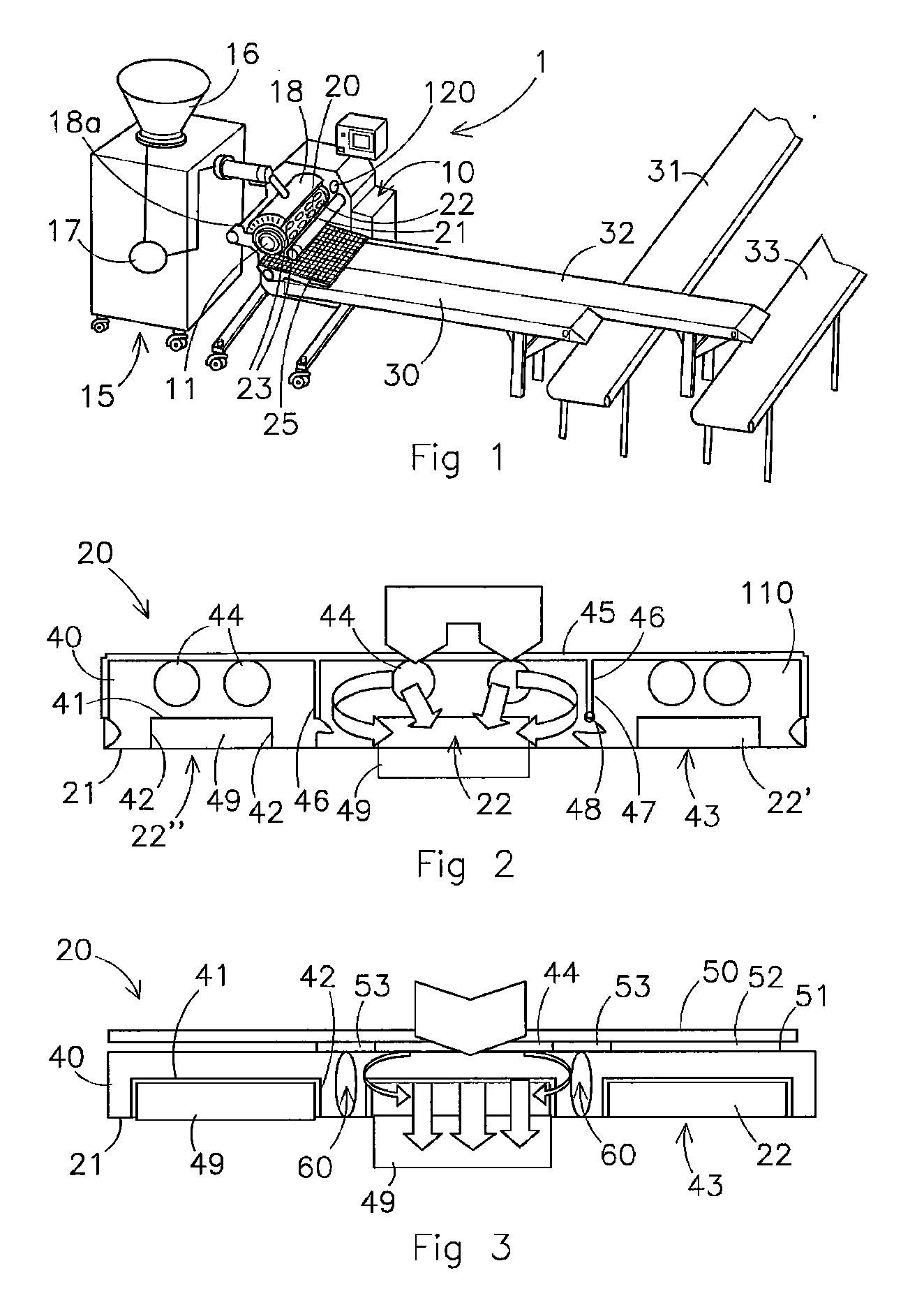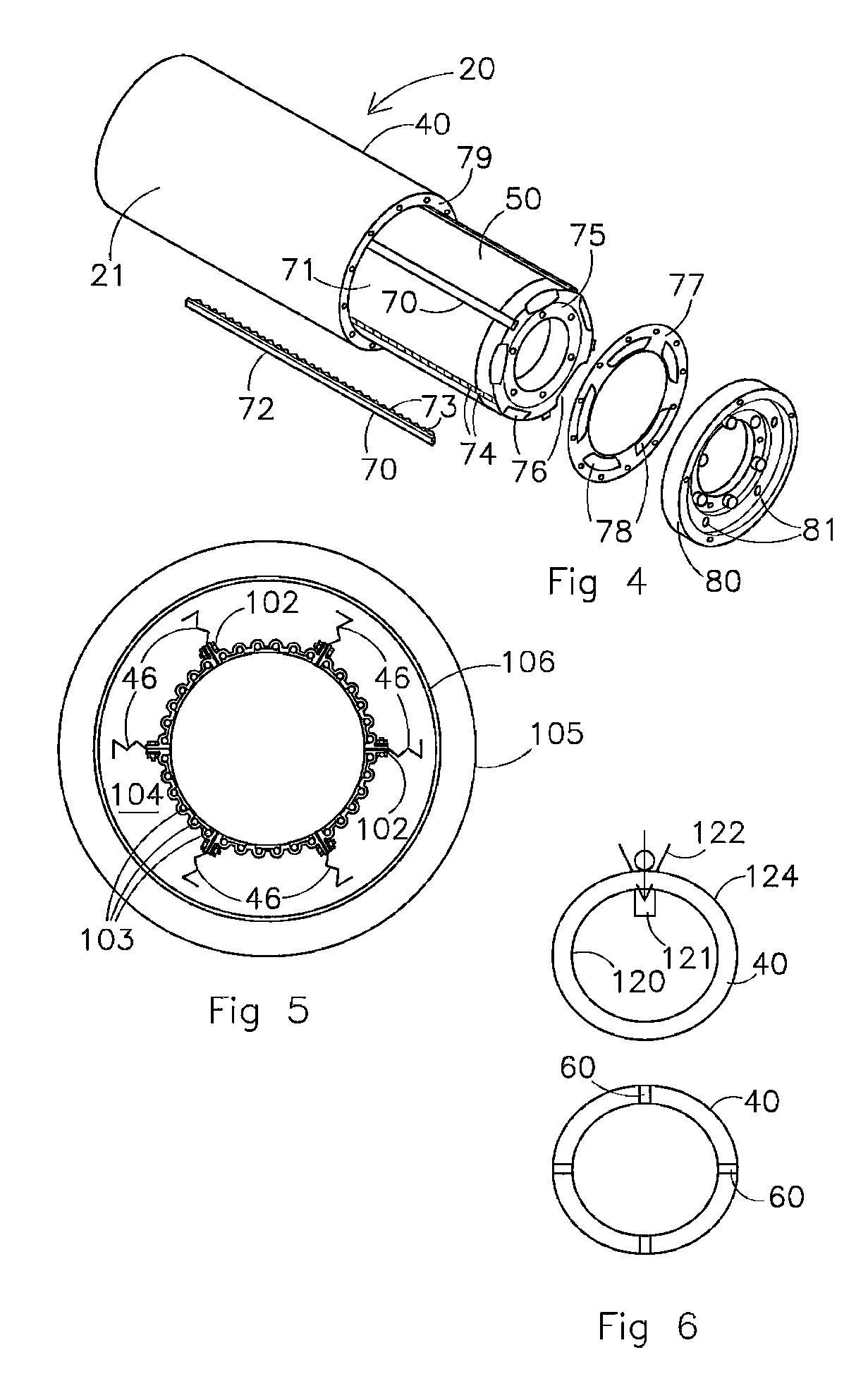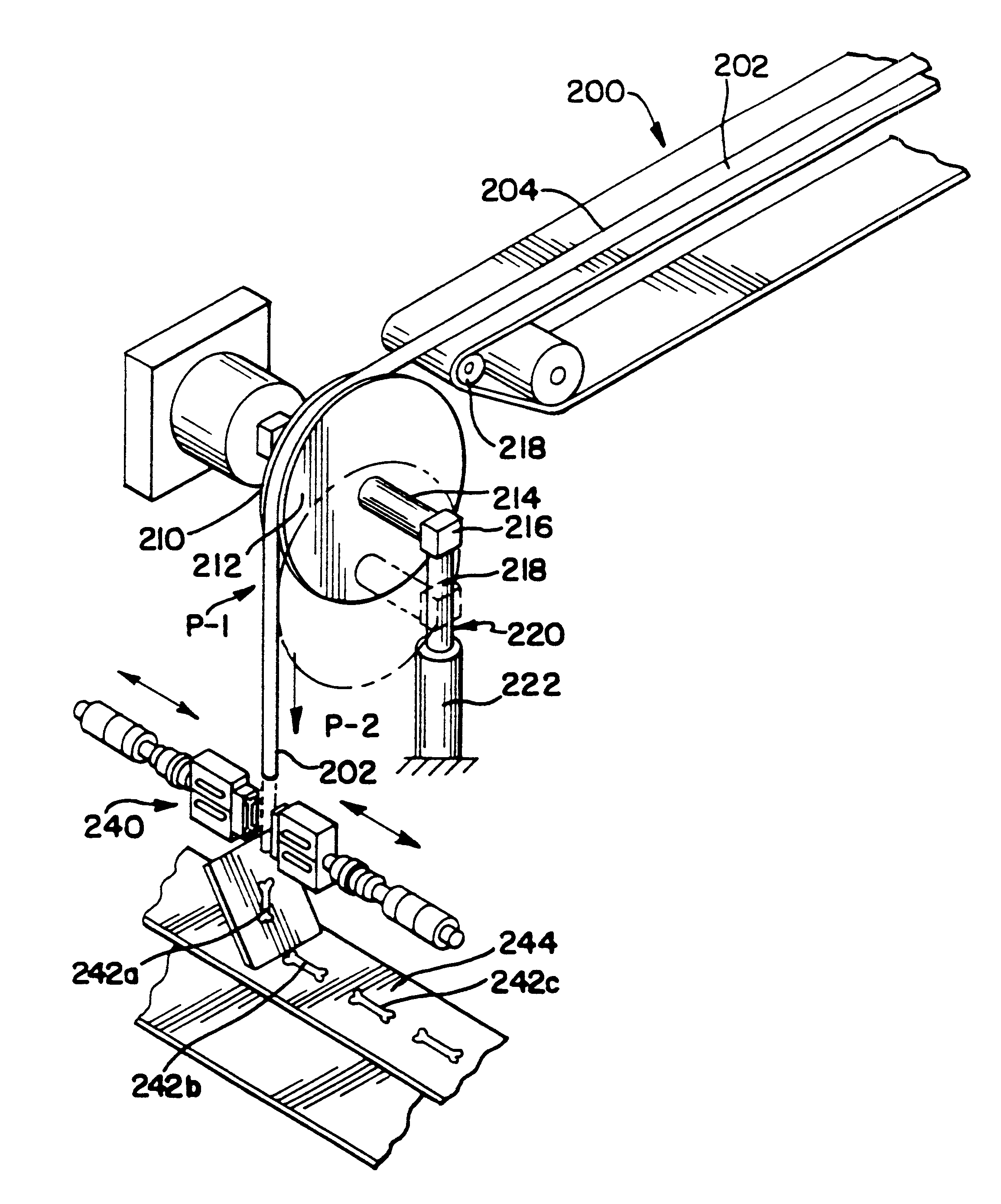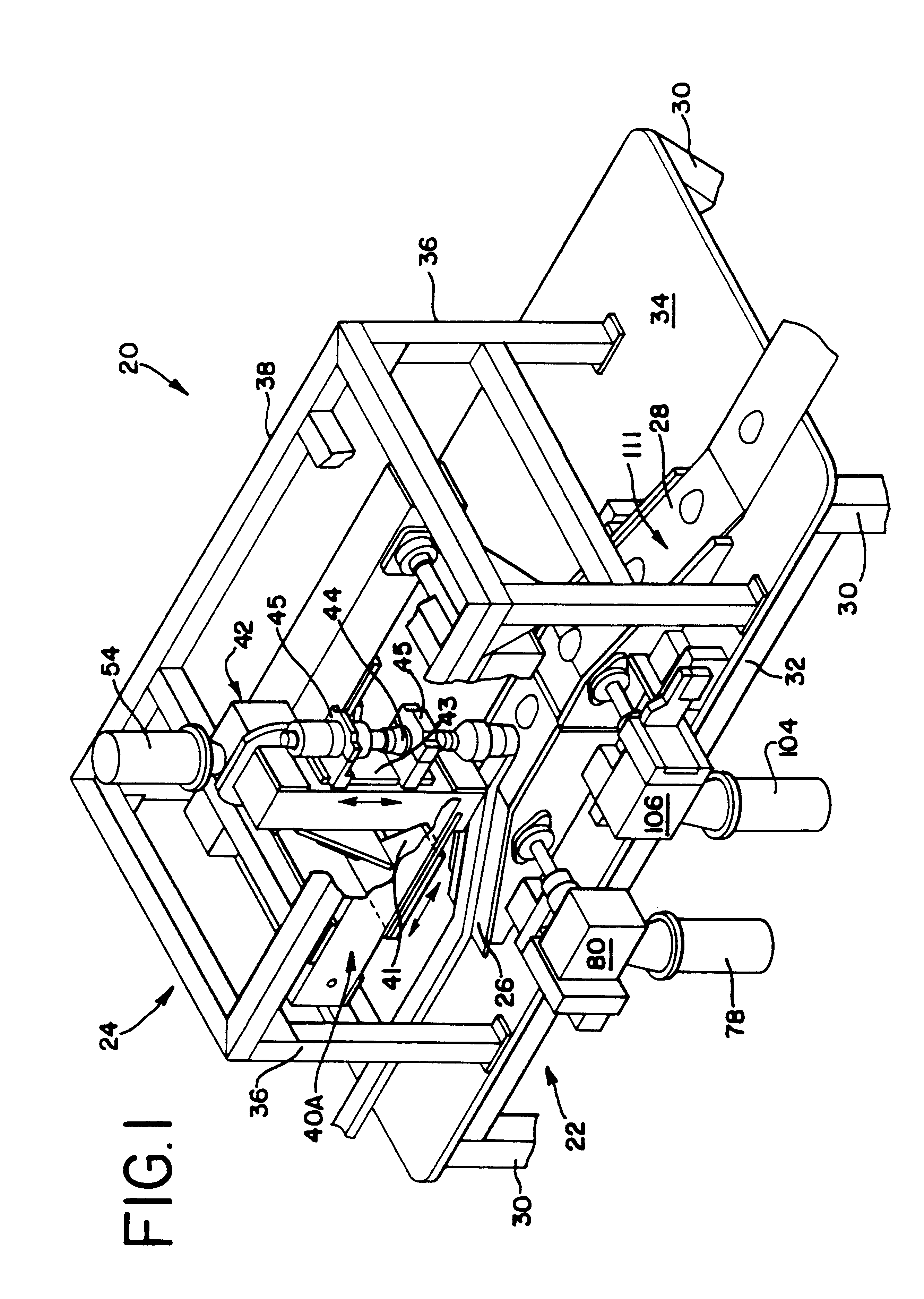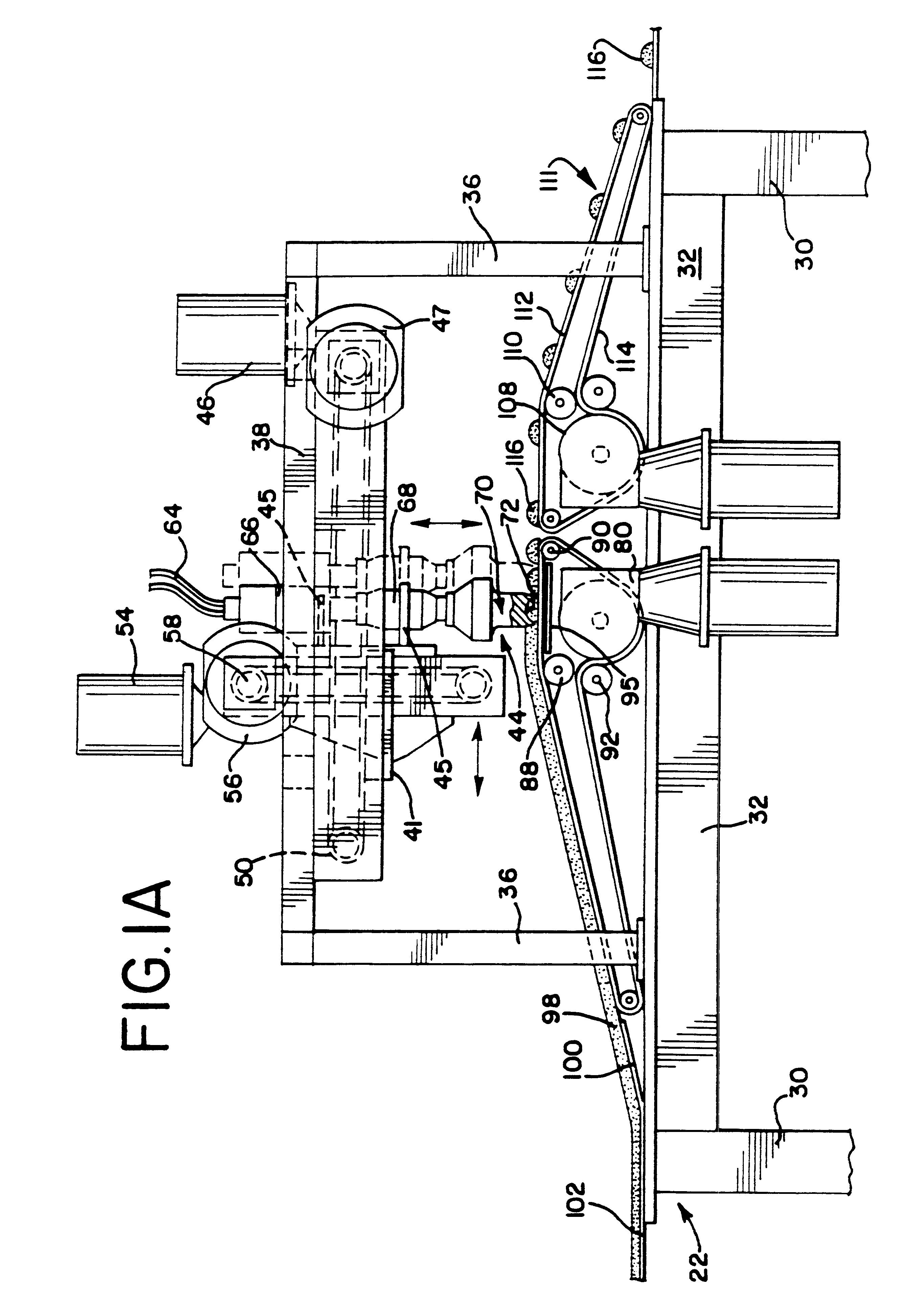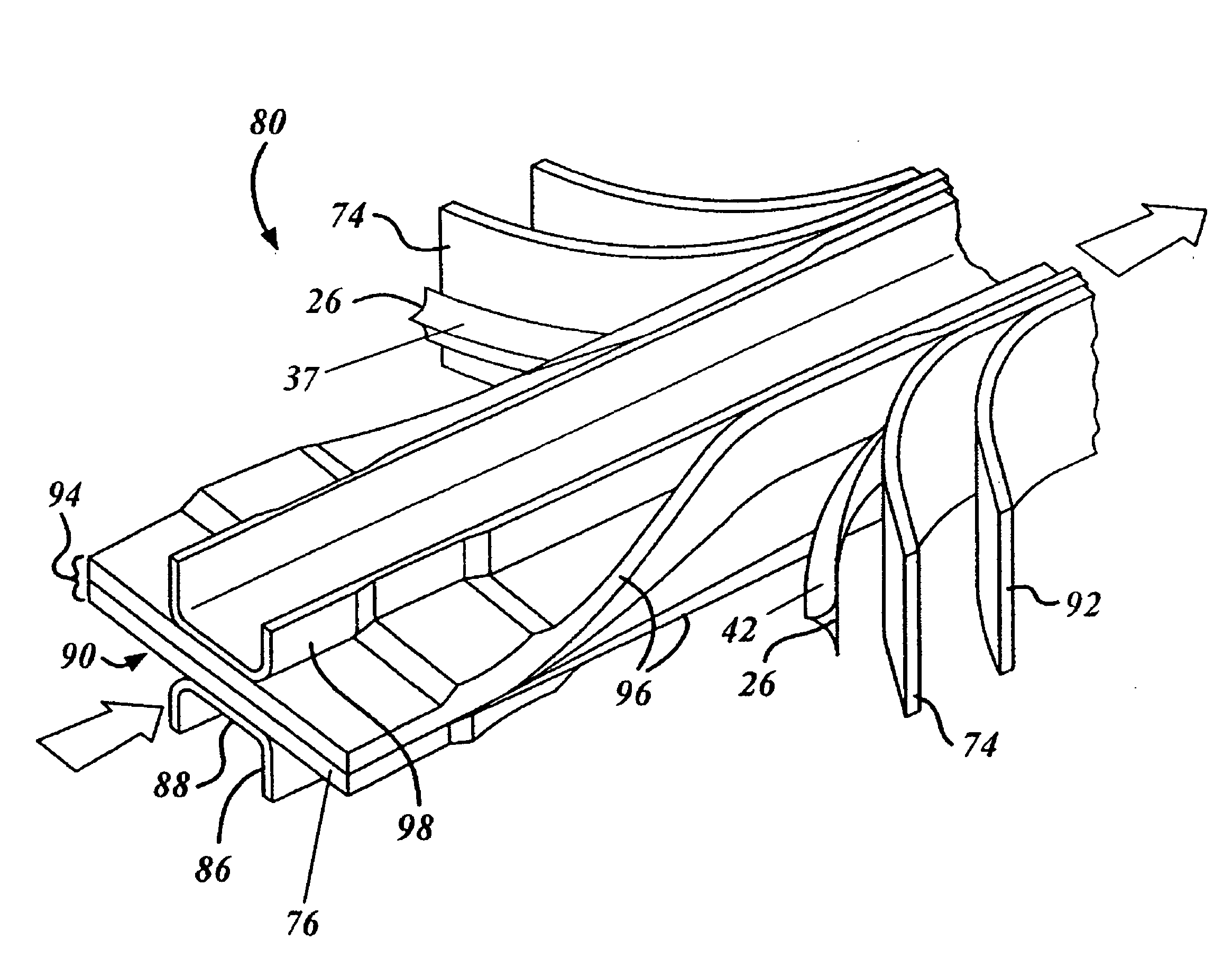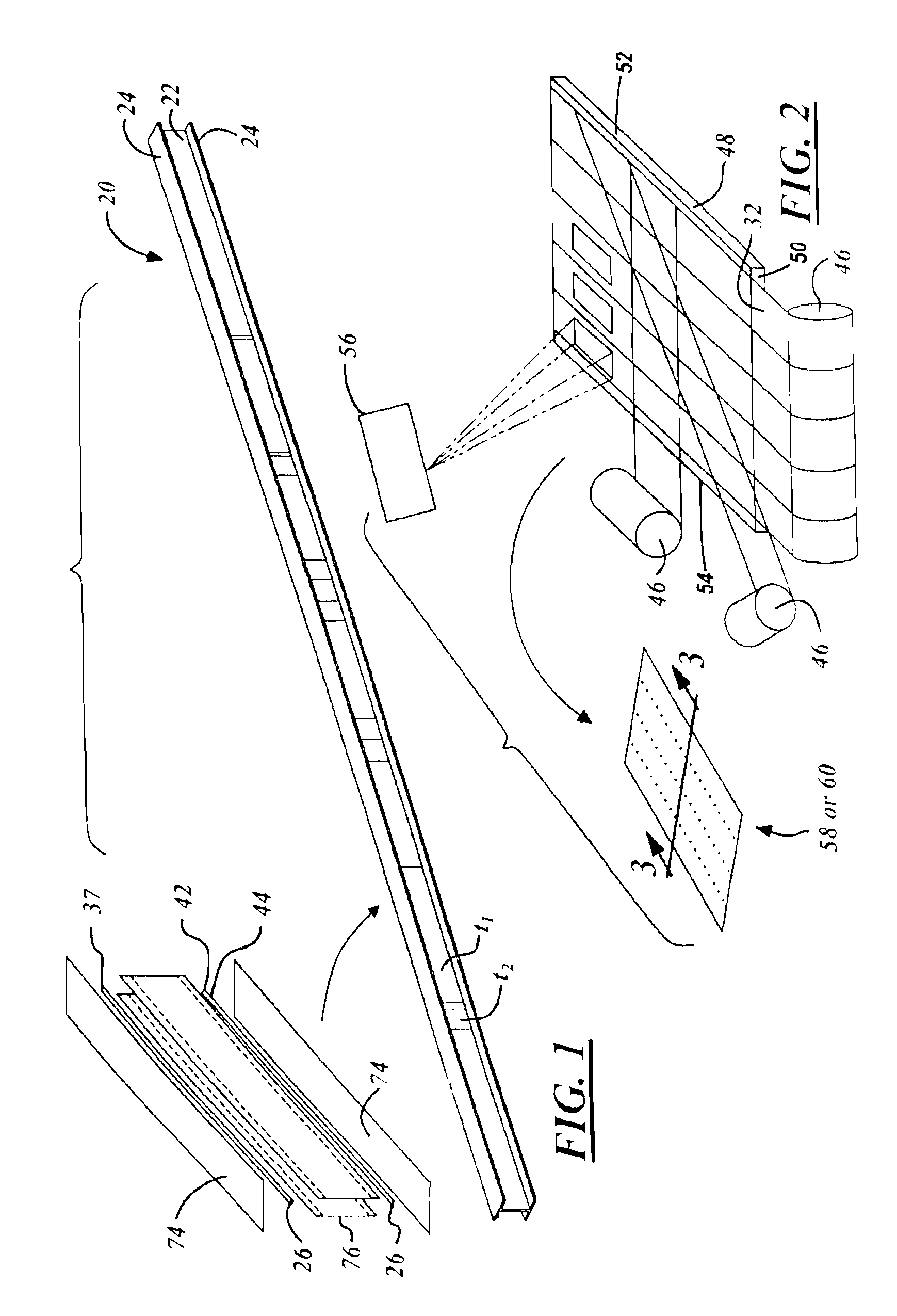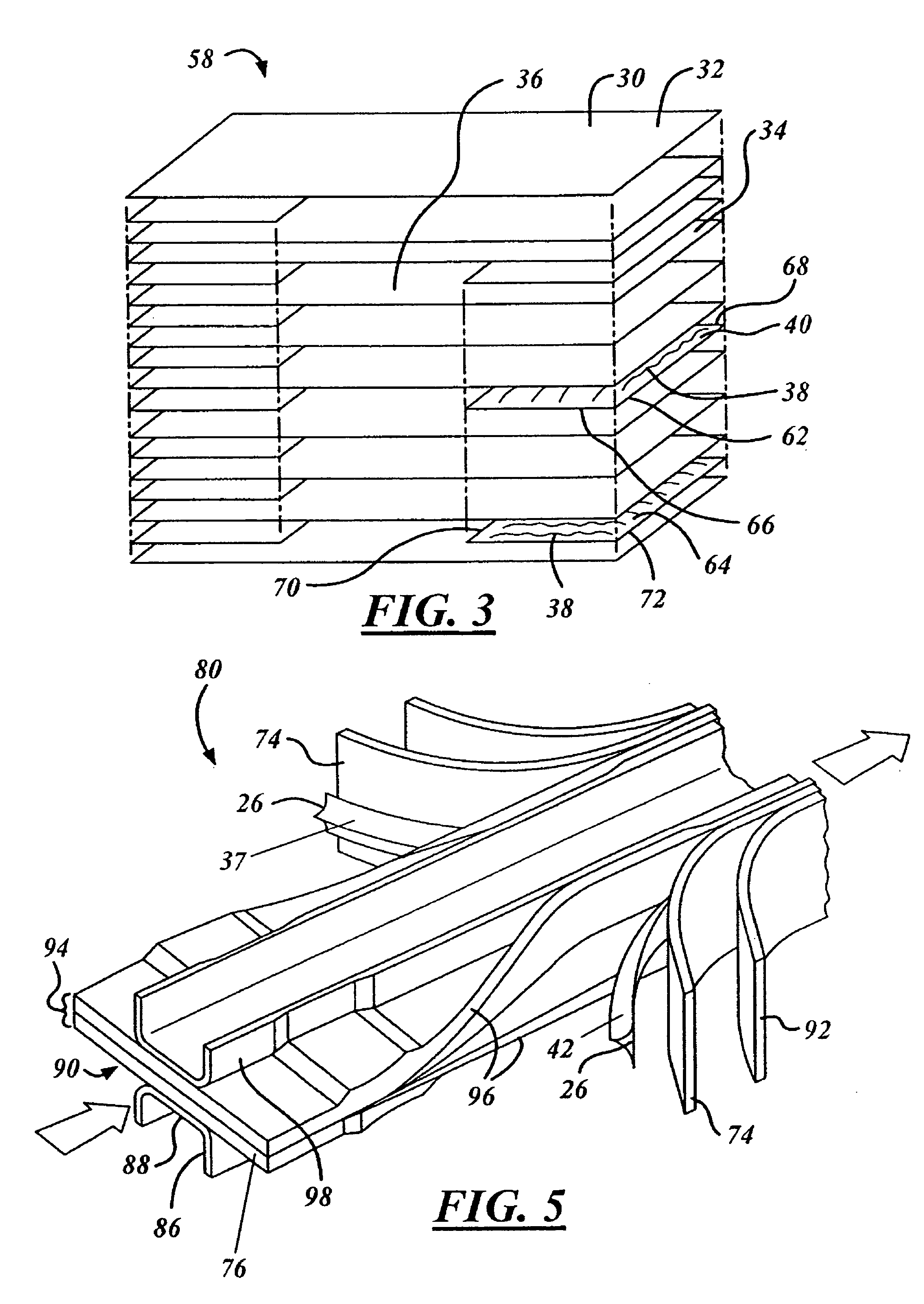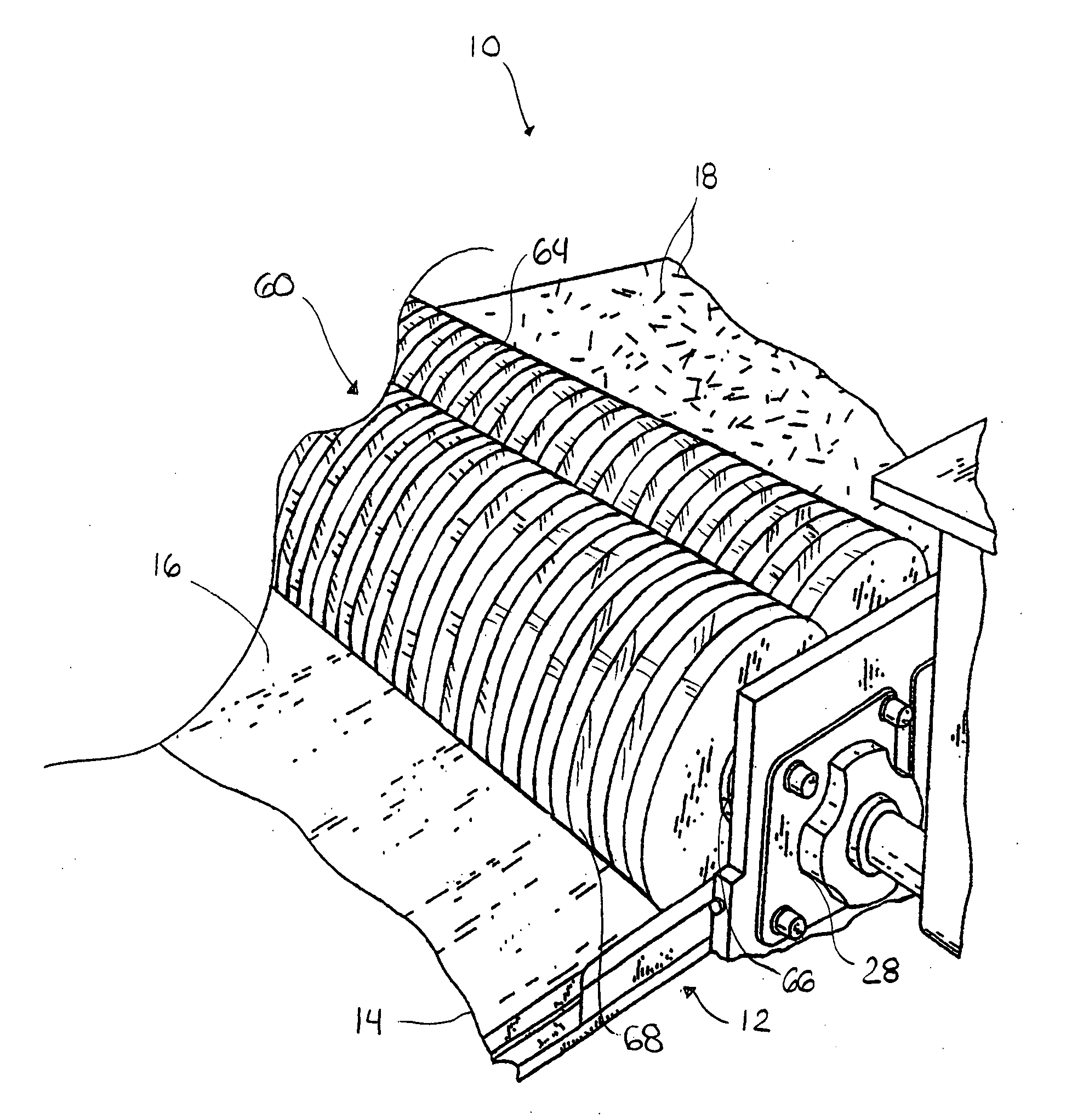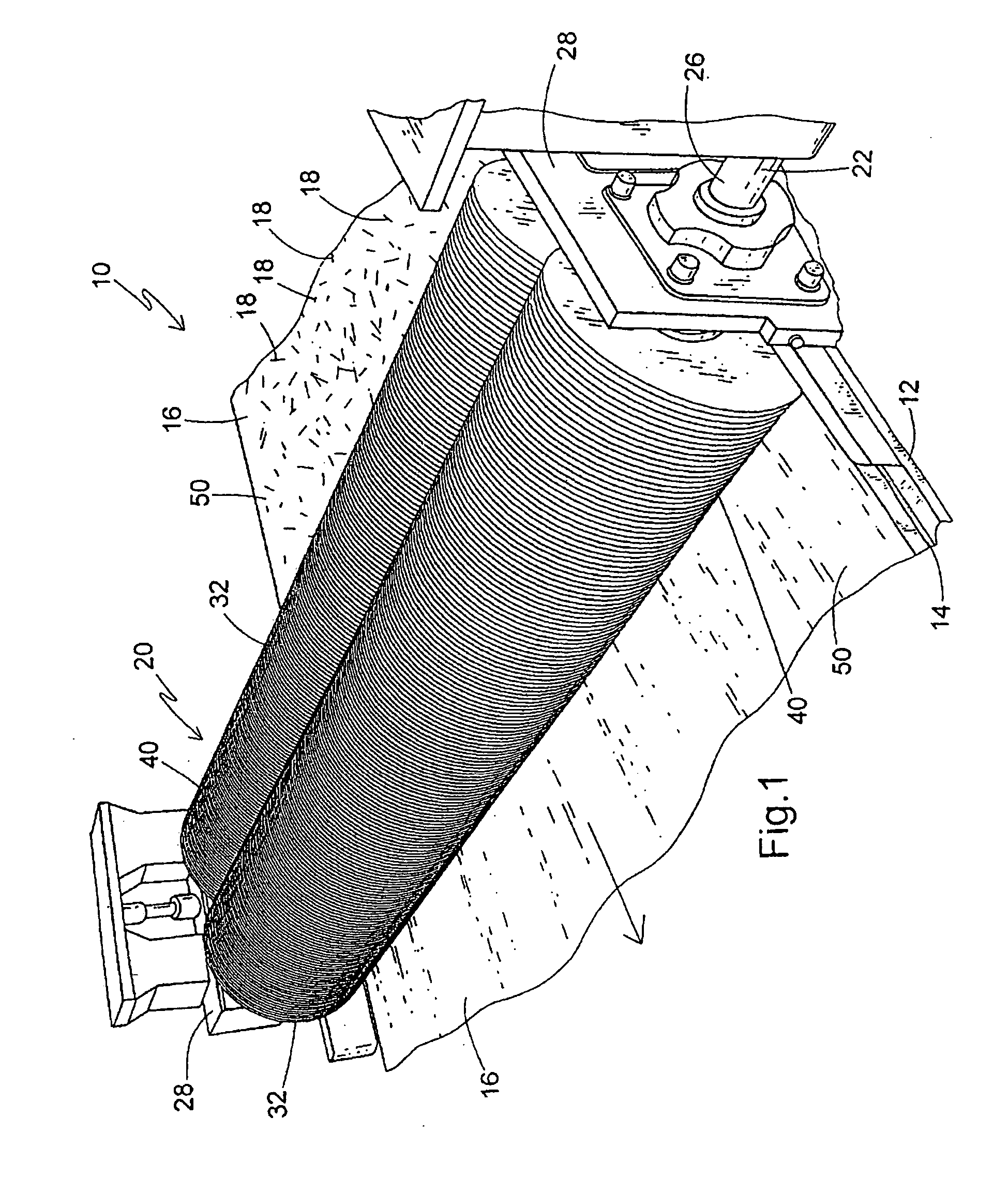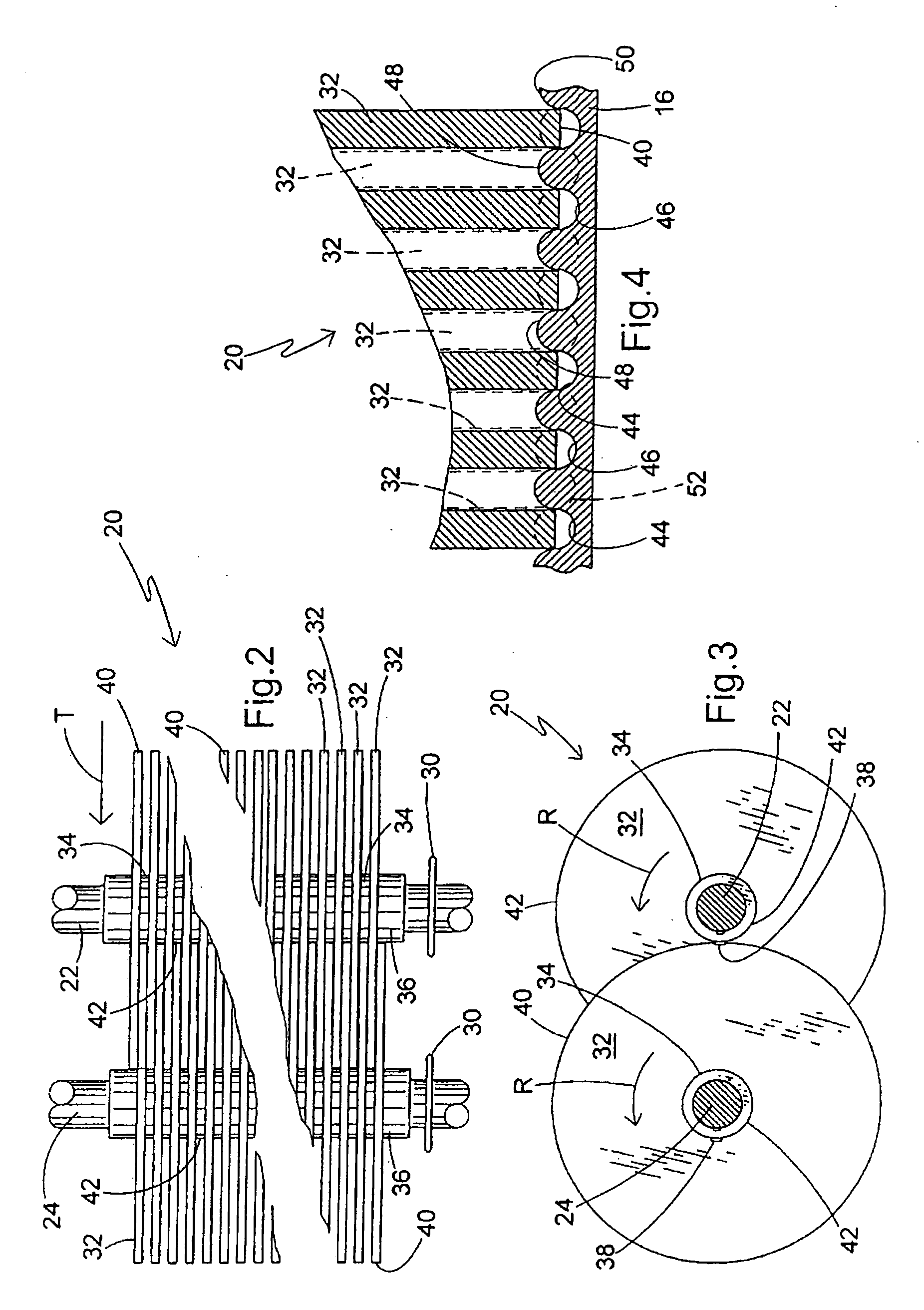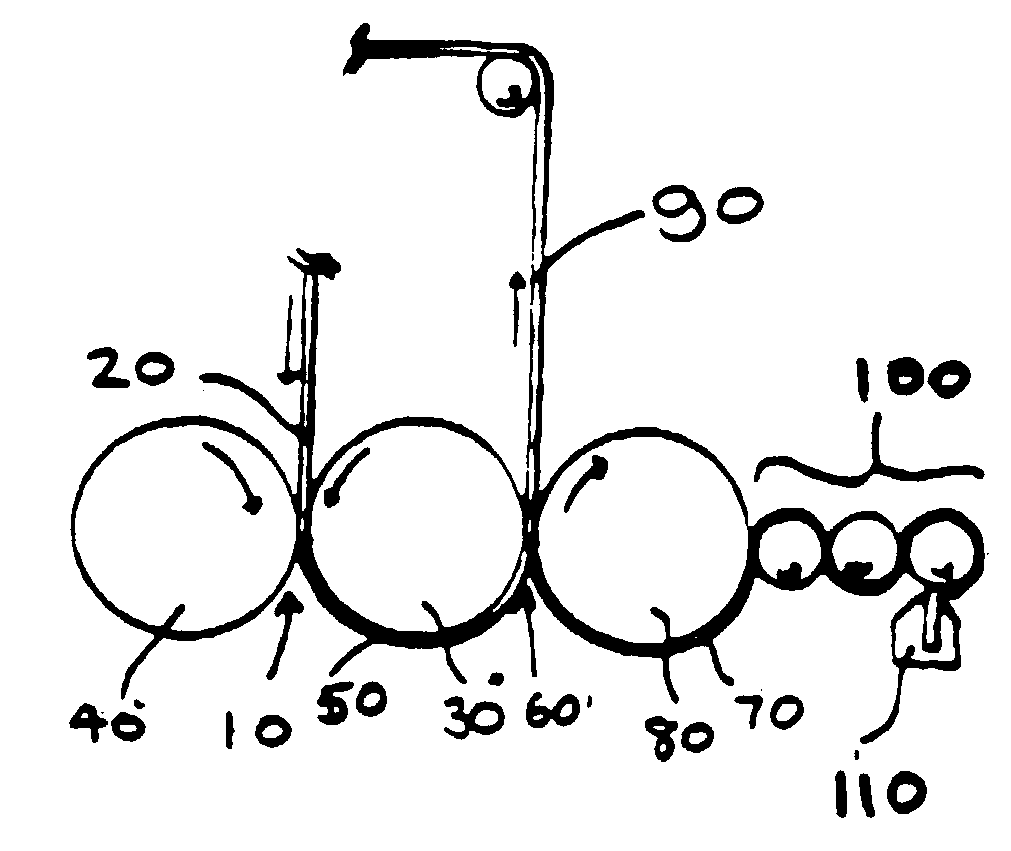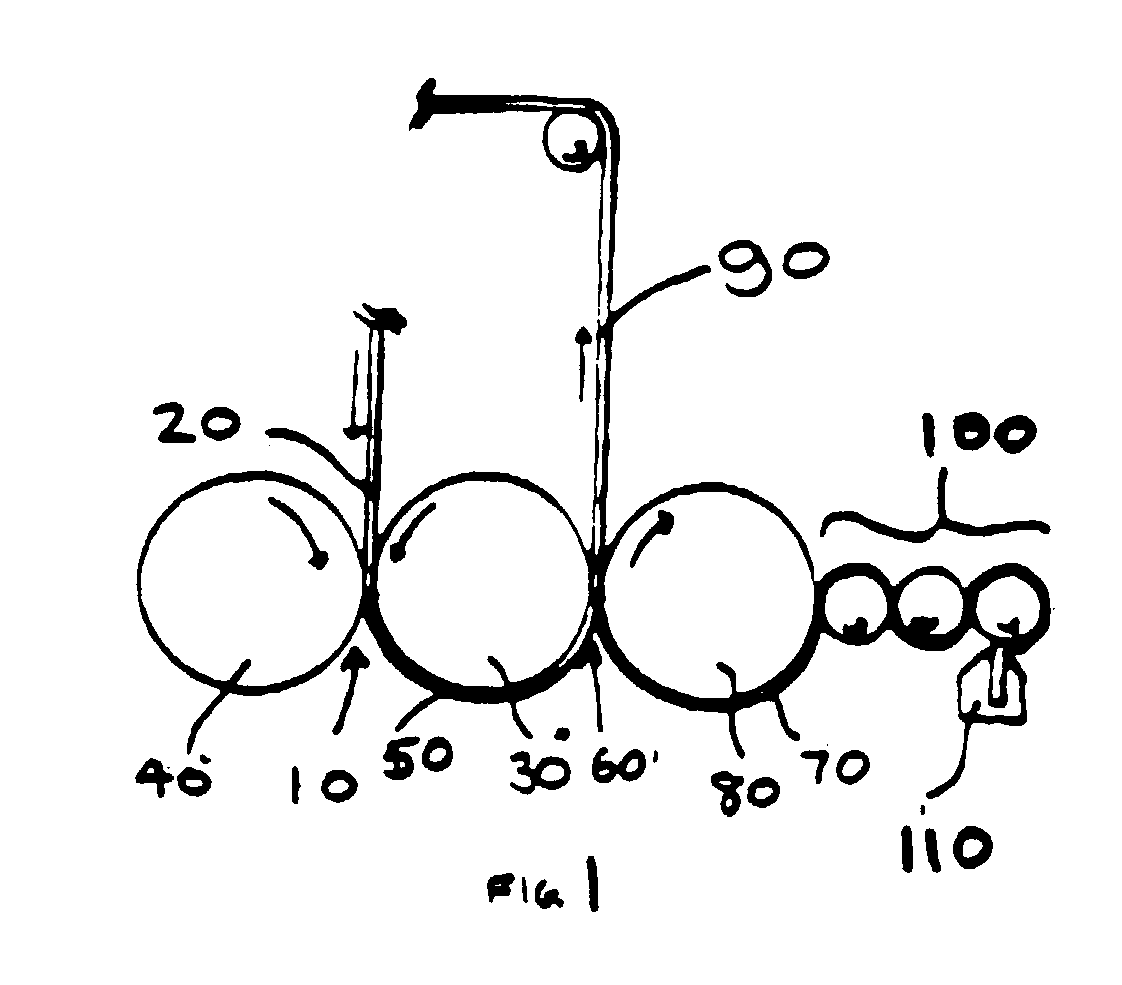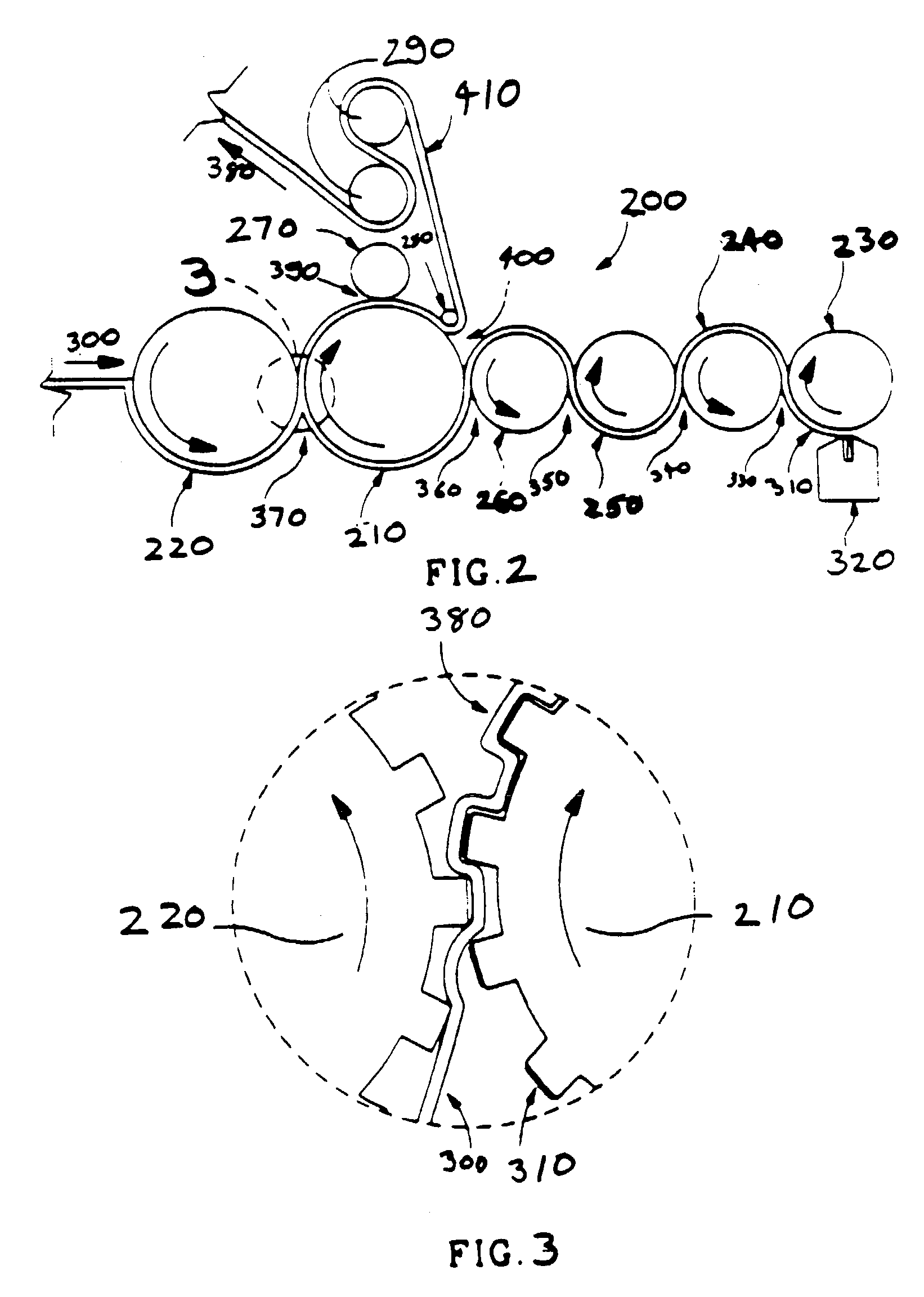Patents
Literature
1156results about "Press rollers" patented technology
Efficacy Topic
Property
Owner
Technical Advancement
Application Domain
Technology Topic
Technology Field Word
Patent Country/Region
Patent Type
Patent Status
Application Year
Inventor
Tufted fibrous web
A fibrous web having a first surface and a second surface. The fibrous web has a first region and at least one discrete second region, the second region being a discontinuity on the second surface and being a tuft comprising a plurality of tufted fibers extending from the first surface. The tufted fibers define a distal portion, the distal portion comprising portions of the tufted fibers being bonded together. Bonding can be thermal melt-bonding. In another embodiment the second surface of the web can have non-intersecting or substantially continuous bonded regions, which also can be thermal melt-bonding.
Owner:PROCTER & GAMBLE CO
Tufted fibrous web
A fibrous web having a first surface and a second surface. The fibrous web has a first region and at least one discrete second region, the second region being a discontinuity on the second surface and being a tuft comprising a plurality of tufted fibers extending from the first surface. The tufted fibers define a distal portion, the distal portion comprising portions of the tufted fibers being bonded together. Bonding can be thermal melt-bonding. In another embodiment the second surface of the web can have non-intersecting or substantially continuous bonded regions, which also can be thermal melt-bonding.
Owner:THE PROCTER & GAMBLE COMPANY
Device and process for treating flexible web by stretching between intermeshing forming surfaces
InactiveUS20060151914A1Increase flexibilityWidely vary degree of stretchDough-sheeters/rolling-machines/rolling-pinsConfectioneryPersonal Care ProductBiomedical engineering
A series of nips (200, 202, 204, 412, 414) formed by intermeshing grooves (22, 24, 26, 28) provides for a higher degree of stretch, particularly for lightweight webs (100) by stretching in stages in multiple grooved nips. The ability to adjust the degree of stretch at each nip can provide a high degree and variability of stretch with reduced web damage compared to a single step application of the same stretch. Improvements to the manufacture of lightweight components of personal care products such as diaper backing components are obtained.
Owner:KIMBERLY-CLARK WORLDWIDE INC
Methods for the manufacture of sheets having a highly inorganically filled organic polymer matrix
Compositions and methods for manufacturing sheets having a highly inorganically filled matrix. Suitable inorganically filled mixtures are prepared by mixing together an organic polymer binder, water, one or more inorganic aggregate materials, fibers, and optional admixtures in the correct proportions in order to form a sheet which has the desired performance criteria. The inorganically filled mixtures are formed into sheets by first extruding the mixtures and the passing the extruded materials between a set of rollers. The rolled sheets are dried in an accelerated manner to form a substantially hardened sheet, such as by heated rollers and / or a drying chamber. The inorganically filled sheets may have properties substantially similar to sheets presently made from traditional materials like paper, cardboard, polystyrene, plastic, or metal. Such sheets can be rolled, pressed, scored, perforated, folded, and glued. They have especial utility in the mass production of containers, particularly food and beverage containers.
Owner:E KHASHOGGI INDS
Compositions and methods for manufacturing starch-based compositions
Compositions and methods for manufacturing sheets having a starch-bound matrix reinforced with fibers and optionally including an inorganic mineral filler. Suitable mixtures for forming the sheets are prepared by mixing together water, unmodified and ungelatinized starch granules, an auxiliary water-dispersible organic polymer, fibers, and optionally an inorganic mineral filler in the correct proportions to form a sheet having desired properties. The mixtures are formed into sheets by passing them between one or more sets of heated rollers to form green sheets. The heated rollers cause the auxiliary polymer to form a skin on the outer surfaces of the sheet that prevents the starch granules from causing the sheet to adhere to the rollers upon gelation of the starch. The green sheets are passed between heated rollers to gelatinize the starch granules, and then to dry the sheet by removing a substantial portion of the water by evaporation. The starch and auxiliary polymer form the binding matrix of the sheets with the fibers and optional inorganic filler dispersed throughout the binding matrix. The starch-bound sheets can be cut, rolled, pressed, scored, perforated, folded, and glued to fashion articles from the sheets much like paper or paperboard. The sheets are particularly useful in the mass production of containers, such as food and beverage containers.
Owner:E KHASHOGGI INDS
Sheets having a starch-based binding matrix
Compositions and methods for manufacturing sheets having a starch-bound matrix, optionally reinforced with fibers and optionally including an inorganic mineral filler. Suitable mixtures for forming the sheets are prepared by mixing together water, unmodified and ungelatinized starch granules, a cellulosic ether, optionally fibers, and optionally an inorganic mineral filler in the correct proportions to form a sheet having desired properties. The mixtures are formed into sheets by passing them between one or more sets of heated rollers to form green sheets. The heated rollers cause the cellulosic ether to form a skin on the outer surfaces of the sheet that prevents the starch granules from causing the sheet to adhere to the rollers upon gelation of the starch. The green sheets are passed between heated rollers to gelatinize the starch granules, and then to dry the sheet by removing a substantial portion of the water by evaporation. The starch and cellulosic ether form the binding matrix of the sheets with the fibers and optional inorganic filler dispersed throughout the binding matrix. The starch-bound sheets can be cut, rolled, pressed, scored, perforated, folded, and glued to fashion articles from the sheets much like paper or paperboard. The sheets are particularly useful in the mass production of containers, such as food and beverage containers.
Owner:E KHASHOGGI INDS
Method and Apparatus for Incrementally Stretching a Web
ActiveUS20080224351A1Increase path lengthIncrease line speedDough-sheeters/rolling-machines/rolling-pinsConfectioneryEngineeringBiological activation
A method and apparatus is provided which uses activation members for incrementally stretching a web at a low strain rate. The activation members include an activation belt and a single activation member wherein the activation belt and single activation member comprise a plurality of teeth and grooves that complement and engage one another at a depth of engagement in a deformation zone. The depth of engagement can be controlled to increase linearly over at least a portion of the deformation zone such that a web interposed between the activation belt and the single activation member in the deformation zone is incrementally stretched at a low rate of strain.
Owner:THE PROCTER & GAMBLE COMPANY
Compositions and methods for manufacturing starch-based sheets
Compositions and methods for manufacturing sheets having a starch-bound matrix reinforced with fibers and optionally including an inorganic mineral filler. Suitable mixtures for forming the sheets are prepared by mixing together water, unmodified and ungelatinized starch granules, an auxiliary water-dispersible organic polymer, fibers, and optionally an inorganic mineral filler in the correct proportions to form a sheet having desired properties. The mixtures are formed into sheets by passing them between one or more sets of heated rollers to form green sheets. The heated rollers cause the auxiliary polymer to form a skin on the outer surfaces of the sheet that prevents the starch granules from causing the sheet to adhere to the rollers upon gelation of the starch. The green sheets are passed between heated rollers to gelatinize the starch granules, and then to dry the sheet by removing a substantial portion of the water by evaporation. The starch and auxiliary polymer form the binding matrix of the sheets with the fibers and optional inorganic filler dispersed throughout the binding matrix. The starch-bound sheets can be cut, rolled, pressed, scored, perforated, folded, and glued to fashion articles from the sheets much like paper or paperboard. The sheets are particularly useful in the mass production of containers, such as food and beverage containers.
Owner:E KHASHOGGI INDS
Apparatus and process for producing a web substrate having indicia disposed thereon and elastic-like behavior imparted thereto
Owner:THE PROCTER & GAMBLE COMPANY
Process and apparatus for embossing precise microstructures and embossing tool for making same
InactiveUS6908295B2Maintain pressureReduce frictionConfectionerySolid-state devicesEngineeringPlastic property
A process and apparatus for embossing thermoplastic products having precise microstructured surfaces including using a continuous press having upper and lower belts with the embossing pattern(s); feeding thermoplastic material through the press where heat and pressure are applied to form the embossed pressure microstructure, and cooling the embossed material, all while maintaining pressure. A continuous embossing tool is provided by welding segments together, the welds including interface material at the weld joint which is of a different material than the segment material to increase the tensile strength.
Owner:AVERY DENNISON CORP
Method of manufacture of glass reinforced gypsum board and apparatus therefor
Gypsum board having inorganic fiber, preferably glass fiber, preferably glass fiber, includes providing face sheets which have been completely impregnated with a gypsum slurry so as to penetrate through said random interstices between the inorganic fibers and to thereby cover the board surfaces with gypsum slurry. The gypsum board product is formed by passing the wet gypsum board through a board forming station having double forming plates, an upper forming plate having at least a portion thereof being set at a predetermined angle relative to a lower forming plate and having a separation between the forming plates defining a predetermined dimension substantially equal to the desired thickness of the manufactured gypsum board product. The method provides a multilayer gypsum board having a polymeric compound added to unset gypsum so as to provide a gypsum board ready for finishing.
Owner:BPB LTD
Slurry spreader for cementitious board production
InactiveUS7364676B2Increase productionSubstantial eliminationConfectioneryPress rollersCement boardEngineering
The invention provides a board forming system comprising a forming table comprising a belt with a surface for conveying a backing layer; a mixer fitted with a mechanism capable of depositing cementitious slurry material over a top surface of the backing layer; and a slurry spreader positioned downstream of the mixer, wherein a portion of the slurry spreader comprises a plurality of apertures which are connected to a source of pressurized fluid. The slurry spreader is configured such that the pressurized fluid flows out of the slurry spreader through the apertures so as to provide a continuous film of fluid across an outer surface of the slurry spreader. The slurry spreader is positioned such that it can contact at least a portion of the cementitious slurry after the slurry exits the discharge and before the slurry is spread across the width of the backing layer such that the thickness of the slurry is approximately equal to the desired slurry thickness for board formation. The invention further provides methods for forming cementitious board comprising the use of the slurry spreader.
Owner:UNITED STATES GYPSUM CO
Device for treating flat material
InactiveUS7147453B2Not easy to copyImprove accuracyMechanical working/deformationDough-sheeters/rolling-machines/rolling-pinsEngineeringMechanical engineering
The invention relates to a device for embossing and / or glazing films. The device for embossing includes a first and second embossing roll, through which flat material can be fed under pressure, in order to create a pattern. An additional embossing roll is connected downstream of the second embossing roll, this additional embossing roll interacting with the first or preceding embossing roll. The patterned flat material may be fed between these embossing rolls, in order to be embossed again with essentially the same pattern. In a simplified embodiment, only a total of two rolls are used. In order to achieve as precise an embossing as possible, with special effects, the first driven embossing roll is provided with teeth, while at least one other embossing roll comprises rings or longitudinal ribs, or is smooth.
Owner:BOEGLL GRAVURES SA
Apparatus for embossing a flexible substrate with a pattern carried by an optically transparent compliant media
An apparatus for embossing a flexible substrate with an optically transparent compliant media is disclosed. The complaint media includes an optically transparent imprint stamp with an imprint pattern therein. The flexible substrate is coated with a photopolymer material. The compliant media can be connected with an optically transparent belt material to form an embossing belt or connected with an optically transparent cylinder to from an embossing drum. A coated side of the flexible substrate is urged into contact with the imprint stamp and the imprint pattern is embossed in the photopolymer material and an ultraviolet light passing through the compliant media contemporaneously cures the photopolymer material during the embossing.
Owner:APPLIED MATERIALS INC
Method and apparatus for incrementally stretching a web
ActiveUS8021591B2Easy to adjustIncrease path lengthDough-sheeters/rolling-machines/rolling-pinsConfectioneryEngineeringMechanical engineering
Owner:PROCTER & GAMBLE CO
Embedment device for fiber-enhanced slurry
ActiveUS20050064055A1Reduces board line downtimePrevent buildupTransportation and packagingRotary stirring mixersFiberProduction line
An embedment device for use in a structural panel production line wherein a slurry is transported on a moving carrier relative to a support frame, and chopped fibers are deposited upon the slurry, includes a first elongate shaft secured to the support frame and having a first plurality of axially spaced disks, a second elongate shaft secured to the support frame and having a second plurality of axially spaced disks, the first shaft being disposed relative to the second shaft so that the disks intermesh with each other. The intermeshing relationship enhances embedment of the fibers into the slurry and also prevents clogging of the device by prematurely set slurry particles.
Owner:UNITED STATES GYPSUM CO
Filter and forming system
InactiveUS6946012B1More laminar flowShort pleat heightMechanical working/deformationDispersed particle filtrationFilter mediaEngineering
A filter includes first and second sheets of filter media, the second sheet being pleated and forming with the first sheet a plurality of axially extending flow channels having lateral cross-sectional shapes with two adjacent included angles each greater than 45° and less than 75°. Forming apparatus and methods are provided.
Owner:FLEETGUARD INC
Liquid absorbent material molding drum
InactiveUS20060105075A1Uniform stiffnessEffective absorptionDough-sheeters/rolling-machines/rolling-pinsConfectioneryEngineeringAbsorbent material
Here is disclosed a liquid-absorbent material molding drum for making liquid-absorbent materials to be incorporated in disposable diapers or the like. A molding depression is formed on its bottom with a plurality of protrusions each protruding outward in a diametrical direction of the drum and being relatively long in a circumferential direction of the drum. These protrusions are continuously arranged in the circumferential direction but distanced one from another by a predetermined dimension in an axial direction of the drum.
Owner:UNI CHARM CORP
Crosslaminate of oriented films and methods and apparatus for manufacturing same
ActiveUS20090233041A1Improvement of tear propagation resistanceImprove aestheticsConfectioneryPress rollersEngineeringUltimate tensile strength
A crosslaminate is formed from two oriented plies of thermoplastic polymer material, arranged so that their orientation directions cross one another, the plies being heat sealed together. Each ply is semi-fibrillated, that is consist of linear thin regions of biaxially oriented material and thicker linear bosses between the thinner regions. The webs are sealed primarily through bonds formed at the intersection of the bosses (thicker regions). The array of bosses has a division less than 2 mm. The laminate has improved aesthetic and strength properties. A method for forming the crosslaminate involves segmental stretching of the material to form the thinner regions, and apparatus comprising intermeshing grooved stretching rollers having sharp-edged crests is described.
Owner:THE GLAD PROD CO
Embossing process including discrete and linear embossing elements
InactiveUS20060278355A1Non-fibrous pulp additionNatural cellulose pulp/paperEngineeringRandom pattern
An apparatus for producing an embossed product including a first embossing member having a plurality of discrete embossing elements disposed in a first non-random pattern having at least one first single pattern unit. The total area of the distal ends of the discrete embossing elements in the first single pattern unit is less than about 5.0 cm2. The apparatus also includes a second embossing member having a plurality of linear embossing elements disposed in a second non-random pattern having at least one second single pattern unit. The total area of the second distal ends in the second single pattern unit is less than about 10 cm2. The second non-random pattern is coordinated with the first non-random pattern such that when engaged with each other the first single pattern unit and the second single pattern unit make up an embossing pattern single pattern unit.
Owner:THE PROCTER & GAMBLE COMPANY
Novel fabrication process for thermoplastic composite parts
ActiveUS20070175571A1Mechanical working/deformationArtificial flowers and garlandsManufacturing technologyEngineering
A fabrication method of forming a thermoplastic composite laminate material with tailored and varying thickness in a continuous process. This process utilizes automated equipment or hand lay-up to collate parts or components into a multi-layer stack. Each stack contains all plies, including ply build-up areas, tacked in the proper location to maintain orientation and location. The consolidation tooling contains all necessary part features and is coordinated to the customized multiple ply stacks to form a single integrated thermoplastic composite laminate potentially having areas of differing thickness from these multiple ply stacks.
Owner:THE BOEING CO
Belt-shaped mold and nanoimprint system using the belt-shaped mold
InactiveUS20090087506A1High aspect ratioFormed rapidly and stablyNanoinformaticsConfectioneryFine structureTransfer system
There is provided a fine pattern transfer, belt-shaped mold, with which a fine structure having a high aspect ratio can be formed rapidly and stably using nanoimprinting, and a fine pattern transfer system (a nanoimprint system) that employs this mold. According to the present invention, a nanoimprint mold includes: a belt-shaped support member; a plurality of stampers, for each of which a fine convex-and-concave pattern, to be transferred, is formed on one surface; and an adhesive member, to which the belt-shaped support member and the stampers are to be securely adhered, wherein the adhesive member includes a porous member and adhesive layers, which are deposited on either face of the porous member, for impregnating one part of the porous member, and wherein, for the porous member, a porous area that is not impregnated with the adhesive layers, is provided and positioned so as to sandwich the porous member between portions impregnated with the adhesive layers.
Owner:HITACHI LTD
Gypsum board forming device
A gypsum board forming device having a gypsum forming station including two laterally disposed edger shoes, and at least one laterally disposed edger bar clamping element on the edger bar. In one embodiment a laterally extending forming plate extends over the top surface of the formed gypsum board, the forming plate including a plurality of micropore conduits through which pressurized water is supplied to provide a film of smoothing water over the top surface of the gypsum board. In another embodiment the edger shoes have a flapper mechanism for retaining unset slurry skimmed off the surface of the gypsum board by the edger bar.
Owner:BPB LTD
Extrusion Process For Proppant Production
Owner:HALLIBURTON ENERGY SERVICES INC
Drum type washing machine
ActiveUS7520148B2Reduce material and weightSimplify the manufacturing processMagnetic circuit rotating partsWringing machinesEngineeringMechanical engineering
In one aspect, a drum type washing machine includes, among other things, a tub supporter of metal between a wall of a tub and a stator, where the stator includes an annular helical type core having multiple layers formed by winding a steel plate having Ts and a base portion in a helix starting from a bottom layer to a top layer, an insulator insert molded with the helical type core to cover an outside surface of the helical type core for electrical insulation of the helical type core, and three fastening portions formed, as a unit with the insulator projected from an inside circumferential surface of the helical type core toward a center of the stator, for fastening the stator to the tub supporter, wherein the fastening portion has a fastening hole at a center for fastening the stator to the wall of the tub with screws.
Owner:LG ELECTRONICS INC
Mould member for moulding three-dimensional products, system and methods of manufacturing a mould member
ActiveUS20090134544A1Difficult to processReduce riskMouldsArtificial flowers and garlandsCavity wallMaterials science
A mould member for moulding three-dimensional products from a mass of one or more food starting materials, which are suitable for consumption, in particular human consumption, comprises a body having a porous structure and a plurality of mould cavities, which mould cavities each have a mould cavity wall defined by the body and an opening in a surface of the body, wherein the body comprises at least one essentially fluid tight barrier.
Owner:STORK TITAN
Ultrasonic forming of confectionery products
The invention provides for the manufacture of food products. In one preferred form, methods and apparatus are provided for cutting individual confectionery products from a slab or strip of product material into a product with a particular silhouette. In another form, the invention provides methods and apparatus for both cutting and forming individual confectionery products from strips or ropes. The process can be used for simply forming products from pre-cut segments or other blanks of confectionery material, including imparting a relatively precise texture, finish or detail to such products. The products may, but need not, be subsequently enrobed in chocolate or another coating. In still other embodiments, the confectionery material may comprise grains of a puffed cereal. In some instances, a matrix of plasticizable material holds the grains together and the confectionery material may also include, in addition to the puffed cereal, candied fruit bits, dry fruits, nuts, or the like. In some cases, the puffed cereal may be held together by surface contact between adjacent grains instead of being held by the matrix.
Owner:MARS INC
Fabrication process for thermoplastic composite parts
ActiveUS7807005B2Mechanical working/deformationArtificial flowers and garlandsThermoplastic compositesMechanical engineering
A fabrication method of forming a thermoplastic composite laminate material with tailored and varying thickness in a continuous process. This process utilizes automated equipment or hand lay-up to collate parts or components into a multi-layer stack. Each stack contains all plies, including ply build-up areas, tacked in the proper location to maintain orientation and location. The consolidation tooling contains all necessary part features and is coordinated to the customized multiple ply stacks to form a single integrated thermoplastic composite laminate potentially having areas of differing thickness from these multiple ply stacks.
Owner:THE BOEING CO
Embedment roll device
ActiveUS20070110838A1Reduces board line downtimePrevent buildupRotary stirring mixersTransportation and packagingEngineeringMechanical engineering
An embedment device includes a first integrally formed elongate shaft rotatably secured to the support frame and having a first plurality of axially spaced disks axially fixed to the first shaft, a second integrally formed elongate shaft rotatably secured to the support frame and having a second plurality of axially spaced disks axially fixed to the second shaft, the first shaft being disposed relative to the second shaft to be horizontally aligned and so that the disks intermesh with each other, and wherein, when viewed from the side, peripheries of the first and second pluralities of disks overlap each other.
Owner:UNITED STATES GYPSUM CO
Elements for embossing and adhesive application
A patterned element for use in an embossing and adhesive application process. The patterened element comprises a material having an pattern disposed thereon, wherein the material comprises a polymer and has a Shore A hardness of greater than about 70, and has a critical surface energy of less than about 30 dynes / cm.
Owner:THE PROCTER & GAMBLE COMPANY
Features
- R&D
- Intellectual Property
- Life Sciences
- Materials
- Tech Scout
Why Patsnap Eureka
- Unparalleled Data Quality
- Higher Quality Content
- 60% Fewer Hallucinations
Social media
Patsnap Eureka Blog
Learn More Browse by: Latest US Patents, China's latest patents, Technical Efficacy Thesaurus, Application Domain, Technology Topic, Popular Technical Reports.
© 2025 PatSnap. All rights reserved.Legal|Privacy policy|Modern Slavery Act Transparency Statement|Sitemap|About US| Contact US: help@patsnap.com
